OMB APPROVAL
OMB
Number: 3235-0416
Expires:
February 28, 2006
Estimated
average burden
hours per
response 182.00
UNITED
STATES
SECURITIES
AND EXCHANGE COMMISSION
Washington,
D.C. 20549
FORM
10-QSB
[X]
QUARTERLY
REPORT PURSUANT TO SECTION 13 OR 15(d) OF THE SECURITIES EXCHANGE ACT OF 1934
For the
quarterly period from January 1, 2005 to March 31, 2005
[
] TRANSITION
REPORT UNDER SECTION 13 OR 15(d) OF THE SECURITIES EXCHANGE ACT OF
1934
For the
transition period from ____________
to ____________
Commission
File Number: 000-50535
INFINIUM
LABS, INC.
(Exact
name of small business issuer as specified in its charter)
|
Delaware |
65-1048794 |
|
(State or other jurisdiction Identification
No.) |
(IRS Employer of incorporation or
organization) |
| |
|
|
2033 Main Street, Suite 309, Sarasota,
Florida |
34237 |
|
(Address of Principal Executive
Offices) |
(Zip Code) |
(941)
556-8000
Issuer’s
telephone number, including area code
Check
whether the issuer (1) filed all reports required to be filed by Section 13 or
15(d) of the Exchange Act during the past 12 months (or for such shorter period
that the registrant was required to file such reports), and (2) has been subject
to such filing requirements for the past 90 days. [X] Yes [ ]
No
As of May
4, 2005, we currently have outstanding 156,902,567 shares of
our common stock and have 339 shareholders of record as confirmed by our
transfer agent, Corporate Stock Transfer.
Transitional
Small Business Disclosure Format (Check one): Yes [ ] No
[X]
SEC 2334
(8-03) Potential persons who are to respond to the collection of information
contained in this form are not required to respond unless the form displays a
currently valid OMB control number.
INDEX
|
PART
I - Financial Information |
Page |
| |
|
|
|
|
Item
1 |
Financial
Statements |
|
3 |
| |
|
|
|
|
Item
2 |
Management’s
Discussion and Analysis or Plan of Operations |
|
38 |
| |
|
|
|
|
Item
3 |
Controls
and Procedures |
|
56 |
| |
|
|
|
|
PART
II - Other Information |
|
|
| |
|
|
|
|
Item
1 |
Legal
Proceedings |
|
57 |
| |
|
|
|
|
Item
2 |
Unregistered
Sales of Equity Securities and Use of Proceeds |
|
59 |
| |
|
|
|
|
Item
3 |
Defaults
upon Senior Securities |
|
64 |
| |
|
|
|
|
Item
4 |
Submission
of Matters to a Vote of Security Holders |
|
64 |
| |
|
|
|
|
Item
5 |
Other
Information |
|
64 |
| |
|
|
|
|
Item
6 |
Exhibits
and Reports on Forms 8-K |
|
65 |
| |
|
|
|
|
Signatures |
|
69 |
| |
|
|
|
|
Certifications |
|
70 |
PART
I.
FINANCIAL INFORMATION
ITEM 1.
FINANCIAL STATEMENTS
INFINIUM
LABS, INC. AND SUBSIDIARY
(A
DEVELOPMENT STAGE COMPANY)
CONSOLIDATED
FINANCIAL STATEMENTS
AS
OF MARCH 31, 2005
INFINIUM
LABS, INC. AND SUBSIDIARY
(A
DEVELOPMENT STAGE COMPANY)
CONTENTS
| |
|
|
|
PAGE |
3 |
Consolidated
Balance Sheets as of March 31, 2005 (Unaudited) and December 31,
2004 |
| |
|
|
|
PAGE |
4 |
Consolidated
Statements of Operations for the Three Months Ended March 31, 2005, for
the Three Months Ended March 31, 2004 and for the Period from December 9,
2002 (Inception) through March 31, 2005 (Unaudited) |
| |
|
|
|
PAGES |
5 -
9 |
Consolidated
Statement of Changes in Stockholders’ Deficiency for the Period from
December 9, 2002 (Inception) through March 31, 2005
(Unaudited) |
| |
|
|
|
PAGES |
10 |
Consolidated
Statements of Cash Flows for the Three Months Ended March 31, 2005, for
the Three Months Ended March 31, 2004 and for the Period from December 9,
2002 (Inception) through March 31, 2005 (Unaudited) |
| |
|
|
|
PAGES |
11
- 37 |
Notes
to Consolidated Financial Statements (Unaudited) |
| |
|
|
INFINIUM
LABS, INC. AND SUBSIDIARY
(A
DEVELOPMENT STAGE COMPANY)
Consolidated
Balance Sheets
|
ASSETS |
|
|
|
|
March
31, 2005 (Unaudited) |
|
|
December
31,
2004 |
|
|
Current
Assets: |
|
|
|
|
|
|
|
|
Cash |
|
$ |
1,988 |
|
$ |
4,102 |
|
|
Restricted
Cash |
|
|
-
|
|
|
894,910
|
|
|
Prepaid
Expenses |
|
|
22,244
|
|
|
-
|
|
|
Other
Receivable |
|
|
1,465
|
|
|
407
|
|
|
Total
Current Assets |
|
|
25,697
|
|
|
899,419
|
|
| |
|
|
|
|
|
|
|
|
Property
and Equipment, Net |
|
|
432,170
|
|
|
475,122
|
|
| |
|
|
|
|
|
|
|
|
Other
Assets: |
|
|
|
|
|
|
|
|
Deposits |
|
|
5,250
|
|
|
5,440
|
|
|
Intangible
asset, net (Note 2) |
|
|
242,001
|
|
|
256,495
|
|
|
Total
Other Assets |
|
|
247,251
|
|
|
261,935
|
|
| |
|
|
|
|
|
|
|
|
Total
Assets |
|
$ |
705,118 |
|
$ |
1,636,476 |
|
| |
|
|
|
|
|
|
|
|
LIABILITIES
AND STOCKHOLDERS’ DEFICIENCY |
| |
|
|
|
|
|
|
|
|
Current
Liabilities: |
|
|
|
|
|
|
|
|
Accounts
payable |
|
$ |
3,845,770 |
|
$ |
4,583,885 |
|
|
Accrued
interest expense |
|
|
473,666
|
|
|
301,415
|
|
|
Other
accrued expense |
|
|
117,783
|
|
|
105,000
|
|
|
Accrued
payroll and payroll taxes |
|
|
1,151,834
|
|
|
834,682
|
|
|
Promissory
notes, net (Note 2) |
|
|
7,730,875
|
|
|
7,298,348
|
|
| |
|
|
|
|
|
|
|
|
Total
Current Liabilities |
|
|
13,319,928
|
|
|
13,123,330
|
|
| |
|
|
|
|
|
|
|
|
Commitments
and Contingencies |
|
|
-
|
|
|
-
|
|
| |
|
|
|
|
|
|
|
|
Stockholders’
Deficiency: |
|
|
|
|
|
|
|
|
Preferred
stock, $0.001 par value, 10,000,000 shares authorized, none issued and
outstanding |
|
|
-
|
|
|
-
|
|
|
Common
stock, $0.0001 par value, 600,000,000 shares authorized, 143,087,397 and
121,090,655 shares issued and outstanding, respectively (Note
3) |
|
|
14,309
|
|
|
12,109
|
|
|
Additional
paid-in capital (Note 3) |
|
|
37,457,617
|
|
|
24,523,917
|
|
|
Subscription
receivable |
|
|
(22,517 |
) |
|
(22,517 |
) |
|
Accumulated
deficit during development stage |
|
|
(50,064,219 |
) |
|
(36,000,363 |
) |
| |
|
|
|
|
|
|
|
|
Total
Stockholders’ Deficiency |
|
|
(12,614,810 |
) |
|
(11,486,854 |
) |
| |
|
|
|
|
|
|
|
|
Total
Liabilities and Stockholders’ Deficiency |
|
$ |
705,118 |
|
$ |
1,636,476 |
|
See
accompanying Notes to Consolidated Financial Statements.
INFINIUM
LABS, INC. AND SUBSIDIARY
(A
DEVELOPMENT STAGE COMPANY)
Consolidated
Statements of Operations
(Unaudited)
|
|
|
|
For
the Three
Months
Ended
March
31, 2005 |
|
|
For
the Three
Months
Ended
March
31, 2004 |
|
|
For
the
Period
from
December
9, 2002
(Inception)
to
March
31, 2005 |
|
| |
|
|
|
|
|
|
|
|
|
|
|
Operating
Expenses: |
|
|
|
|
|
|
|
|
|
|
|
Development
costs |
|
$ |
- |
|
$ |
507,810 |
|
$ |
3,536,204 |
|
|
Advertising |
|
|
132,969
|
|
|
48,776
|
|
|
1,721,525
|
|
|
Salary
expense |
|
|
1,044,252
|
|
|
445,110
|
|
|
7,821,128
|
|
|
Professional
fees |
|
|
582,188
|
|
|
986,147
|
|
|
4,286,791
|
|
|
Consultants |
|
|
1,342,499
|
|
|
3,143,187
|
|
|
11,448,866
|
|
|
Impairment
of assets |
|
|
-
|
|
|
-
|
|
|
352,299
|
|
|
General
and administrative |
|
|
552,146
|
|
|
1,023,207
|
|
|
4,783,052
|
|
|
Total
Operating Expenses |
|
|
3,654,054
|
|
|
6,154,237
|
|
|
33,949,865
|
|
|
Net
Loss from Operations |
|
|
(3,654,054 |
) |
|
(6,154,237 |
) |
|
(33,949,865 |
) |
| |
|
|
|
|
|
|
|
|
|
|
|
Other
Income (Expense): |
|
|
|
|
|
|
|
|
|
|
|
Other
income |
|
|
-
|
|
|
-
|
|
|
1,934
|
|
|
Loss
on sale of equipment |
|
|
-
|
|
|
-
|
|
|
(448 |
) |
|
Loss
on conversion of notes |
|
|
(8,476,455 |
) |
|
-
|
|
|
(8,476,455 |
) |
|
Interest
expense |
|
|
(1,933,347 |
) |
|
(83,745 |
) |
|
(7,639,385 |
) |
|
Total
Other Income (Expense) |
|
|
(10,409,802 |
) |
|
(83,745 |
) |
|
(16,114,354 |
) |
| |
|
|
|
|
|
|
|
|
|
|
|
Loss
before Income Taxes |
|
|
(14,063,856 |
) |
|
(6,237,982 |
) |
|
(50,064,219 |
) |
| |
|
|
|
|
|
|
|
|
|
|
|
Income
Taxes |
|
|
-
|
|
|
-
|
|
|
-
|
|
| |
|
|
|
|
|
|
|
|
|
|
|
Net
Loss |
|
$ |
(14,063,856 |
) |
$ |
(6,237,982 |
) |
$ |
(50,064,219 |
) |
| |
|
|
|
|
|
|
|
|
|
|
|
Per
Common Share |
|
|
|
|
|
|
|
|
|
|
| |
|
|
|
|
|
|
|
|
|
|
|
Loss
per common share - basic and diluted |
|
$ |
(0.11 |
) |
$ |
(0.07 |
) |
$ |
(0.59 |
) |
| |
|
|
|
|
|
|
|
|
|
|
|
Weighted
average - basic and diluted |
|
|
132,026,521
|
|
|
89,826,588
|
|
|
84,866,796
|
|
See
accompanying Notes to Consolidated Financial Statements.
INFINIUM
LABS, INC. AND SUBSIDIARY
(A
DEVELOPMENT STAGE COMPANY)
Consolidated
Statement of Stockholders’ Deficiency
For
the Period from December 9, 2002 (Inception) to March 31,
2005
(Unaudited)
|
|
|
Preferred
Stock |
Common
Stock |
|
Additional
Paid-In |
|
|
Accumulated
Deficit During Development |
|
|
Stock
Subscriptions |
|
|
|
|
|
|
|
|
Shares |
|
|
Amount |
|
|
Shares |
|
|
Amount |
|
|
Capital |
|
|
Stage |
|
|
Receivable |
|
|
Total |
|
| |
|
|
|
|
|
|
|
|
|
|
|
|
|
|
|
|
|
|
|
|
|
|
|
|
|
|
Stock
issued to founders ($0.0004 per share) |
|
|
-
|
|
$ |
- |
|
|
58,189,728
|
|
$ |
5,819 |
|
$ |
12,703 |
|
$ |
- |
|
$ |
(18,517 |
) |
$ |
5 |
|
| |
|
|
|
|
|
|
|
|
|
|
|
|
|
|
|
|
|
|
|
|
|
|
|
|
|
|
Stock
issued for cash ($0.12 per share) |
|
|
-
|
|
|
-
|
|
|
4,423,012
|
|
|
442
|
|
|
526,261
|
|
|
-
|
|
|
-
|
|
|
526,703
|
|
| |
|
|
|
|
|
|
|
|
|
|
|
|
|
|
|
|
|
|
|
|
|
|
|
|
|
|
Stock
issued for services ($0.3775 per share) |
|
|
-
|
|
|
-
|
|
|
2,957,376
|
|
|
296
|
|
|
1,112,709
|
|
|
-
|
|
|
-
|
|
|
1,113,005
|
|
| |
|
|
|
|
|
|
|
|
|
|
|
|
|
|
|
|
|
|
|
|
|
|
|
|
|
|
Net
loss for the period from December 9, 2002 (inception) to October 31,
2003 |
|
|
-
|
|
|
-
|
|
|
-
|
|
|
-
|
|
|
-
|
|
|
(2,270,129 |
) |
|
-
|
|
|
(2,270,129 |
) |
| |
|
|
|
|
|
|
|
|
|
|
|
|
|
|
|
|
|
|
|
|
|
|
|
|
|
|
Balance,
October 31, 2003 |
|
|
-
|
|
|
-
|
|
|
65,570,116
|
|
|
6,557
|
|
|
1,651,673
|
|
|
(2,270,129 |
) |
|
(18,517 |
) |
|
(630,416 |
) |
| |
|
|
|
|
|
|
|
|
|
|
|
|
|
|
|
|
|
|
|
|
|
|
|
|
|
|
Stock
issued for cash ($0.28 per share) |
|
|
-
|
|
|
-
|
|
|
2,169,148
|
|
|
217
|
|
|
612,172
|
|
|
-
|
|
|
(145,000 |
) |
|
467,389
|
|
| |
|
|
|
|
|
|
|
|
|
|
|
|
|
|
|
|
|
|
|
|
|
|
|
|
|
|
Stock
issued for signage rights ($0.3175 per share) |
|
|
-
|
|
|
-
|
|
|
942,600
|
|
|
94
|
|
|
299,906
|
|
|
-
|
|
|
-
|
|
|
300,000
|
|
| |
|
|
|
|
|
|
|
|
|
|
|
|
|
|
|
|
|
|
|
|
|
|
|
|
|
|
Stock
issued for services ($0.3175 per share) |
|
|
-
|
|
|
-
|
|
|
434,036
|
|
|
43
|
|
|
138,597
|
|
|
-
|
|
|
-
|
|
|
138,640
|
|
| |
|
|
|
|
|
|
|
|
|
|
|
|
|
|
|
|
|
|
|
|
|
|
|
|
|
|
Net
loss for the two months ended December 31, 2003 |
|
|
-
|
|
|
-
|
|
|
-
|
|
|
-
|
|
|
-
|
|
|
(598,948 |
) |
|
-
|
|
|
(598,948 |
) |
| |
|
|
|
|
|
|
|
|
|
|
|
|
|
|
|
|
|
|
|
|
|
|
|
|
|
|
Balance,
December 31, 2003 |
|
|
-
|
|
|
-
|
|
|
69,115,900
|
|
|
6,911
|
|
|
2,702,348
|
|
|
(2,869,077 |
) |
|
(163,517 |
) |
|
(323,335 |
) |
| |
|
|
|
|
|
|
|
|
|
|
|
|
|
|
|
|
|
|
|
|
|
|
|
|
|
|
Recapitalization
of Global Business Resources |
|
|
-
|
|
|
-
|
|
|
16,156,000
|
|
|
1,615
|
|
|
(1,615 |
) |
|
-
|
|
|
-
|
|
|
-
|
|
| |
|
|
|
|
|
|
|
|
|
|
|
|
|
|
|
|
|
|
|
|
|
|
|
|
|
|
Shares
issued for cash ($0.25 per share) |
|
|
-
|
|
|
-
|
|
|
6,650,000
|
|
|
665
|
|
|
1,661,835
|
|
|
-
|
|
|
-
|
|
|
1,662,500
|
|
| |
|
|
|
|
|
|
|
|
|
|
|
|
|
|
|
|
|
|
|
|
|
|
|
|
|
|
Shares
issued for cash ($0.257 per share) |
|
|
-
|
|
|
-
|
|
|
-
|
|
|
-
|
|
|
-
|
|
|
-
|
|
|
141,000 |
|
|
141,000
|
|
| |
|
|
|
|
|
|
|
|
|
|
|
|
|
|
|
|
|
|
|
|
|
|
|
|
|
|
Shares
issued with note payable ($0.78 per share) |
|
|
-
|
|
|
-
|
|
|
560,000
|
|
|
56
|
|
|
433,944
|
|
|
-
|
|
|
-
|
|
|
434,000
|
|
| |
|
|
|
|
|
|
|
|
|
|
|
|
|
|
|
|
|
|
|
|
|
|
|
|
|
|
Shares
issued for legal settlement ($1.475 per share) |
|
|
-
|
|
|
-
|
|
|
66,668
|
|
|
7
|
|
|
98,328
|
|
|
-
|
|
|
-
|
|
|
98,335
|
|
| |
|
|
|
|
|
|
|
|
|
|
|
|
|
|
|
|
|
|
|
|
|
|
|
|
|
|
Shares
issued for services ($1.475 per share) |
|
|
-
|
|
|
-
|
|
|
1,750,000
|
|
|
175
|
|
|
2,581,075
|
|
|
-
|
|
|
-
|
|
|
2,581,250
|
|
| |
|
|
|
|
|
|
|
|
|
|
|
|
|
|
|
|
|
|
|
|
|
|
|
|
|
|
Shares
issued with note payable ($1.47 per share) |
|
|
-
|
|
|
-
|
|
|
7,500
|
|
|
-
|
|
|
11,025
|
|
|
-
|
|
|
-
|
|
|
11,025
|
|
See
accompanying Notes to Consolidated Financial Statements.
INFINIUM
LABS, INC. AND SUBSIDIARY
(A
DEVELOPMENT STAGE COMPANY)
Consolidated
Statement of Stockholders’ Deficiency
For
the Period from December 9, 2002 (Inception) to March 31,
2005
(Unaudited)
|
|
Preferred
Stock |
Common
Stock |
|
Additional
Paid-In |
|
|
Accumulated
Deficit During Development |
|
|
Stock
Subscriptions |
|
|
|
|
|
|
|
|
Shares |
|
|
Amount |
|
|
Shares |
|
|
Amount |
|
|
Capital |
|
|
Stage |
|
|
Receivable |
|
|
Total |
|
| |
|
|
|
|
|
|
|
|
|
|
|
|
|
|
|
|
|
|
|
|
|
|
|
|
|
|
Shares
issued with note payable ($1.42 per share) |
|
|
-
|
|
|
-
|
|
|
200,000
|
|
|
20
|
|
|
283,980
|
|
|
-
|
|
|
-
|
|
|
284,000
|
|
| |
|
|
|
|
|
|
|
|
|
|
|
|
|
|
|
|
|
|
|
|
|
|
|
|
|
|
Shares
issued with note payable ($1.475 per share) |
|
|
-
|
|
|
-
|
|
|
100,000
|
|
|
10
|
|
|
147,490
|
|
|
-
|
|
|
-
|
|
|
147,500
|
|
| |
|
|
|
|
|
|
|
|
|
|
|
|
|
|
|
|
|
|
|
|
|
|
|
|
|
|
Shares
issued with note payable ($1.13 per share) |
|
|
-
|
|
|
-
|
|
|
60,000
|
|
|
6
|
|
|
67,794
|
|
|
-
|
|
|
-
|
|
|
67,800
|
|
| |
|
|
|
|
|
|
|
|
|
|
|
|
|
|
|
|
|
|
|
|
|
|
|
|
|
|
Shares
issued with note payable ($1.43 per share) |
|
|
-
|
|
|
-
|
|
|
33,000
|
|
|
3
|
|
|
47,187
|
|
|
-
|
|
|
-
|
|
|
47,190
|
|
| |
|
|
|
|
|
|
|
|
|
|
|
|
|
|
|
|
|
|
|
|
|
|
|
|
|
|
Shares
issued with note payable ($1.475 per share) |
|
|
-
|
|
|
-
|
|
|
511,000
|
|
|
51
|
|
|
753,674
|
|
|
-
|
|
|
-
|
|
|
753,725
|
|
|
|
|
|
|
|
|
|
|
|
|
|
|
|
|
|
|
|
|
|
|
|
|
|
|
|
|
|
Shares
issued for loan default penalty
($1.475 per share) |
|
|
-
|
|
|
-
|
|
|
74,999
|
|
|
8
|
|
|
110,616
|
|
|
-
|
|
|
-
|
|
|
110,624
|
|
| |
|
|
|
|
|
|
|
|
|
|
|
|
|
|
|
|
|
|
|
|
|
|
|
|
|
|
Shares
issued for loan default penalty
($1.13 per share) |
|
|
-
|
|
|
-
|
|
|
75,000
|
|
|
8
|
|
|
84,742
|
|
|
-
|
|
|
-
|
|
|
84,750
|
|
| |
|
|
|
|
|
|
|
|
|
|
|
|
|
|
|
|
|
|
|
|
|
|
|
|
|
|
Shares
issued for loan default penalty
($1.475 per share) |
|
|
-
|
|
|
-
|
|
|
80,000
|
|
|
8
|
|
|
117,992
|
|
|
-
|
|
|
-
|
|
|
118,000
|
|
| |
|
|
|
|
|
|
|
|
|
|
|
|
|
|
|
|
|
|
|
|
|
|
|
|
|
|
Shares
issued for loan default penalty
($1.56 per share) |
|
|
-
|
|
|
-
|
|
|
603,038
|
|
|
61
|
|
|
942,487
|
|
|
-
|
|
|
-
|
|
|
942,548
|
|
| |
|
|
|
|
|
|
|
|
|
|
|
|
|
|
|
|
|
|
|
|
|
|
|
|
|
|
Shares
issued for loan default penalty
($1.47 per share) |
|
|
-
|
|
|
-
|
|
|
955,312
|
|
|
96
|
|
|
1,404,213
|
|
|
-
|
|
|
-
|
|
|
1,404,309
|
|
| |
|
|
|
|
|
|
|
|
|
|
|
|
|
|
|
|
|
|
|
|
|
|
|
|
|
|
Shares
issued for cash ($2.50 per share) |
|
|
-
|
|
|
-
|
|
|
40,000
|
|
|
4
|
|
|
99,996
|
|
|
-
|
|
|
-
|
|
|
100,000
|
|
| |
|
|
|
|
|
|
|
|
|
|
|
|
|
|
|
|
|
|
|
|
|
|
|
|
|
|
Shares
issued for legal settlement ($1.455 per share) |
|
|
-
|
|
|
-
|
|
|
53,332
|
|
|
5
|
|
|
77,560
|
|
|
-
|
|
|
-
|
|
|
77,565
|
|
| |
|
|
|
|
|
|
|
|
|
|
|
|
|
|
|
|
|
|
|
|
|
|
|
|
|
|
Shares
issued for cash ($2.00 per share) |
|
|
-
|
|
|
-
|
|
|
100,000
|
|
|
10
|
|
|
199,990
|
|
|
-
|
|
|
-
|
|
|
200,000
|
|
See
accompanying Notes to Consolidated Financial Statements.
INFINIUM
LABS, INC. AND SUBSIDIARY
(A
DEVELOPMENT STAGE COMPANY)
Consolidated
Statement of Stockholders’ Deficiency
For
the Period from December 9, 2002 (Inception) to March 31,
2005
(Unaudited)
|
|
Preferred
Stock |
Common
Stock |
|
Additional
Paid-In |
|
|
Accumulated
Deficit During Development |
|
|
Stock
Subscriptions |
|
|
|
|
|
|
|
|
Shares |
|
|
Amount |
|
|
Shares |
|
|
Amount |
|
|
Capital |
|
|
Stage |
|
|
Receivable |
|
|
Total |
|
| |
|
|
|
|
|
|
|
|
|
|
|
|
|
|
|
|
|
|
|
|
|
|
|
|
|
|
Shares
issued to consultants for services
($1.44 per share) |
|
|
-
|
|
|
-
|
|
|
830,000
|
|
|
83
|
|
|
1,195,117
|
|
|
-
|
|
|
-
|
|
|
1,195,200
|
|
| |
|
|
|
|
|
|
|
|
|
|
|
|
|
|
|
|
|
|
|
|
|
|
|
|
|
|
Shares
issued to consultants for services ($1.475 per share) |
|
|
-
|
|
|
-
|
|
|
100,000
|
|
|
10
|
|
|
147,490
|
|
|
-
|
|
|
-
|
|
|
147,500
|
|
| |
|
|
|
|
|
|
|
|
|
|
|
|
|
|
|
|
|
|
|
|
|
|
|
|
|
|
Shares
issued to consultants for services
($1.60 per share) |
|
|
-
|
|
|
-
|
|
|
279,260
|
|
|
28
|
|
|
446,788
|
|
|
-
|
|
|
-
|
|
|
446,816
|
|
| |
|
|
|
|
|
|
|
|
|
|
|
|
|
|
|
|
|
|
|
|
|
|
|
|
|
|
Shares
issued to consultants for services
($0.92 per share) |
|
|
-
|
|
|
-
|
|
|
440,000
|
|
|
44
|
|
|
404,756
|
|
|
-
|
|
|
-
|
|
|
404,800
|
|
| |
|
|
|
|
|
|
|
|
|
|
|
|
|
|
|
|
|
|
|
|
|
|
|
|
|
|
Beneficial
conversion of promissory notes at $0.75 per share |
|
|
-
|
|
|
-
|
|
|
-
|
|
|
-
|
|
|
71,275
|
|
|
-
|
|
|
-
|
|
|
71,275
|
|
| |
|
|
|
|
|
|
|
|
|
|
|
|
|
|
|
|
|
|
|
|
|
|
|
|
|
|
Shares
issued for loan guaranty ($1.04 per share) |
|
|
-
|
|
|
-
|
|
|
800,000
|
|
|
80
|
|
|
831,920
|
|
|
-
|
|
|
-
|
|
|
832,000
|
|
| |
|
|
|
|
|
|
|
|
|
|
|
|
|
|
|
|
|
|
|
|
|
|
|
|
|
|
Shares
issued to consultants ($1.13 per share) |
|
|
-
|
|
|
-
|
|
|
1,000,000
|
|
|
100
|
|
|
1,129,900
|
|
|
-
|
|
|
-
|
|
|
1,130,000
|
|
| |
|
|
|
|
|
|
|
|
|
|
|
|
|
|
|
|
|
|
|
|
|
|
|
|
|
|
Shares
issued to consultants for services
($0.64 per share) |
|
|
-
|
|
|
-
|
|
|
21,460
|
|
|
2
|
|
|
13,732
|
|
|
-
|
|
|
-
|
|
|
13,734
|
|
| |
|
|
|
|
|
|
|
|
|
|
|
|
|
|
|
|
|
|
|
|
|
|
|
|
|
|
Shares
issued to consultants for services
($0.61 per share) |
|
|
-
|
|
|
-
|
|
|
200,000
|
|
|
20
|
|
|
121,980
|
|
|
-
|
|
|
-
|
|
|
122,000
|
|
| |
|
|
|
|
|
|
|
|
|
|
|
|
|
|
|
|
|
|
|
|
|
|
|
|
|
|
Shares
issued to consultants for services
($0.60 per share) |
|
|
-
|
|
|
-
|
|
|
36,000
|
|
|
4
|
|
|
21,416
|
|
|
-
|
|
|
-
|
|
|
21,420
|
|
| |
|
|
|
|
|
|
|
|
|
|
|
|
|
|
|
|
|
|
|
|
|
|
|
|
|
|
Shares
issued to consultants for services
($0.60 per share) |
|
|
-
|
|
|
-
|
|
|
1,933,224
|
|
|
193
|
|
|
1,162,251
|
|
|
-
|
|
|
-
|
|
|
1,162,444
|
|
| |
|
|
|
|
|
|
|
|
|
|
|
|
|
|
|
|
|
|
|
|
|
|
|
|
|
|
Shares
issued to employees ($0.33 per share) |
|
|
-
|
|
|
-
|
|
|
300,000
|
|
|
30
|
|
|
98,970
|
|
|
-
|
|
|
-
|
|
|
99,000
|
|
| |
|
|
|
|
|
|
|
|
|
|
|
|
|
|
|
|
|
|
|
|
|
|
|
|
|
|
Shares
issued for cash ($0.25 per share) |
|
|
-
|
|
|
-
|
|
|
1,900,400
|
|
|
190
|
|
|
474,910
|
|
|
-
|
|
|
-
|
|
|
475,100
|
|
See
accompanying Notes to Consolidated Financial Statements.
INFINIUM
LABS, INC. AND SUBSIDIARY
(A
DEVELOPMENT STAGE COMPANY)
Consolidated
Statement of Stockholders’ Deficiency
For
the Period from December 9, 2002 (Inception) to March 31,
2005
(Unaudited)
|
|
Preferred
Stock |
Common
Stock |
|
Additional
Paid-In |
|
|
Accumulated
Deficit During Development |
|
|
Stock
Subscriptions |
|
|
|
|
|
|
|
|
Shares |
|
|
Amount |
|
|
Shares |
|
|
Amount |
|
|
Capital |
|
|
Stage |
|
|
Receivable |
|
|
Total |
|
| |
|
|
|
|
|
|
|
|
|
|
|
|
|
|
|
|
|
|
|
|
|
|
|
|
|
|
Shares
issued to employees ($0.32 per share) |
|
|
-
|
|
|
-
|
|
|
1,790,000
|
|
|
179
|
|
|
565,321 |
|
|
-
|
|
|
-
|
|
|
565,500 |
|
| |
|
|
|
|
|
|
|
|
|
|
|
|
|
|
|
|
|
|
|
|
|
|
|
|
|
|
Shares
issued to employees ($0.22 per share) |
|
|
-
|
|
|
-
|
|
|
5,199,967
|
|
|
520
|
|
|
1,136,579 |
|
|
-
|
|
|
-
|
|
|
1,137,099 |
|
| |
|
|
|
|
|
|
|
|
|
|
|
|
|
|
|
|
|
|
|
|
|
|
|
|
|
|
Shares
issued to executives ($0.22 per share) |
|
|
-
|
|
|
-
|
|
|
1,100,000
|
|
|
110
|
|
|
240,432 |
|
|
-
|
|
|
-
|
|
|
240,542 |
|
| |
|
|
|
|
|
|
|
|
|
|
|
|
|
|
|
|
|
|
|
|
|
|
|
|
|
|
Shares
issued to consultants for services
($0.21 per share) |
|
|
-
|
|
|
-
|
|
|
3,885,410
|
|
|
388
|
|
|
811,753 |
|
|
-
|
|
|
-
|
|
|
812,141 |
|
| |
|
|
|
|
|
|
|
|
|
|
|
|
|
|
|
|
|
|
|
|
|
|
|
|
|
|
Shares
issued with notes payable ($0.42 per share) |
|
|
-
|
|
|
-
|
|
|
1,750,000
|
|
|
175
|
|
|
734,825
|
|
|
-
|
|
|
-
|
|
|
735,000
|
|
| |
|
|
|
|
|
|
|
|
|
|
|
|
|
|
|
|
|
|
|
|
|
|
|
|
|
|
Shares
issued to consultants for services
($0.28 per share) |
|
|
-
|
|
|
-
|
|
|
1,350,000
|
|
|
135
|
|
|
377,365 |
|
|
-
|
|
|
-
|
|
|
377,500 |
|
| |
|
|
|
|
|
|
|
|
|
|
|
|
|
|
|
|
|
|
|
|
|
|
|
|
|
|
Shares
issued for interest ($0.18 per share) |
|
|
-
|
|
|
-
|
|
|
375,000
|
|
|
38
|
|
|
67,462
|
|
|
-
|
|
|
-
|
|
|
67,500
|
|
| |
|
|
|
|
|
|
|
|
|
|
|
|
|
|
|
|
|
|
|
|
|
|
|
|
|
|
Shares
issued for services ($0.25 per share) |
|
|
-
|
|
|
-
|
|
|
150,000
|
|
|
15
|
|
|
37,485
|
|
|
-
|
|
|
-
|
|
|
37,500
|
|
| |
|
|
|
|
|
|
|
|
|
|
|
|
|
|
|
|
|
|
|
|
|
|
|
|
|
|
Shares
issued for cash ($0.16 per share) |
|
|
-
|
|
|
-
|
|
|
1,649,635
|
|
|
165
|
|
|
263,910
|
|
|
-
|
|
|
-
|
|
|
264,075
|
|
| |
|
|
|
|
|
|
|
|
|
|
|
|
|
|
|
|
|
|
|
|
|
|
|
|
|
|
Beneficial
conversion of promissory notes at $0.10 per share |
|
|
-
|
|
|
-
|
|
|
-
|
|
|
-
|
|
|
318,500
|
|
|
-
|
|
|
-
|
|
|
318,500
|
|
| |
|
|
|
|
|
|
|
|
|
|
|
|
|
|
|
|
|
|
|
|
|
|
|
|
|
|
Fair
value of warrants issued in conjunction with promissory notes ranging from
$0.10 per share to $1.00 per share |
|
|
-
|
|
|
-
|
|
|
-
|
|
|
-
|
|
|
2,025,000
|
|
|
-
|
|
|
-
|
|
|
2,025,000
|
|
| |
|
|
|
|
|
|
|
|
|
|
|
|
|
|
|
|
|
|
|
|
|
|
|
|
|
|
Shares
contributed in kind |
|
|
-
|
|
|
-
|
|
|
(1,191,450 |
) |
|
(119 |
) |
|
119
|
|
|
-
|
|
|
-
|
|
|
-
|
|
| |
|
|
|
|
|
|
|
|
|
|
|
|
|
|
|
|
|
|
|
|
|
|
|
|
|
|
Net
loss, December 31, 2004 |
|
|
-
|
|
|
-
|
|
|
-
|
|
|
-
|
|
|
-
|
|
|
(33,131,286 |
) |
|
-
|
|
|
(33,131,286 |
) |
| |
|
|
|
|
|
|
|
|
|
|
|
|
|
|
|
|
|
|
|
|
|
|
|
|
|
|
Balance,
December 31, 2004 |
|
|
-
|
|
|
-
|
|
|
121,090,655 |
|
|
12,109 |
|
|
24,523,917 |
|
|
(36,000,363 |
) |
|
(22,517 |
) |
|
(11,486,854 |
) |
| |
|
|
|
|
|
|
|
|
|
|
|
|
|
|
|
|
|
|
|
|
|
|
|
|
|
See
accompanying Notes to Consolidated Financial
Statements.
INFINIUM
LABS, INC. AND SUBSIDIARY
(A
DEVELOPMENT STAGE COMPANY)
Consolidated
Statement of Stockholders’ Deficiency
For
the Period from December 9, 2002 (Inception) to March 31,
2005
(Unaudited)
|
|
Preferred
Stock |
Common
Stock |
|
Additional
Paid-In |
|
|
Accumulated
Deficit During Development |
|
|
Stock
Subscriptions |
|
|
|
|
|
|
|
|
Shares |
|
|
Amount |
|
|
Shares |
|
|
Amount |
|
|
Capital |
|
|
Stage |
|
|
Receivable |
|
|
Total |
|
|
Shares
issued to Director for services
($1.59 per share) |
|
|
-
|
|
|
-
|
|
|
40,000
|
|
|
4
|
|
|
63,596
|
|
|
-
|
|
|
-
|
|
|
63,600
|
|
| |
|
|
|
|
|
|
|
|
|
|
|
|
|
|
|
|
|
|
|
|
|
|
|
|
|
|
Shares
issued to consultants for services
($0.87 per share) |
|
|
-
|
|
|
-
|
|
|
125,179
|
|
|
13
|
|
|
108,916
|
|
|
-
|
|
|
-
|
|
|
108,929
|
|
| |
|
|
|
|
|
|
|
|
|
|
|
|
|
|
|
|
|
|
|
|
|
|
|
|
|
|
Shares
issued to convert note payable ($1.18 per share) |
|
|
-
|
|
|
-
|
|
|
7,043,750
|
|
|
704
|
|
|
8,310,921
|
|
|
-
|
|
|
-
|
|
|
8,311,625
|
|
| |
|
|
|
|
|
|
|
|
|
|
|
|
|
|
|
|
|
|
|
|
|
|
|
|
|
|
Shares
issued to consultants for services
($0.54 per share) |
|
|
-
|
|
|
-
|
|
|
1,200,000
|
|
|
120
|
|
|
647,880
|
|
|
-
|
|
|
-
|
|
|
648,000
|
|
| |
|
|
|
|
|
|
|
|
|
|
|
|
|
|
|
|
|
|
|
|
|
|
|
|
|
|
Shares
issued to convert note payable ($0.365 per share) |
|
|
-
|
|
|
-
|
|
|
4,925,291
|
|
|
493
|
|
|
1,797,238
|
|
|
-
|
|
|
-
|
|
|
1,797,731
|
|
| |
|
|
|
|
|
|
|
|
|
|
|
|
|
|
|
|
|
|
|
|
|
|
|
|
|
|
Shares
issued to consultants for services
($0.32 per share) |
|
|
-
|
|
|
-
|
|
|
1,722,453
|
|
|
172
|
|
|
558,675
|
|
|
-
|
|
|
-
|
|
|
558,847
|
|
| |
|
|
|
|
|
|
|
|
|
|
|
|
|
|
|
|
|
|
|
|
|
|
|
|
|
|
Shares
issued to employees ($0.25 per share) |
|
|
-
|
|
|
-
|
|
|
225,000
|
|
|
22
|
|
|
56,228
|
|
|
-
|
|
|
-
|
|
|
56,250
|
|
| |
|
|
|
|
|
|
|
|
|
|
|
|
|
|
|
|
|
|
|
|
|
|
|
|
|
|
Shares
issued to convert note payable ($0.122 per share) |
|
|
-
|
|
|
-
|
|
|
5,815,069
|
|
|
582
|
|
|
711,336
|
|
|
-
|
|
|
-
|
|
|
711,918
|
|
| |
|
|
|
|
|
|
|
|
|
|
|
|
|
|
|
|
|
|
|
|
|
|
|
|
|
|
Shares
issued to consultant for services
($0.32 per share) |
|
|
-
|
|
|
-
|
|
|
100,000
|
|
|
10
|
|
|
31,990
|
|
|
-
|
|
|
-
|
|
|
32,000
|
|
| |
|
|
|
|
|
|
|
|
|
|
|
|
|
|
|
|
|
|
|
|
|
|
|
|
|
|
Shares
issued to Director for services
($0.34 per share) |
|
|
-
|
|
|
-
|
|
|
800,000
|
|
|
80
|
|
|
271,920
|
|
|
-
|
|
|
-
|
|
|
272,000
|
|
| |
|
|
|
|
|
|
|
|
|
|
|
|
|
|
|
|
|
|
|
|
|
|
|
|
|
|
Beneficial
conversion of promissory notes |
|
|
-
|
|
|
-
|
|
|
-
|
|
|
-
|
|
|
375,000
|
|
|
-
|
|
|
-
|
|
|
375,000
|
|
| |
|
|
|
|
|
|
|
|
|
|
|
|
|
|
|
|
|
|
|
|
|
|
|
|
|
|
Net
loss for the three months ended March 31, 2005 |
|
|
-
|
|
|
-
|
|
|
-
|
|
|
-
|
|
|
-
|
|
|
(14,063,856 |
) |
|
-
|
|
|
(14,063,856 |
) |
| |
|
|
|
|
|
|
|
|
|
|
|
|
|
|
|
|
|
|
|
|
|
|
|
|
|
|
BALANCE,
MARCH 31, 2005 |
|
|
-
|
|
$ |
- |
|
|
143,087,397 |
|
$ |
14,309 |
|
$ |
37,457,617 |
|
$ |
(50,064,219 |
) |
$ |
(22,517 |
) |
$ |
(12,614,810 |
) |
See
accompanying Notes to Consolidated Financial Statements.
INFINIUM
LABS, INC. AND SUBSIDIARY
(A
DEVELOPMENT STAGE COMPANY)
Consolidated
Statement of Cash Flows
(Unaudited)
|
|
|
|
For
the Three
Months
Ended March 31, 2005 |
|
|
For
the Three
Months
Ended
March
31, 2004 |
|
|
For
the Period from
December
9, 2002
(Inception)
to
March
31, 2005 |
|
|
Cash
Flows from Operating Activities: |
|
|
|
|
|
|
|
|
|
|
|
Net loss |
|
$ |
(14,063,856 |
) |
$ |
(6,237,982 |
) |
$ |
(50,064,219 |
) |
|
Adjustments to reconcile net loss to net cash used in operating
activities: |
|
|
|
|
|
|
|
|
|
|
|
Depreciation
and amortization |
|
|
57,445
|
|
|
12,766
|
|
|
231,793
|
|
|
Impairment
of assets |
|
|
- |
|
|
- |
|
|
352,299
|
|
|
Loss
on disposal of assets |
|
|
- |
|
|
- |
|
|
448
|
|
|
Common
stock issued for services |
|
|
1,683,376
|
|
|
2,679,585
|
|
|
11,387,366
|
|
|
Common
Stock issued to employees |
|
|
56,250
|
|
|
-
|
|
|
2,098,391
|
|
|
Common
stock issued for legal settlements |
|
|
-
|
|
|
-
|
|
|
175,900
|
|
|
Common
stock issued for interest |
|
|
319,818
|
|
|
-
|
|
|
3,047,549
|
|
|
Common
stock issued for loan guarantee |
|
|
-
|
|
|
-
|
|
|
832,000
|
|
|
Loss
on conversion of notes payable |
|
|
8,476,455
|
|
|
-
|
|
|
8,476,455
|
|
|
Amortization
of interest expense |
|
|
1,422,527
|
|
|
56,750 |
|
|
3,598,115
|
|
|
Changes
in operating assets and liabilities: |
|
|
|
|
|
|
|
|
|
|
|
Decrease (increase) in current assets: |
|
|
|
|
|
|
|
|
|
|
|
Other
receivables |
|
|
(1,057 |
) |
|
130,350 |
|
|
(1,464 |
) |
|
Deposits |
|
|
190
|
|
|
(71,534 |
) |
|
(5,250 |
) |
|
Prepaid
expense |
|
|
(22,244 |
) |
|
(921,523 |
) |
|
(22,244 |
) |
|
Increase (decrease) in current liabilities: |
|
|
|
|
|
|
|
|
|
|
|
Accounts
payable and accrued expenses |
|
|
(235,928 |
) |
|
1,148,769 |
|
|
5,589,054 |
|
|
Net
Cash Used in Operating Activities |
|
|
(2,307,024 |
) |
|
(3,202,819 |
) |
|
(14,303,807 |
) |
| |
|
|
|
|
|
|
|
|
|
|
|
Cash
Flows from Investing Activities: |
|
|
|
|
|
|
|
|
|
|
|
Purchase
of property and equipment |
|
|
-
|
|
|
(172,843 |
) |
|
(970,467 |
) |
|
Sale
of property and equipment |
|
|
-
|
|
|
-
|
|
|
11,755
|
|
|
(Increase)
decrease in restricted cash |
|
|
894,910
|
|
|
-
|
|
|
-
|
|
|
Net
Cash Provided (Used) in Investing Activities |
|
|
894,910
|
|
|
(172,843 |
) |
|
(958,712 |
) |
| |
|
|
|
|
|
|
|
|
|
|
|
Cash
Flows from Financing Activities: |
|
|
|
|
|
|
|
|
|
|
|
Repayments
of notes payable |
|
|
-
|
|
|
(375,000 |
) |
|
(1,075,000 |
) |
|
Proceeds
from stockholder |
|
|
-
|
|
|
-
|
|
|
4,940
|
|
|
Payments
to stockholder |
|
|
-
|
|
|
(4,940 |
) |
|
(4,940 |
) |
|
Proceeds
from sale of common stock, net |
|
|
375,000 |
|
|
2,016,500
|
|
|
9,106,747
|
|
|
Promissory
note |
|
|
1,035,000 |
|
|
2,046,000
|
|
|
7,232,760
|
|
|
Net
Cash Provided by Financing Activities |
|
|
1,410,000
|
|
|
3,682,560
|
|
|
15,264,507
|
|
| |
|
|
|
|
|
|
|
|
|
|
|
NET
INCREASE (DECREASE) IN CASH |
|
|
(2,114 |
) |
|
306,898
|
|
|
1,988
|
|
| |
|
|
|
|
|
|
|
|
|
|
|
CASH
AT BEGINNING OF PERIOD |
|
|
4,102
|
|
|
45,852
|
|
|
-
|
|
| |
|
|
|
|
|
|
|
|
|
|
|
CASH
AT END OF PERIOD |
|
$ |
1,988 |
|
$ |
352,750 |
|
$ |
1,988 |
|
| |
|
|
|
|
|
|
|
|
|
|
|
Supplemental
Disclosure of Cash Flow Information: |
|
|
|
|
|
|
|
|
|
|
| |
|
|
|
|
|
|
|
|
|
|
|
Cash
paid for interest |
|
$ |
18,750 |
|
$ |
26,995 |
|
$ |
533,838 |
|
Supplemental
Disclosure of Non-Cash Investing and Financing
Activities:
During
2003, the Company issued 235,600 shares of common stock with a fair value of
$300,000 for intangible signage rights.
During
the first quarter of 2005, the Company issued 15,837,210 shares of common stock
to convert three notes payable aggregating $2,025,000.
INFINIUM
LABS, INC. AND SUBSIDIARY
(A
DEVELOPMENT STAGE COMPANY)
Notes
to Consolidated Financial Statements
(Unaudited)
NOTE
1 SUMMARY
OF SIGNIFICANT ACCOUNTING POLICIES AND ORGANIZATION
(A)
Organization
Infinium
Labs, Inc. (“Infinium”) a Delaware corporation, formed on December 9, 2002, and
located in Sarasota, Florida, is a development stage company, and as such has
devoted most of its efforts since inception to developing its business plan,
issuing common stock, raising capital and developing its products.
Infinium
Labs, Inc. is developing an innovative broadband video game delivery system
designed to allow consumers to purchase and play games directly over the
internet. Infinium
Labs Inc.’s service also will have the capacity to allow multiplayer tournaments
and contests, both against other subscribers and against PC gamers. The
subscriber can access all of this without ever having to go to a store to
purchase games.
On
January 5, 2004, Global Business Resources, Inc., a State of Delaware
Corporation, consummated an agreement with Infinium Labs, Inc. a Delaware
corporation, pursuant to which Infinium Labs, Inc. exchanged all of its then
issued and outstanding shares of common stock for 58,189,728 shares or
approximately 81% of the common stock of Global Business Resources, Inc. As a
result of the agreement, the transaction was treated for accounting purposes as
a capital transaction and recapitalization by the accounting acquirer (Infinium
Labs, Inc.) and as reorganization by the accounting acquiree (Global Business
Resources, Inc.). Subsequent to the merger, Global Business Resources, Inc.
changed its name to Infinium Labs, Inc. and Infinium Labs, Inc. changed its
fiscal year end to December 31 from October 31.
Accordingly,
the financial statements include the following:
(1) The
balance sheet consists of the net assets of the acquirer at historical cost and
the net assets of the acquiree at historical cost.
(2) The
statement of operations includes the operations of the acquirer for the periods
presented and the operations of the acquiree from the date of the
merger.
(B)
Basis of Presentation
The
accompanying unaudited financial statements have been prepared in accordance
with accounting principles generally accepted in the United States of America
and the rules and regulations of the Securities and Exchange Commission for
interim financial information. Accordingly, they do not include all the
information necessary for a comprehensive presentation of financial position and
results of operations.
It is
management’s opinion however, that all material adjustments (consisting of
normal recurring adjustments) have been made which are necessary for a fair
financial statements presentation. The results for the interim period are not
necessarily indicative of the results to be expected for the year.
(C)
Use of Estimates
In
preparing financial statements in conformity with generally accepted accounting
principles, management is required to make estimates and assumptions that affect
the reported amounts of assets and liabilities and the disclosure of contingent
assets and liabilities at the date of the financial statements and revenues and
expenses during the reported period. Actual results could differ from those
estimates.
(D)
Consolidation
The
accompanying March 31, 2005 and 2004 consolidated financial statements include
the accounts of Infinium Labs, Inc. and its wholly owned subsidiary, Infinium
Labs Operating Corporation. Intercompany transactions and balances have been
eliminated in consolidation.
INFINIUM
LABS, INC. AND SUBSIDIARY
(A
DEVELOPMENT STAGE COMPANY)
Notes
to Consolidated Financial Statements
(Unaudited)
(E)
Research and Development Costs
The
Company’s software products reach technological feasibility shortly before the
products are released for manufacturing. Costs incurred after technological
feasibility is established are not material, and accordingly, the Company
expenses all research and development costs when incurred.
(F)
Property and Equipment
Property
and equipment are stated at cost, less accumulated depreciation. Expenditures
for maintenance and repairs are charged to expense as incurred. Depreciation is
provided using the straight-line method over the estimated useful life of three
to seven years. Various note holders have a security interest in the Company’s
assets.
(G)
Income Taxes
The
Company accounts for income taxes under the Statement of Financial Accounting
Standards No. 109, “Accounting for Income Taxes” (“Statement 109”). Under
Statement 109, deferred tax assets and liabilities are recognized for the future
tax consequences attributable to differences between the financial statement
carrying amounts of existing assets and liabilities and their respective tax
bases. Deferred tax assets and liabilities are measured using enacted tax rates
expected to apply to taxable income in the years in which those temporary
differences are expected to be recovered or settled. Under Statement 109, the
effect on deferred tax assets and liabilities of a change in tax rates is
recognized in income in the period that includes the enactment
date.
(H)
Loss Per Share
Basic and
diluted net loss per common share is computed based upon the weighted average
common shares outstanding as defined by statement of Financial Accounting
Standards “SFAS” No. 128, “Earnings per Share.” For the three months ended March
31, 2005, the three months ended March 31, 2004, and the period from December 9,
2002 (Inception) through March 31, 2005, the effect of common share equivalents
was anti-dilutive and not included in the calculation of diluted net loss per
common share.
(I)
Advertising
Advertising
costs are expensed either in the periods in which those costs are incurred or
the first time the advertising takes place. For the three months ended March 31,
2005, the three months ended March 31, 2004 and the period from December 9, 2002
(Inception) to March 31, 2005 the company incurred advertising costs of
$132,969, $48,776 and $1,721,525, respectively.
INFINIUM
LABS, INC. AND SUBSIDIARY
(A
DEVELOPMENT STAGE COMPANY)
Notes
to Consolidated Financial Statements
(Unaudited)
(J)
Business Segments
The
Company operates in one segment and therefore segment information is not
presented.
(K)
Recent Accounting Pronouncements
Statement
of Financial Accounting Standards (“SFAS”) No. 151, “Inventory Costs - an
amendment of ARB No. 43, Chapter 4”” SFAS No. 152, “Accounting for Real Estate
Time-Sharing Transactions - an amendment of FASB Statements No. 66 and 67,” SFAS
No. 153, “Exchanges of Non-monetary Assets - an amendment of APB Opinion No.
29,” and SFAS No. 123 (revised 2004), “Share-Based Payment,” were recently
issued. SFAS No. 151, 152, 153 and 123 (revised 2004) have no current
applicability to the Company and have no effect on the financial
statements.
(L)
Cash and Cash Equivalents
The
Company considers all highly liquid temporary cash investments with an original
maturity of three months or less to be cash equivalents. As of December 31,
2004, the Company had $894,910 held in an attorney trust account related to the
notes payable issued in December 2004. The release of the funds to the Company
was contingent upon the Form SB-2 being filed with the SEC. The form SB-2 was
filed with the SEC on January 5, 2005 and, subsequently, the $894,910 was
transferred from the attorney trust account into Infinium Labs, Inc.’s bank
account on January 6, 2005.
(M)
Concentration of Credit Risk
The
Company at times has cash in banks in excess of FDIC insurance limits and places
its temporary cash investments with high credit quality financial institutions.
At March 31, 2005, the Company had no cash in excess of FDIC insurance limits.
(N)
Fair Value of Financial Instruments
The
carrying amounts reported in the balance sheet for cash, receivables, accrued
expenses and notes payable approximate fair value based on the short-term
maturity of these instruments.
(O)
Stock Based Compensation
The
Company accounts for employee stock options in accordance with APB Opinion No.
25, “Accounting For Stock Issued To Employees” and has adopted the
disclosure-only option under SFAS No. 123. The Company accounts for non-employee
stock transactions in accordance with SFAS No. 123 as amended by SFAS 148
“Accounting for Stock-Based Compensation - Transition and Disclosure” requires
that companies, which do not elect to account for stock-based compensation as
prescribed by this statement, disclose the pro-forma effects on earnings per
share as id SFAS 123 has been adopted.
INFINIUM
LABS, INC. AND SUBSIDIARY
(A
DEVELOPMENT STAGE COMPANY)
Notes
to Consolidated Financial Statements
(Unaudited)
(P)
Long-Lived Assets, Goodwill and Intangible Assets
In
accordance with SFAS 142 and 144, long-lived assets, goodwill and certain
identifiable intangible assets held and used by the Company are reviewed for
impairment whenever events or changes in circumstances indicate that the
carrying amount of an asset may not be recoverable. For purposes of evaluating
the recoverability of long-lived assets, goodwill and intangible assets, the
recoverability test is performed using undiscounted net cash flows related to
the long-lived assets.
NOTE
2 NOTES
PAYABLE
During
2003, the Company received $275,000, net of offering costs of $25,000 in the
form of a 20% secured convertible debenture that matures on February 28, 2004
and is guaranteed by the Company's Chairman and Chief Executive officer. The
maximum borrowings available under the debenture agreement are $750,000. The
debenture is secured by all of the Company's assets and is convertible in its
entirety at the option of the holder into the Company's common stock at a
conversion price of $1.00. There was no beneficial conversion recognized on the
issuance of the convertible notes payable as the conversion price was equal to
recent cash offering price. During February 2004, the entire convertible note
was repaid with cash of $275,000. At March 31, 2005, the outstanding balance on
the convertible debenture was $0.
During
2003, the Company entered into a $100,000 convertible note payable in full
settlement of a lawsuit. The note is non-interest bearing and was due August 11,
2004. The note is convertible at the option of the note holder at any time at
the current trading price of the Company's common stock. During February 2004,
the entire convertible note was repaid with cash of $100,000. At March 31, 2005,
the balance on the note payable was $0.
In
February 2004, the Company authorized a private debt offering of secured 12% and
15% promissory notes with due dates one year from the date of issuance, within
sixty days of the Company's SB-2 becoming effective or upon the Company
receiving an equity investment of at least $15,000,000. For each loan to the
Company, the lender was also entitled to 20,000 shares of the Company's common
stock. During the twelve months ended December 31, 2004, the Company issued an
aggregate of $2,400,000 promissory notes and issued 560,000 common shares. The
shares were treated as a discount to the private offering, the shares were
valued at $434,000 based on the market price on the dates the funds were
received and the discount is being amortized over the life of the notes. These
notes secured with the assets of the Company are currently in
default.
On
February 27, 2004, the Company borrowed $500,000 under a 12% secured
subordinated debenture for a maximum term of 12 months. As additional
consideration, the Company issued to the holder 200,000 shares of common stock
having a fair value of $284,000. The shares were treated as a discount to the
debenture and the discount is being amortized over the life of the debenture.
This debenture is secured with the assets of the Company and is currently in
default.
INFINIUM
LABS, INC. AND SUBSIDIARY
(A
DEVELOPMENT STAGE COMPANY)
Notes
to Consolidated Financial Statements
(Unaudited)
On April
7, 2004, the Company borrowed $500,000 under a 15% promissory note which was
initially payable on December 15, 2004 and subsequently became payable on March
31, 2005 per a conversion option agreement dated November 10, 2004 that entitles
the note holder to convert the amount of the note into shares of stock at a per
share price of $0.10; in addition, the note holder is entitled to a Stock
Purchase Warrant for 200% of the number of shares obtained in the conversion at
a warrant exercise price of $0.10. The note is secured with the assets of the
Company. On March 22, 2005, the note was paid in full via a Conversion Agreement
which converted the entire amount of the note into common stock at a per share
price of $0.10 and the Company issued 11,630,138 warrants exercisable at $0.10
per share. The Company recognized a loss on the conversion of
$130,411.
On May 7,
2004, the Company borrowed $100,000 under a 15% promissory note. As additional
consideration, the Company issued the holder 40,000 shares of common stock
having a fair value of $55,200. The shares were treated as a discount to the
note and the discount is being amortized over the life of the note. The note was
fully paid off as of March 31, 2005.
On May 7,
2004, the Company borrowed $250,000 under a 15% promissory note which was
initially payable on September 15, 2004 and was extended to April 30, 2005 per a
conversion option agreement dated November 10, 2004 that entitles the note
holder to convert the amount of the note into shares of stock at a per share
price of $0.10. In addition, the note holder is entitled to a Stock Purchase
Warrant for 200% of the number of shares obtained in the conversion at a warrant
exercise price of $0.10. As additional consideration, the Company issued to the
holder 100,000 shares of common stock having a fair value of $147,500. The
shares were treated as a discount to the note and the discount is being
amortized over the life of the note. The note is secured with the assets of the
Company. The principal and accrued interest due on this note as of March 31,
2005 was $288,116 and the entire amount of the note was converted into common
stock during May 2005 (see Note 9).
On May
19, 2004, the Company borrowed $417,260 under a 15% secured promissory note
which was initially payable on June 3, 2004 but has been amended to January 15,
2005 for an additional consideration of $30,000. The additional consideration
was amortized over the life of the amendment. This note is currently in
default.
On May
28, 2004, the Company borrowed $350,000 under a 15% secured promissory note,
which was payable August 1, 2004. As additional consideration, the Company
issued the holder 33,000 shares of common stock having a fair value of $47,190.
The shares were treated as a discount to the note and the discount is being
amortized over the life of the note. The note is secured with the assets of the
Company. This note was settled on January 6, 2005 via a Conversion Agreement
which converted the entire amount of the note into common stock at a per share
price of $0.10. The Company recognized a loss on the conversion of
$3,803,625.
On May
28, 2004, the Company borrowed $350,000 under a 15% promissory note which was
initially payable on June 8, 2004 but has been amended to January 1, 2005 for
additional consideration of $30,000. The additional consideration was amortized
over the life of the amendment. As additional consideration, the Company issued
the holder 7,500 shares of common stock having a fair value of $11,025. The
shares were treated as a discount to the note and the discount is being
amortized over the life of the note. This note is currently in
default.
INFINIUM
LABS, INC. AND SUBSIDIARY
(A
DEVELOPMENT STAGE COMPANY)
Notes
to Consolidated Financial Statements
(Unaudited)
On June
4, 2004, the Company borrowed $825,000 under a 15% secured convertible
promissory note, which was initially due no later than June 3, 2005 but the note
was amended and is now payable no later than January 15, 2005. As additional
consideration, the Company issued the holder 511,000 shares of common stock
having a fair value of $753,725. The shares were treated as a discount to the
note and the discount is being amortized over the life of the note. The Company
recognized beneficial conversion on the promissory note of $71,275. The
beneficial conversion was treated as a discount to the note and the discount is
being amortized over the life of the note. The note is secured with the assets
of the Company. On February 11, 2005, the note was paid in full via a Conversion
Agreement which converted the entire amount of the note into common stock at a
per share price of $0.215. The Company recognized a loss on the conversion of
$738,794.
On June
21, 2004, the Company borrowed $1,500,000 under a 15% promissory note, which was
payable no later than June 22, 2005. As additional consideration, the Company
issued the holder 60,000 shares of common stock having a fair value of $67,800.
The shares were treated as a discount to the note and the discount is being
amortized over the life of the note. As consideration for the Chief Executive
Officer’s personal guaranty of note, the Company compensated the Chief Executive
Officer $50,000. The principal and accrued interest due on this note as of March
31, 2005 was $1,565,000 and the entire amount of the note was converted into
common stock on April 11, 2005 (see Note 9).
On July
28, 2004, the Company borrowed $500,000 under a 15% promissory note which is
payable on July 28, 2005. As consideration for a Director's personal guaranty of
note, the Company issued the Director 800,000 shares of common stock having a
fair value of $832,000. The principal and accrued interest due on this note as
of March 31, 2005 was $549,846.
On
September 13, 2004, the Company borrowed $350,000 under a 15% secured promissory
note, which is payable September 13, 2005. The note is secured with the assets
of the Company. On January 6, 2005, the note was paid in full via a Conversion
Agreement which converted the entire amount of the note into common stock at a
per share price of $0.10. The Company recognized a loss on the conversion of
$3,803,625.
On
October 20, 2004, the Company entered into a Bridge Loan Agreement with Hazinu
Ltd. pursuant to which the Lender advanced the principal amount of $300,000 to
the Company on October 21, 2004 in exchange for (i) a 10% secured promissory
note in such principal amount, (ii) 500,000 shares of our common stock, and
(iii) warrants to purchase 500,000 shares of our common stock at an exercise
price of $0.50 per share. The value
of the shares and warrants of $152,500 and $147,500, respectively were treated
as a discount to the note and the discount is being amortized over the life of
the note. The note was due December 31, 2004 and during December 2004, the
entire note was repaid with cash. At March 31, 2005, the outstanding balance on
the convertible debenture was $0.
INFINIUM
LABS, INC. AND SUBSIDIARY
(A
DEVELOPMENT STAGE COMPANY)
Notes
to Consolidated Financial Statements
(Unaudited)
On
October 27, 2004, the Company entered into a Bridge Loan Agreement with JM
Investors, LLC, Fenmore Holdings, LLC, Viscount Investments Limited and
Congregation Mishkan Sholom pursuant to which the Lenders advanced an aggregate
principal amount of $300,000 to the Company on October 28, 2004 in exchange for
(i) 10% secured promissory notes in such aggregate principal amount, (ii)
500,000 shares of our common stock and (iii) warrants to purchase an aggregate
of 500,000 shares of our common stock at an exercise price of $0.50 per share.
The value
of the shares and warrants of $152,500 and $147,500, respectively were treated
as a discount to the note and the discount is being amortized over the life of
the note. The note was due December 31, 2004 and during December 2004, the
entire note was repaid with cash. At March 31, 2005, the outstanding balance on
the convertible debenture was $0.
On
December 13, 2004, the Company entered into a Bridge Loan Agreement with 15
various entities pursuant to which the Lenders advanced an aggregate principal
amount of $1,160,000 to the Company on December 16, 2004 in exchange for (i) 8%
secured promissory notes in such aggregate principal amount, (ii) 250,000 shares
of our common stock and (iii) warrants to purchase an aggregate of 16,312,461
shares of our common stock at exercise prices ranging from $0.10 to $1.00 per
share. The value
of the shares and warrants of $60,000 and $1,100,000, respectively were treated
as a discount to the note and the discount is being amortized over the life of
the note. The note is due December 16, 2005.
On
December 28, 2004, the Company entered into a Bridge Loan Agreement with 14
various entities pursuant to which the Lenders advanced an aggregate principal
amount of $1,000,000 to the Company on January 6, 2005 in exchange for (i) 8%
secured promissory notes in such aggregate principal amount, (ii) 500,000 shares
of our common stock and (iii) warrants to purchase an aggregate of 4,4687,485
shares of our common stock at an exercise price of $0.10 per share. The value
of the shares and warrants of $370,000 and $630,000, respectively were treated
as a discount to the note and the discount is being amortized over the life of
the note. The note
is due December 28, 2005.
On
January 27, 2005, the Company borrowed $300,000 from Timothy Roberts, the
Company’s Chief Executive Officer, under a 15% promissory note, which is payable
no later than April 27, 2005. This note is currently in default.
On
January 28, 2005, the Company borrowed $135,000 under a 17% promissory note,
which is payable no later than March 29, 2005. This note is currently in
default.
On
January 31, 2005, the Company borrowed $175,000 under a 15% convertible
promissory note, which is payable no later than May 10, 2005. The note is
convertible into 1,000,000 million shares of common stock and the Company
recognized beneficial conversion on the promissory note of $175,000. The
beneficial conversion was treated as a discount to the note and the discount is
being amortized over the life of the note. This note is currently in
default.
On
January 31, 2005, the Company borrowed $100,000 under a 15% convertible
promissory note, which is payable no later than May 10, 2005. The note is
convertible into 1,000,000 million shares of common stock and the Company
recognized beneficial conversion on the promissory note of $100,000. The
beneficial conversion was treated as a discount to the note and the discount is
being amortized over the life of the note. This note is currently in
default.
INFINIUM
LABS, INC. AND SUBSIDIARY
(A
DEVELOPMENT STAGE COMPANY)
Notes
to Consolidated Financial Statements
(Unaudited)
On
February 3, 2005, the Company borrowed $100,000 under a 15% convertible
promissory note, which is payable no later than May 10, 2005. The note is
convertible into 1,000,000 million shares of common stock and the Company
recognized beneficial conversion on the promissory note of $100,000. The
beneficial conversion was treated as a discount to the note and the discount is
being amortized over the life of the note. This note is currently in
default.
On March
9, 2005, the Company borrowed $400,000 under a 10% promissory note, which is
payable no later than May 9, 2005. This note is currently in
default.
On March
21, 2005, the Company borrowed $200,000 under a 17% promissory note, which is
payable no later than May 20, 2005.
|
Notes
payable - face value |
|
$ |
9,487,260 |
|
|
Notes
payable - discount |
|
|
1,756,385
|
|
| |
|
|
|
|
| |
|
$ |
7,730,875 |
|
The
discount from the face value of the promissory notes is being amortized over the
life of the promissory notes as additional interest expense. During the three
month period ended March 31, 2005, the three month period ended March 31, 2004
and the period from December 9, 2002 (Inception) to March 31, 2005, the Company
has recorded interest expense from the discounts of $1,422,527, $56,750 and
$3,598,115, respectively.
All of
these transactions were exempt from the registration requirements of Section
4(2) of the Securities Act as transactions not involving a public
offering.
NOTE
3 STOCKHOLDERS’
DEFICIENCY
(A)
Stock Issued for Cash
During
2002, the Company issued 58,189,728 shares of common stock to its founder for
$18,522 ($0.0004 per share).
During
2003, the Company issued 4,423,012 shares of common stock for cash of $526,703
($0.12 per share).
During
2003, the Company issued 1,748,380 shares of common stock for $545,717 ($0.28
per share), net of offering costs of $11,239.
During
2003, the Company issued 420,768 shares of common stock for $66,672 ($0.16 per
share).
During
2004, the Company issued 6,650,000 shares of common stock for $1,662,500 ($0.25
per share).
INFINIUM
LABS, INC. AND SUBSIDIARY
(A
DEVELOPMENT STAGE COMPANY)
Notes
to Consolidated Financial Statements
(Unaudited)
During
2004, the Company issued 40,000 shares of common stock for cash of $100,000
($2.50 per share).
During
2004, the Company issued 1,900,400 shares of common stock for $475,100 ($0.25
per share). In connection with this transaction, the Company issued 2,022,900
warrants to purchase common stock exercisable at a price of $0.25. The warrants
are fully exercisable at any time for a period of five years after the closing
date of the sale. None of the warrants were executed, forfeited or expired in
2005. Therefore, all 2,022,900 warrants were outstanding and exercisable as of
March 31, 2005.
On August
26, 2004, the Company issued 100,000 shares of common stock for $200,000 ($2.00
per share).
During
2004, the Company issued 1,649,635 shares of common stock for $264,075 ($0.16
per share).
(B)
Stock Issued for Services
During
2002, the Company issued 2,957,376 shares of common stock for software
development services valued for financial accounting purposes at $1,113,005
($0.3775 per share) based upon recent cash offering prices.
During
2003, the Company issued 434,036 shares of common stock for software development
services valued for financial accounting purposes at $138,640 ($0.3175 per
share) based upon recent cash offering prices.
During
2003, the Company issued 942,600 shares of common stock for signature rights
valued for financial accounting purposes at $300,000 ($0.3175 per share) based
upon recent cash offering prices.
During
2004, the Company issued 1,750,000 shares of common stock for software
development and consulting services with a fair value of $2,581,250 ($1.475 per
share).
During
2004, the Company issued 279,260 shares of common stock for services with a fair
value of $446,816 ($1.60 per share).
During
2004, the Company issued 830,000 shares of restricted common stock for services
to three consultants having a fair value of $1,195,200 ($1.44 per
share).
During
2004, the Company issued 440,000 shares of restricted common stock for services
with a fair value of $404,800 ($.92 per share).
During
2004, the Company issued 100,000 shares of our restricted common stock for
services with a fair value of $147,500 ($1.475 per share).
INFINIUM
LABS, INC. AND SUBSIDIARY
(A
DEVELOPMENT STAGE COMPANY)
Notes
to Consolidated Financial Statements
(Unaudited)
During
2004, the Company issued 1,933,224 shares to consultants for services with a
fair value of $1,162,444 ($0.60 per share).
On July
28, 2004, as consideration for the Director's personal guaranty of a note
payable (see Note 4), the Company issued the Director 800,000 shares of common
stock having a fair value of $832,000 ($1.04 per share). These shares issued to
the Director were restricted shares of common stock and, therefore, were not
tradable at the time of issuance. These shares of common stock issued to the
Director may become unrestricted on July 28, 2005.
During
August 2004, the Company issued 1,000,000 shares to consultants for real estate
service with a fair value of $1,130,000 ($1.13 per share).
During
August 2004, the Company issued 21,460 shares to a consultant for services with
a fair value of $13,734 ($0.64 per share).
During
August, 2004, the Company issued 200,000 shares to a consultant for financial
services with a fair value of $122,000 ($0.61 per share).
During
August 2004, the Company issued 36,000 shares to a consultant for engineering
services with a fair value of $21,420 ($0.60 per share).
On
September 30, 2004, the Company issued 300,000 to employees as a bonus with a
fair value of $99,000 ($0.33 per share).
During
2004, the Company issued 1,790,000 shares of common stock to employees with a
fair value of $565,500 ($0.32 per share) for bonuses. This transaction was
exempt from registration under Section 4(2) of the Securities Act because it did
not involve a public offering.
During
2004, the Company issued 5,199,967 shares of common stock to employees with a
fair value of $1,137,099 ($0.22 per share) as regular compensation. This
transaction was exempt from registration under Section 4(2) of the Securities
Act because it did not involve a public offering.
During
2004, the Company issued 1,100,000 shares of common stock to executives with a
fair value of $240,542 ($0.22 per share) as compensation. This transaction was
exempt from registration under Section 4(2) of the Securities Act because it did
not involve a public offering.
During
2004, the Company issued 3,885,410 shares of common stock for consulting
services with a fair value of $812,141 ($0.21 per share). This transaction was
exempt from registration under Section 4(2) of the Securities Act because it did
not involve a public offering.
During
2004, the Company issued 1,350,000 shares of common stock for consulting
services with a fair value of $377,500 ($0.28 per share). This transaction was
exempt from registration under Section 4(2) of the Securities Act because it did
not involve a public offering.
INFINIUM
LABS, INC. AND SUBSIDIARY
(A
DEVELOPMENT STAGE COMPANY)
Notes
to Consolidated Financial Statements
(Unaudited)
During
2004, the Company issued 150,000 shares of common stock for advisory services
with a fair value of $37,500 ($0.25 per share). This transaction was exempt from
registration under Section 4(2) of the Securities Act because it did not involve
a public offering.
On
January 4, 2005, the Company issued 40,000 shares of common stock to a Director
for services with a fair value of $63,600 ($1.59 per share). This transaction
was exempt from registration under Section 4(2) of the Securities Act because it
did not involve a public offering.
During
January 2005, the Company issued 125,179 shares of common stock for consulting
services with a fair value of $108,929 ($0.87 per share). This transaction was
exempt from registration under Section 4(2) of the Securities Act because it did
not involve a public offering.
On
January 28, 2005, the Company issued 1,200,000 shares of common stock for
consulting services with a fair value of $648,000 ($0.54 per share). This
transaction was exempt from registration under Section 4(2) of the Securities
Act because it did not involve a public offering.
On March
10, 2005, the Company issued 100,000 shares of common stock for consulting
services with a fair value of $32,000 ($0.32 per share). This transaction was
exempt from registration under Section 4(2) of the Securities Act because it did
not involve a public offering.
On March
11, 2005, the Company issued 800,000 shares of common stock to a Director for
services with a fair value of $272,000 ($0.34 per share). This transaction was
exempt from registration under Section 4(2) of the Securities Act because it did
not involve a public offering.
During
March 2005, the Company issued 1,722,453 shares of common stock for consulting
services with a fair value of $558,847 ($0.32 per share). This transaction was
exempt from registration under Section 4(2) of the Securities Act because it did
not involve a public offering.
On March
28, 2005, the Company issued 225,000 shares of common stock to employees with a
fair value of $56,250 ($0.25 per share) as compensation. This transaction was
exempt from registration under Section 4(2) of the Securities Act because it did
not involve a public offering.
(C)
Stock Issued for Legal Settlement
During
February 2004, the Company issued 66,668 shares of common stock with a fair
value of $98,335 ($1.475 per share) in partial settlement of a
lawsuit.
On June
4, 2004, the Company issued 53,332 shares of common stock with a fair value of
$77,565 in final settlement of a lawsuit ($1.455 per share).
(D)
Stock Issued for Cash with Notes Payable
During
2004, the Company issued 560,000 shares of common stock with a fair value of
$434,000 as additional consideration for a note payable. The fair value of the
stock was allocated from the total proceeds received on the note payable and the
resulting discount on the note payable will be amortized over the life of the
note ($0.78 per share).
INFINIUM
LABS, INC. AND SUBSIDIARY
(A
DEVELOPMENT STAGE COMPANY)
Notes
to Consolidated Financial Statements
(Unaudited)
During
2004, the Company issued 200,000 shares of common stock with a fair value of
$284,000 as additional consideration for a note payable. The fair value of the
stock was allocated from the total proceeds received on the note payable and the
resulting discount on the note payable will be amortized over the life of the
note ($1.42 per share).
During
2004, the Company issued 100,000 shares of common stock with a fair value of
$147,500 as additional consideration for a note payable. The fair value of the
stock was allocated from the total proceeds received on the note payable and the
resulting discount on the note payable will be amortized over the life of the
note ($1.475 per share).
During
2004, the Company issued 60,000 shares of common stock with a fair value of
$67,800 as additional consideration for a note payable. The fair value of the
stock was allocated from the total proceeds received on the note payable and the
resulting discount on the note payable will be amortized over the life of the
note ($1.13 per share).
During
2004, the Company issued 33,000 shares of common stock with a fair value of
$47,190 as additional consideration for a note payable. The fair value of the
stock was allocated from the total proceeds received on the note payable and the
resulting discount on the note payable will be amortized over the life of the
note ($1.43 per share).
During
2004, the Company issued 511,000 shares of common stock with a fair value of
$753,725 as additional consideration for a note payable. The fair value of the
stock was allocated from the total proceeds received on the note payable and the
resulting discount on the note payable will be amortized over the life of the
note ($1.475 per share).
During
2004, the Company issued 7,500 shares of common stock with a fair value of
$11,025 as additional consideration for a note payable. The fair value of the
stock was allocated from the total proceeds received on the note payable and the
resulting discount on the note payable will be amortized over the life of the
note ($1.47 per share).
During
2004, the Company issued 1,750,000 shares of common stock with a fair value of
$735,000 as additional consideration for notes payable. The fair value of the
stock was allocated from the total proceeds received on the note payable and the
resulting discount on the note payable will be amortized over the life of the
notes ($0.42 per share).
(E)
Stock Issued for Cash as Interest on Notes
Payable
During
2004, the Company issued 375,000 shares to note payable holders for accrued
interest on the notes with a fair value of $67,500 ($0.18 per
share).
INFINIUM
LABS, INC. AND SUBSIDIARY
(A
DEVELOPMENT STAGE COMPANY)
Notes
to Consolidated Financial Statements
(Unaudited)
(F)
Stock Issued Under Loan Default Provisions
During
2004, the Company issued 74,999 shares to a note payable holder under a loan
default provision with a fair value of $110,624 ($1.475 per share).
During
2004, the Company issued 75,000 shares to a note payable holder under a loan
default provision with a fair value of $84,750 ($1.13 per share).
During
2004, the Company issued 80,000 shares to a note payable holder under a loan
default provision with a fair value of $118,000 ($1.475 per share).
During
2004, the Company issued 603,038 shares to a note payable holder under a loan
default provision with a fair value of $942,548 ($1.56 per share).
During
2004, the Company issued 955,312 shares to a note payable holder under a loan
default provision with a fair value of $1,404,309 ($1.47 per
share).
(G)
Stock Issued for Conversion of Notes Payable
On
January 6, 2005, the Company issued 7,043,750 shares of common stock to convert
a note payable with a fair value of $704,375 ($0.10 per share). The Company
recognized a loss of $7,607,250 ($1.08 per share) on the conversion of this
note. This transaction was exempt from registration under Section 4(2) of the
Securities Act because it did not involve a public offering.
On
February 11, 2005, the Company issued 4,925,291 shares of common stock to
convert a note payable with a fair value of $1,058,938 ($0.215 per share). The
Company recognized a loss of $738,793 ($0.15 per share) on the conversion of
this note. This transaction was exempt from registration under Section 4(2) of
the Securities Act because it did not involve a public offering.
On March
22, 2005, the Company issued 5,815,069 shares of common stock to convert a note
payable with a fair value of $581,507 ($0.10 per share). The Company recognized
a loss of $130,412 ($0.022 per share) on the conversion of this note. This
transaction was exempt from registration under Section 4(2) of the Securities
Act because it did not involve a public offering.
(H)
In Kind Contribution
During
2004, 1,191,450 shares of common stock were returned to the Company by a
stockholder and recorded as an In Kind Contribution.
(I)
Stock Dividend
During
January 2004, the Company declared a 4 for 1 common stock dividend effected to
stockholders of record on January 19, 2004. Per share and weighted average share
amounts have been retroactively restated in the accompanying financial
statements and related notes to reflect this dividend.
INFINIUM
LABS, INC. AND SUBSIDIARY
(A
DEVELOPMENT STAGE COMPANY)
Notes
to Consolidated Financial Statements
(Unaudited)
(J)
Stock Split
During
May 2004, the Company declared a 4 for 1 common stock split effected to
stockholders of record on May 5, 2004. Per share and weighted average share
amounts have been retroactively restated in the accompanying financial
statements and related notes to reflect this dividend.
(K)
Stock Issued in Reverse Merger
On
January 5, 2004, the Company issued 16,156,000 shares of common stock for all
the outstanding shares of Global Business Resources.
All of
these transactions were exempt from registration requirements of Section 4(2) of
the Securities Act as transactions not involving a public offering.
(L)
Obligation to Reserve Stock
As of
March 31, 2005, the Company had an obligation to reserve 46,656,000 shares of
common stock issuable upon conversion of debentures. In addition, as of March
31, 2004, the Company had outstanding options and warrants totaling 45,824,901
shares of common stock.
(M)
Amendment to Articles of Incorporation
On
February 24, 2005, the Company amended its Articles of Incorporation to provide
for an increase in its authorized share capital. The authorized capital stock
increased to 600,000,000 common shares at a par value of $0.0001 per
share.
NOTE
4 INCOME
TAXES
Income
tax expense (benefit) is summarized as follows:
|
|
|
|
Three
Months Ended March 31, 2005 |
|
|
Three
Months Ended March 31, 2004 |
|
|
December
9, 2002 (Inception) through March 31, 2005 |
|
|
Current: |
|
|
|
|
|
|
|
|
|
|
|
Federal |
|
$ |
- |
|
$ |
- |
|
$ |
- |
|
|
State |
|
|
-
|
|
|
-
|
|
|
-
|
|
|
Deferred
- Federal and State |
|
|
-
|
|
|
-
|
|
|
-
|
|
| |
|
|
|
|
|
|
|
|
|
|
|
Income
tax expense (benefit) |
|
$ |
- |
|
$ |
- |
|
$ |
- |
|
INFINIUM
LABS, INC. AND SUBSIDIARY
(A
DEVELOPMENT STAGE COMPANY)
Notes
to Consolidated Financial Statements
(Unaudited)
The
Company's tax expense differs from the "expected" tax expense as
follows:
|
|
|
|
Three
Months Ended March 31, 2005 |
|
|
Three
Months Ended March 31, 2004 |
|
|
December
9, 2002 (Inception) through March 31, 2005 |
|
| |
|
|
|
|
|
|
|
|
|
|
|
U.S.
Federal income tax expense (benefit) |
|
$ |
(4,781,711 |
) |
$ |
(2,120,914 |
) |
$ |
(17,021,834 |
) |
|
Effect
on net operating loss carryforward |
|
|
4,781,711
|
|
|
2,120,914 |
|
|
17,021,834 |
|
| |
|
|
|
|
|
|
|
|
|
|
| |
|
$ |
- |
|
$ |
- |
|
$ |
- |
|
The tax
effects of temporary differences that give rise to significant portions of
deferred tax assets and liabilities are as follows:
|
|
|
|
March
31, 2005
(Unaudited) |
|
|
December
31, 2004 |
|
|
Deferred
tax assets: |
|
|
|
|
|
|
|
|
Net
operating loss carryforward |
|
$ |
17,021,834 |
|
$ |
12,240,123 |
|
|
Total
gross deferred tax assets |
|
|
17,021,834
|
|
|
12,240,123
|
|
|
Less
valuation allowance |
|
|
(17,021,834 |
) |
|
(12,240,123 |
) |
| |
|
|
|
|
|
|
|
|
Net
deferred tax assets |
|
$ |
- |
|
$ |
- |
|
At March
31, 2005, the Company had a net operating loss carryforward of $50,064,219 for
U.S. Federal income tax purposes available to offset future taxable income
expiring through 2025. The net change in the valuation allowance during the
three months ended March 31, 2005 was an increase of $4,781,711.
NOTE
5 COMMITMENTS
AND CONTINGENCIES
(A)
Distribution Agreements
Riverdeep,
Inc.
Infinium
signed a distribution agreement with Riverdeep, Inc. ("Riverdeep") that will
allow Infinium to market Riverdeep's catalog of award-winning video games and
edutainment software on the Phantom Game System. The agreement expires on March
30, 2006 and authorizes Infinium to distribute Riverdeep's products, via the
Phantom Game Service or pre-load, onto the Phantom Game Receiver. The titles
will be available to subscribers of the Phantom Game Service on both a
pay-per-play and pay-to-own basis.
INFINIUM
LABS, INC. AND SUBSIDIARY
(A
DEVELOPMENT STAGE COMPANY)
Notes
to Consolidated Financial Statements
(Unaudited)
The
agreement with Riverdeep requires Infinium to make the following guaranteed,
non-refundable, irrevocable, non-transferable license fees as follows:
|
March
30, 2004 |
|
$ |
50,000 |
|
|
June
30, 2004 |
|
|
50,000
|
|
|
September
30, 2004 |
|
|
125,000
|
|
| |
|
|
|
|
|
Total |
|
$ |
225,000 |
|
In
addition, Infinium incurs license fees with respect to each unit of product
distributed. These per unit license fees shall be applied against the
aforementioned guaranteed license fees. Once the guaranteed license fees have
been earned down and recouped by Infinium, then Infinium shall pay directly to
Riverdeep the per unit license fees for every unit of product it distributes.
The per unit unlimited license (pay-to-own) fee ranges from $6.50 to $28.00 per
title. The per unit limited license (pay-per-play) fee equals fifty percent
(50%) of Infinium's revenue realized from the limited licenses granted to end
users.
As the
Company has not commenced sales of the game system and there is no definitive
way to determine the future economic benefit associated with the payments for
the guaranteed license fees, the company has expensed the guaranteed license
fees as incurred. From December 9, 2002 (inception) through March 31, 2005,
$225,000 of guaranteed license fees had been accrued and reported on the
accompanying financial statements.
In the
event that the per unit license fees exceed the guaranteed license fees, those
per unit license fees will be expensed as incurred. Accordingly, the
corresponding revenue related to the product distribution will be recognized as
earned.
The
Company is currently in default of this agreement.
Codemasters
Software Company Ltd.
Infinium
signed a distribution agreement with The Codemasters Software Company Ltd.
(“Codemasters”) that will allow Infinium to market Codemasters’ catalog of video
games software on the Phantom Game System. The agreement expires on December 31,
2005 and authorizes Infinium to distribute Codemasters’ products, via the
Phantom Game Service or pre-load, onto the Phantom Game Receiver. The titles
will be available to subscribers of the Phantom Game Service on both a
pay-per-play and pay-to-own basis.
The
agreement with Codemasters requires Infinium to make the following advance
royalty payments as follows:
|
November
21, 2004 |
|
$ |
25,000 |
|
|
Upon
receipt of the Licensor Deliverables |
|
|
25,000
|
|
| |
|
|
|
|
|
Total |
|
$ |
50,000 |
|
In
addition, Infinium incurs royalty fees with respect to each unit of product
distributed. These per unit royalty fees shall be applied against the
aforementioned advance royalty payments. Once the advance royalty payments have
been earned down and recouped by Infinium, then Infinium shall pay directly to
Codemasters the per unit royalty fees for every unit of product it distributes.
The per unit royalty fee ranges from 25% to 50% of Infinium’s net receipts with
a minimum per unit royalty fee ranging from $1.25 to $7.16 per title.
INFINIUM
LABS, INC. AND SUBSIDIARY
(A
DEVELOPMENT STAGE COMPANY)
Notes
to Consolidated Financial Statements
(Unaudited)
As the
company has not commenced sales of the game system and there is no definitive
way to determine the future economic benefit associated with the advance
payments, the company has expensed the advance royalty payments as incurred.
From December 9, 2002 (inception) through March 31, 2005, $50,000 of guaranteed
license fees had been accrued and reported on the accompanying financial
statements.
In the
event that the per unit royalty fees exceed the advance royalty payments, those
per unit royalty fees will be expensed as incurred. Accordingly, the
corresponding revenue related to the product distribution will be recognized as
earned. The Company is currently in default of this agreement.
Atari,
Inc.
Infinium
signed a distribution agreement with Atari, Inc. (“Atari”) that will allow
Infinium to market Atari’s catalog of video games software on the Phantom Game
System. The agreement expires on September 14, 2007 and authorizes Infinium to
distribute Atari’s products, via the Phantom Game Service or pre-load, onto the
Phantom Game Receiver. The titles will be available to subscribers of the
Phantom Game Service on both a pay-per-play and pay-to-own basis.
The
agreement with Atari requires Infinium to make the following non-refundable
advance royalty payments as follows:
|
September
19, 2004 |
|
$ |
300,000 |
|
|
September
29, 2004 |
|
|
200,000
|
|
| |
|
|
|
|
|
Total |
|
$ |
500,000 |
|
In
addition, Infinium incurs royalty fees with respect to each unit of product
distributed. These per unit royalty fees shall be applied against the
aforementioned advance royalty payments. Once the advance royalty payments have
been earned down and recouped by Infinium, then Infinium shall pay directly to
Atari the per unit royalty fees for every unit of product it distributes. The
per unit royalty fee ranges from $5.00 to $15.00 per title.
As the
company has not commenced sales of the game system and there is no definitive
way to determine the future economic benefit associated with the advance
payments, the company has expensed the advance royalty payments as incurred.
From December 9, 2002 (inception) through March 31, 2005, $500,000 of guaranteed
license fees had been accrued and reported on the accompanying financial
statements.
In the
event that the per unit royalty fees exceed the advance royalty payments, those
per unit royalty fees will be expensed as incurred. Accordingly, the
corresponding revenue related to the product distribution will be recognized as
earned. The Company is currently in default of this agreement.
INFINIUM
LABS, INC. AND SUBSIDIARY
(A
DEVELOPMENT STAGE COMPANY)
Notes
to Consolidated Financial Statements
(Unaudited)
Eidos
Inc.
Infinium
signed a distribution agreement with Eidos Inc. (“Eidos”) that will allow
Infinium to market Eidos’s catalog of video games software on the Phantom Game
System. The agreement expires on December 31, 2005 and authorizes Infinium to
distribute Eidos’s products, via the Phantom Game Service or pre-load, onto the
Phantom Game Receiver. The titles will be available to subscribers of the
Phantom Game Service on both a pay-per-play and pay-to-own basis.
The
agreement with Eidos requires Infinium to make the following non-refundable
advance royalty payments as follows:
|
September
25, 2004 |
|
$ |
62,500 |
|
|
Upon
receipt of the Licensor Deliverables |
|
|
62,500
|
|
| |
|
|
|
|
|
Total |
|
$ |
125,000 |
|
In
addition, Infinium incurs royalty fees with respect to each unit of product
distributed. These per unit royalty fees shall be applied against the
aforementioned advance royalty payments. Once the advance royalty payments have
been earned down and recouped by Infinium, then Infinium shall pay directly to
Eidos the per unit royalty fees for every unit of product it distributes. The
per unit royalty fee ranges from 25% to 50% of Infinium’s net
receipts
As the
company has not commenced sales of the game system and there is no definitive
way to determine the future economic benefit associated with the advance
payments, the company has expensed the advance royalty payments as incurred.
From December 9, 2002 (inception) through March 31, 2005, $125,000 of guaranteed
license fees had been accrued and reported on the accompanying financial
statements.
In the
event that the per unit royalty fees exceed the advance royalty payments, those
per unit royalty fees will be expensed as incurred. Accordingly, the
corresponding revenue related to the product distribution will be recognized as
earned. The Company is currently in default of this agreement.
Enlight
Inc.
Infinium
signed a distribution agreement with Enlight Interactive Inc. (“Enlight”) that
will allow Infinium to market Enlight’s catalog of video games software on the
Phantom Game System. The agreement expires on September 2, 2009 and authorizes
Infinium to distribute Enlight’s products, via the Phantom Game Service or
pre-load, onto the Phantom Game Receiver. The titles will be available to
subscribers of the Phantom Game Service on both a pay-per-play and pay-to-own
basis.
INFINIUM
LABS, INC. AND SUBSIDIARY
(A
DEVELOPMENT STAGE COMPANY)
Notes
to Consolidated Financial Statements
(Unaudited)
The
agreement with Enlight requires Infinium to make the following non-refundable
advance royalty payments as follows:
|
October
2, 2004 |
|
$ |
5,000 |
|
|
Upon
receipt of the Licensor Deliverables |
|
|
5,000
|
|
| |
|
|
|
|
|
Total |
|
$ |
10,000 |
|
In
addition, Infinium incurs royalty fees with respect to each unit of product
distributed. These per unit royalty fees shall be applied against the
aforementioned advance royalty payments. Once the advance royalty payments have
been earned down and recouped by Infinium, then Infinium shall pay directly to
Enlight the per unit royalty fees for every unit of product it distributes. The
per unit royalty fee ranges from 30% to 50% of Infinium’s net
receipts
As the
company has not commenced sales of the game system and there is no definitive
way to determine the future economic benefit associated with the advance
payments, the company has expensed the advance royalty payments as incurred.
From December 9, 2002 (inception) through March 31, 2005, $10,000 of guaranteed
license fees had been accrued and reported on the accompanying financial
statements.
In the
event that the per unit royalty fees exceed the advance royalty payments, those
per unit royalty fees will be expensed as incurred. Accordingly, the
corresponding revenue related to the product distribution will be recognized as
earned. The Company is currently in default of this agreement.
(B)
Development Agreement
The
company has a development agreement in place with BIOSTAR for the Phantom Game
Receiver mainboard and graphics adapter. Terms are: $156,000 due at signing;
$78,000 due before ship of pilot production units from Biostar; $78,000 due on
acceptance of pilot units. The end design product will be wholly owned by the
company. This work is ongoing. From December 9, 2002 (inception) through March
31, 2005, $312,000 of expenses have been accrued and reported on the
accompanying financial statements. No payments have been made to Biostar.
(C)
Litigation
On
October 27, 2003, SensAble Technologies, Inc. filed a complaint against Infinium
in the U.S. District Court for the District of Delaware, alleging federal
trademark infringement, federal trademark dilution, federal unfair competition,
and Delaware common law unfair competition regarding the trademark "Phantom".
The complaint sought damages, injunctive relief against Infinium's use of the
name "Phantom", surrender of the Company's website www.phantom.com withdrawal of
trademark applications for the "Phantom" mark and other unspecified damages. The
complaint was settled in full via a $150,000 payment to SensAble Technologies on
January 10, 2005 per the Second Amendment to Concurrent Use and Settlement
Agreement dated May 28, 2004. As a condition of the Second Amendment to
Concurrent Use and Settlement Agreement dated May 28, 2004, Sensable
Technologies subsequently returned their 120,000 shares of common stock after
receipt of the $150,000 payment in 2005.
INFINIUM
LABS, INC. AND SUBSIDIARY
(A
DEVELOPMENT STAGE COMPANY)
Notes
to Consolidated Financial Statements
(Unaudited)
SBI-USA,
LLC
On or
around November 24, 2004, SBI-USA, LLC, filed suit against us and our chief
executive officer, Timothy M. Roberts, in United States District Court, Central
District of California. The suit alleges breach of contract and fraud and seeks
to recover damages of approximately $600,000 under a contract that we terminated
with plaintiff, as well as punitive damages and attorney's fees. In connection
with the breach of contract claim, the plaintiff alleges that, since March 6,
2004, we raised more than $30 million in financing and owe plaintiff 2% of all
amounts received. In connection with the fraud claim, plaintiff claims that we
represented that plaintiff would be our exclusive investment banker during the
term of the agreement with plaintiff, and that we hired a competing firm. Prior
to filing suit, plaintiff demanded that we pay approximately $66,000 in unpaid
expenses as full compensation for amounts due under the agreement. Shortly
following our refusal to do so absent documentation of the claimed expenses,
plaintiff initiated this suit. Our counsel has advised us that this suit is
completely meritless and we intend to vigorously defend it.
A default
to the suit was entered against Timothy Roberts on January 5, 2005, but no
default judgment has been entered. A motion to set aside the default was filed
on February 7, 2005 and set to be heard on March 21, 2005. The complaint was
settled in full via a $55,000 payment to SBI-USA, LLC on April 4, 2005. As of
March 31, 2005, the Company has accrued expenses of $55,000 for this
settlement.
KB
Networks, Inc., Kyle Bennett and Steve Lynch
KB
Networks, Inc., Kyle Bennett and Steve Lynch v. Infinium Labs, Inc. and Timothy
Roberts was
filed on February 27, 2004 in the United States District Court for the Northern
District of Texas, Dallas Division. The case bore the Cause Number
3:04-CV-423-D.
The
parties to the proceeding are identified in the style set forth above. The
Complaint asserted only claims for declaratory relief. In this regard, the
Complaint did not seek any compensatory damages whatsoever. The subject matter
of the Complaint arose out of the publication by the Plaintiffs of an article
about the Defendants on a website maintained by the Plaintiffs. That publication
took place on September 17, 2003. Defendants sent the Plaintiffs cease and
desist letters asserting that the article was defamatory in a number of
respects. Defendants also asserted that the use of Infinium Labs, Inc.’s
registered marks constituted a violation of the Lanham Act and otherwise
constituted trademark infringement. The Original Declaratory Judgment Complaint
was filed in order to obtain a declaratory judgment that the publication of the
article was not defamatory and that the Plaintiffs’ use of Infinium Labs, Inc.’s
trademarks in connection with the article did not constitute infringement and
was an act of fair use.
INFINIUM
LABS, INC. AND SUBSIDIARY
(A
DEVELOPMENT STAGE COMPANY)
Notes
to Consolidated Financial Statements
(Unaudited)
Rather
than respond to the Complaint, Defendants filed a Motion to Dismiss the
Complaint asserting that the Court lacked both subject matter and personal
jurisdiction. However, rather than provide a timely ruling on the Motion to
Dismiss, the Court allowed the Plaintiffs to engage in discovery related to the
question of personal jurisdiction. However, the Plaintiffs’ tactics during this
discovery phase of the action were extremely burdensome and expensive.
Accordingly, the decision was made to terminate the litigation by consenting to
the exercise of personal jurisdiction and responding to the Complaint in such a
way as to concede that the article did not give rise to any liability for the
Plaintiffs as a result of its publication. As a result, the District Court
entered a declaratory judgment declaring that the Plaintiffs were not liable to
the Defendants as a result of the publication of the article.
During
the dismissal process, the Plaintiffs asserted a right to recover sanctions
against the Defendants for their conduct during the discovery phase of the
litigation. The Plaintiffs asserted a sanction claim in the approximate amount
of $100,000. Rather than continue to litigate the question of sanctions, the
company agreed to pay the Plaintiffs the sum of $50,000 to completely terminate
the litigation. As a result, the final declaratory judgment was ultimately
entered terminating the litigation with prejudice. In this regard, the Agreed
Declaratory Judgment terminating the litigation in all respects was entered by
the Court on February 16, 2005.
In re
Certain Fax Blasts
A
confidential, non-public SEC investigation entitled “In re
Certain Fax Blasts” is
ongoing. The Company has provided documents in response to SEC subpoenas, and
two Company employees, including the CEO, have testified in the investigation
concerning, among other things, events at the Company. The Company’s response to
the SEC subpoenas is continuing.
Infinium
Labs, Inc., Timothy M. Roberts and Robert Shambro v. Digital Interactive
Streams, Inc. and Royal O’Brien, Case
No. 2004-CA-8193-NC in the Circuit Court for Sarasota County,
Florida.
The
Complaint was filed on August 29, 2004. The basis of the Complaint is that the
Defendants, DiStream and O’Brien, breached an Agreement of Settlement dated
August 3, 2004.
The
Agreement of Settlement was to settle DiStream and O’Brien’s claims against
Infinium, Roberts and Shambro filed in the Circuit Court for Duval County,
Florida in Case No. 2004-CA-28840-CV-B. The Agreement of Settlement provided
that Infinium would pay DiStream $500,000 at prescribed times between August 16,
2004 and January 31, 2005 and would pay DiStream 1,000,000 warrants to purchase
common stock. The Agreement also provided that both parties agreed to cease and
desist disseminating disparaging or otherwise unfavorable remarks against the
other. The first payment of $50,000 was due on August 16, 2004. On August 13,
2004, Infinium sent DiStream the first installment of $50,000. However, on
August 14, 2004, DiStream and O’Brien substantially and materially breached the
Settlement Agreement (and also a Non-Disclosure Agreement) by having Infinium’s
Phantom prototype console delivered to the QuakeCon 2004 Conference where
O’Brien appeared on stage with the Phantom prototype console, raised a huge
hammer over his head as if to smash the Phantom prototype to bits in front of
hundreds of cheering fans at the conference and allowed someone else to smash
and destroy the console. The context for this part of the Quakecon Conference
was to criticize Infinium and its product and appearing on stage in this context
was an overt act of disparagement of Infinium and unfavorable to its
product.
INFINIUM
LABS, INC. AND SUBSIDIARY
(A
DEVELOPMENT STAGE COMPANY)
Notes
to Consolidated Financial Statements
(Unaudited)
Infinium
has filed a four count Complaint against DiStream and O’Brien. Count III asks
the Court to enter a declaratory judgment establishing that Plaintiffs are
discharged from performing under the Settlement Agreement because DiStream and
O’Brien disseminated disparaging conduct and remarks at the Quakecon 2004
Conference and published this disparagement in front of hundreds of attendees,
portraying DiStream and O’Brien’s disdain for the Infinium product and that this
was a material breach of the Agreement discharging Infinium from having to
perform under the Settlement Agreement.
A
counterclaim has been filed by DiStream and O’Brien for damages under the
Settlement Agreement, i.e., for failing to pay the first installment of $50,000
on August 16, 2004, the balance of the payments totaling $500,000 and failure to
tender the 1,000,000 warrants.
The
pleadings have been finalized. The parties are in the process of attempting to
take depositions, although DiStream and O’Brien’s counsel are presently taking
the position that they do not have to come to Sarasota where the case is pending
to submit themselves to deposition. The Company has not reserved any amount as
of March 31, 2005 for this litigation.
Except as
described above, we are not a party to any litigation other than litigation
arising in the ordinary course of its business, which is not expected to have a
material adverse effect on its financial condition or results of operations and
has not accrued any amounts relating to any litigation.
(D)
Licenses
We have
entered into agreements with a number of publishers to provide content for our
Phantom
Game Service. These
agreements provide that we pay an advance to each publisher, which is recoupable
by us against future royalties payable to these publishers under their
respective agreements. We currently owe an aggregate of $885,000 to these
publishers pursuant to these agreements and if we fail to pay these advances,
these agreements may be terminated.
NOTE
6 STOCK
OPTIONS AND WARRANTS
(A)
Stock Options Issued Under Qualified Stock Option
Plan
Under the
2004 Incentive Stock Option Plan, the Company may grant incentive stock options
to its employees, officers, directors, and consultants of the Company to
purchase up to 25,000,000 shares of common stock. Under the plan, the exercise
price of each option equals or exceeds the market price of the Company’s stock
on the date of grant, and the options’ maximum term is five years. Options are
granted at various times and are exercisable per a 36 month vesting
period.
INFINIUM
LABS, INC. AND SUBSIDIARY
(A
DEVELOPMENT STAGE COMPANY)
Notes
to Consolidated Financial Statements
(Unaudited)
During
the three months ended March 31, 2005, the Company granted 0 stock options to
employees. During 2004, the Company granted 18,505,000 stock options to certain
employees during the year ended December 31, 2004. The Company applies APB
Opinion No. 25 and related interpretations in accounting for stock options
issued to employees. Accordingly, no compensation cost has been recognized for
options issued to employees. Had compensation cost been determined based on the
fair market value at the grant date, consistent with SFAS 123, the Company’s net
income (loss) would have changed to the pro-forma amounts indicated below.
|
|
|
|
|
|
|
Three
Months Ended March 31, 2005 |
|
|
Three
Months Ended March 31, 2004 |
|
|
December
9, 2002 (Inception) through March 31, 2005 |
|
|
Net
loss available to common shareholders |
|
|
As
Reported |
|
$ |
(14,063,856 |
) |
$ |
(6,237,982 |
) |
$ |
(50,064,219 |
) |
|
|
|
|
Pro
Forma |
|
$ |
(14,063,856 |
) |
$ |
(6,237,982 |
) |
$ |
(57,182,969 |
) |
| |
|
|
|
|
|
|
|
|
|
|
|
|
|
|
Basic
and diluted loss per share |
|
|
As
Reported |
|
$ |
(0.11 |
) |
$ |
(0.07 |
) |
$ |
(0.59 |
) |
|
|
|
|
Pro
Forma |
|
$ |
(0.11 |
) |
$ |
(0.07 |
) |
$ |
(0.67 |
) |
The fair
value of each option grant is estimated on the date of grant using the
Black-Scholes option pricing model. The cost of the options was calculated based
on the amount of vested shares as the vesting period is the same as the service
period of the options (3 years). Based on the common stock share price, the
weighted average shares equal the primary EPS on the income statement for the
three months ended March 31, 2005, the three months ended March 31, 2004 and
from December 9, 2002 (Inception) through March 31, 2005 of $(0.11), $(0.07) and
$(0.59), respectively.
A summary
of the status of Company’s fixed stock option plan as of
March 31, 2005 and December 31, 2004 is presented
below:
| |
|
|
March
31, 2005 (Unaudited) |
|
|
December
31, 2004 |
|
|
Fixed
Options |
|
|
Shares |
|
|
Weighted
Average Exercise Price |
|
|
Shares |
|
|
Weighted
Average Exercise Price |
|
| |
|
|
|
|
|
|
|
|
|
|
|
|
|
|
Outstanding
at beginning of period |
|
|
-
|
|
$ |
- |
|
|
-
|
|
$ |
- |
|
|
Cancelled |
|
|
-
|
|
$ |
- |
|
|
-
|
|
$ |
- |
|
|
Granted
|
|
|
18,505,000
|
|
$ |
1.43 |
|
|
18,505,000
|
|
$ |
1.43 |
|
|
Forfeited |
|
|
3,355,000
|
|
$ |
1.43 |
|
|
3,355,000
|
|
$ |
1.43 |
|
|
Expired |
|
|
-
|
|
$ |
- |
|
|
-
|
|
$ |
- |
|
|
Exercised |
|
|
-
|
|
$ |
- |
|
|
-
|
|
$ |
- |
|
|
Outstanding
at end of period |
|
|
15,150,000
|
|
$ |
1.43 |
|
|
15,150,000
|
|
$ |
1.43 |
|
| |
|
|
|
|
|
|
|
|
|
|
|
|
|
|
Options
exercisable at period end |
|
|
6,321,529
|
|
|
|
|
|
5,184,862
|
|
|
|
|
| |
|
|
|
|
|
|
|
|
|
|
|
|
|
|
Weighted
average fair value of options granted to employees during the
year |
|
$ |
1.43 |
|
|
|
|
$ |
1.43 |
|
|
|
|
INFINIUM
LABS, INC. AND SUBSIDIARY
(A
DEVELOPMENT STAGE COMPANY)
Notes
to Consolidated Financial Statements
(Unaudited)
| |
Options
Outstanding |
|
Options
Exercisable |
| |
Range
of Exercise Price |
|
Number
Outstanding at
March
31, 2005 (Unaudited) |
|
Weighted
Average Remaining
Contractual
Life |
|
Weighted
Average Exercise Price |
|
Number
Exercisable at
March
31, 2005 (Unaudited) |
|
Weighted
Average Exercise Price |
| |
|
|
|
|
|
|
|
|
|
|
|
|
$ |
0.00
- 0.99 |
|
- |
|
- |
$ |
- |
|
- |
$ |
- |
|
$ |
1.00
- 1.99 |
|
15,150,000 |
|
4.5 |
|
1.43 |
|
6,321,529 |
|
1.43 |
| |
|
|
15,150,000 |
|
4.5 |
$ |
1.43 |
|
6,321,529 |
$ |
1.43 |
| |
Options
Outstanding |
|
Options Exercisable |
| |
Range
of Exercise Price |
|
Number
Outstanding at December 31, 2004 |
|
Weighted
Average Remaining
Contractual
Life |
|
Weighted
Average
Exercise
Price |
|
Number
Exercisable at
December
31, 2004 |
|
Weighted
Average Exercise Price |
| |
|
|
|
|
|
|
|
|
|
|
|
|
$ |
0.00
- 0.99 |
|
- |
|
- |
$ |
- |
|
- |
$ |
- |
|
$ |
1.00
- 1.99 |
|
15,150,000 |
|
4.5 |
|
1.43 |
|
5,184,862 |
|
1.43 |
| |
|
|
15,150,000 |
|
4.5 |
$ |
1.43 |
|
5,184,862 |
$ |
1.43 |
(B)
Warrants Issued and Outstanding
| |
|
March
31, 2005 |
|
December
31, 2004 |
|
Warrants
for common stock issued to investors. The term of the warrants are five
years expiring November 10, 2009. The
warrants are exercisable at $0.10 per share |
|
5,873,288 |
|
5,107,081 |
| |
|
|
|
|
|
Warrants
for common stock issued to an investor. The term of the warrants are five
years expiring November 10, 2009. The warrants are exercisable at $0.10
per share. |
|
11,630,138 |
|
8,722,604 |
INFINIUM
LABS, INC. AND SUBSIDIARY
(A
DEVELOPMENT STAGE COMPANY)
Notes
to Consolidated Financial Statements
(Unaudited)
| |
|
|
|
|
|
Warrants
for common stock issued to note holders. The term of the warrants are five
years expiring October 22, 2009. The warrants are exercisable at $0.50 per
share. |
|
500,000 |
|
500,000 |
| |
|
|
|
|
|
Warrants
for common stock issued to note holders. The term of the warrants are five
years expiring October 27, 2009. The warrants are exercisable at $0.50 per
share. |
|
500,000 |
|
500,000 |
| |
|
|
|
|
|
Warrants
for common stock issued to note holders. The term of the warrants are five
years expiring December 31, 2009. The warrants are exercisable at $0.26667
per share. |
|
5,437,487 |
|
5,437,487 |
| |
|
|
|
|
|
Warrants
for common stock issued to note holders. The term of the warrants are five
years expiring December 31, 2009. The warrants are exercisable at $0.75
per share. |
|
5,437,487 |
|
5,437,487 |
| |
|
|
|
|
|
Warrants
for common stock issued to note holders. The term of the warrants are five
years expiring December 31, 2009. The warrants are exercisable at $1.00
per share. |
|
5,437,487 |
|
5,437,487 |
| |
|
|
|
|
|
Warrants
for common stock issued to note holders. The term of
the warrants are five years expiring December 31, 2009. The
warrants are exercisable at $0.10 per share. |
|
4,687,485 |
|
4,687,485 |
| |
|
|
|
|
|
Total |
|
39,503,372 |
|
35,829,631 |
NOTE
7 GOING
CONCERN
As
reflected in the accompanying financial statements, the Company is in the
development stage with no sales and has recurring losses from inception of
$50,064,219, has a working capital deficiency of $13,294,231, a stockholders
deficiency of $12,614,810 and has a negative cash flow from operations of
$14,303,807 from inception. This raises substantial doubt about its ability to
continue as a going concern. The ability of the Company to continue as a going
concern is dependent on the Company’s ability to raise additional capital and
implement its business plan. The financial statements do not include any
adjustments that might be necessary if the Company is unable to continue as a
going concern.
INFINIUM
LABS, INC. AND SUBSIDIARY
(A
DEVELOPMENT STAGE COMPANY)
Notes
to Consolidated Financial Statements
(Unaudited)
Management
believes that actions presently being taken to obtain additional funding and
implement its business plan provide the opportunity for the Company to continue
as a going concern.
NOTE
8 RELATED
PARTY TRANSACTIONS
The
Company issued a director 800,000 shares of common stock as consideration for
the director's personal guaranty of a $500,000 note payable secured by a real
estate mortgage encumbering the director's residence.
The
Company compensated the Chief Executive Officer $50,000 as consideration for the
Chief Executive Officer's personal guaranty of a $1,500,000 note payable secured
by a real estate mortgage encumbering the Chief Executive Officer's residence.
On
January 27, 2005, the Company borrowed $300,000 from Timothy Roberts, the
Company’s Chief Executive Officer, under a 15% promissory note, which is payable
no later than April 27, 2005. This note is currently in default.
NOTE
9 SUBSEQUENT
EVENTS
(A)
Notes Payable
On April
8, 2005, the Company borrowed $300,000 under a 17% convertible promissory note,
which is payable no later than July 7, 2005. The Company recognized beneficial
conversion on the promissory note of $180,000. The beneficial conversion is
being treated as a discount to the note and the discount is being amortized over
the life of the note.
On April
29, 2005, the Company borrowed $200,000 under a 17% convertible promissory note,
which is payable no later than July 28, 2005. The Company recognized beneficial
conversion on the promissory note of $180,000. The beneficial conversion is
being treated as a discount to the note and the discount is being amortized over
the life of the note.
(B)
Common Stock Issuances
On April
11, 2005, the Company issued 7,825,000 shares of common stock to convert the 15%
promissory note dated June 21, 2004 with a fair value of $1,565,000 ($0.20 per
share). The Company recognized a loss of $234,750 on the conversion of this
note. This transaction was exempt from registration under Section 4(2) of the
Securities Act because it did not involve a public offering.
During
April 2005, the Company issued 1,395,669 shares of common stock for consulting
services with a fair value of $283,890 ($0.20 per share).
INFINIUM
LABS, INC. AND SUBSIDIARY
(A
DEVELOPMENT STAGE COMPANY)
Notes
to Consolidated Financial Statements
(Unaudited)
During
April 2005, the Company issued 100,000 shares of common stock to an employee
with a fair value of $26,000 ($0.26 per share). This transaction was exempt from
registration under Section 4(2) of the Securities Act because it did not involve
a public offering.
On April
18, 2005, the Company issued 250,000 shares of common stock for consulting
services with a fair value of $45,000 ($0.18 per share). This transaction was
exempt from registration under Section 4(2) of the Securities Act because it did
not involve a public offering.
During
April 2005, the Company issued 601,725 shares of common stock to employees with
a fair value of $108,311 ($0.18 per share).
On May 3,
2005, the Company issued 28,065 shares of common stock for consulting services
with a fair value of $4,771 ($0.17 per share).
During
May 2005, the Company issued 678,067 shares of common stock to employees with a
fair value of $108,491 ($0.16 per share).
During
May 2005, the Company issued 2,936,644 shares of common stock to convert the 15%
promissory note dated May 7, 2004 with a fair value of $293,664 ($0.10 per
share) and the Company issued 5,873,288 warrants exercisable at $0.10 per share.
The Company recognized a loss of $69,863 on the conversion of this note. This
transaction was exempt from registration under Section 4(2) of the Securities
Act because it did not involve a public offering.
(C)
Litigation
Sue
Bohle & Associates d/b/a The Bohle Company
Sue Bohle
& Associates d/b/a The Bohle Company v. Infinium Labs, Inc., Case No.
2005-CA-3604-NC in the Circuit Court for Sarasota County, Florida. The Complaint
was filed on or about April 14, 2005. The basis of the Complaint is that
Infinium breached its contract with Plaintiff by allegedly failing to pay for
public relations services performed by Plaintiff pursuant to the Contract.
Plaintiff has alleged damages in the amount of $262,151.63 plus interest and
attorneys' fees. On or about May 2, 2005, Infinium filed its Answer, denying
Plaintiff's allegations and asserting a number of affirmative
defenses.
Infinium's
defenses notwithstanding, the Parties have engaged in settlement negotiations
and expect to file a joint Stipulated Motion for Entry of Final Judgment. The
negotiated settlement will consist of shares of Infinium common stock sufficient
to satisfy Plaintiff's alleged damages.
ITEM
2. Management’s
Discussion and Analysis or Plan of Operations
Forward
Looking Statements
Certain
information included in this Form 10-QSB contains “forward-looking statements”
within the meaning of Section 27A of the Securities Act of 1933 and Section 21E
of the Securities Exchange Act of 1934. These statements represent the Company’s
expectations or beliefs, including, but not limited to, statements concerning
its plans, strategies, operations and objectives. For this purpose, any
statements contained in this Form 10-QSB that are not statements of historical
fact may be deemed to be forward-looking statements. Words such as “may,”
“will,” “expect,” “believe,” “anticipate,” “intend,” “could,” “estimate” or
“continue” or similar words are intended to identify forward-looking statements,
although not all forward-looking statements are identified by those words.
Forward-looking statements by their nature involve substantial risks and
uncertainties, certain of which are beyond the Company’s control. Actual results
may differ materially depending on a variety of important factors such as those
described in the Company’s Form 10-KSB filed with the Securities and Exchange
Commission on April 20, 2005. All forward-looking statements speak only as
of the date of this Form 10-QSB. The Company has not undertaken to update or
revise any forward-looking statement, whether as a result of new information,
future events or otherwise.
THE
MERGER
On
January 5, 2004, the Company’s wholly owned subsidiary merged with and into
Infinium Labs Operating Corporation, with Infinium Labs Operating Corporation
surviving as its wholly owned subsidiary. Infinium Labs Operating Corporation
was incorporated in the State of Delaware on December 9, 2002 for the purpose of
developing a video game service and system. In connection with the merger and
related transactions, the Company changed its name from Global Business
Resources, Inc. to Infinium Labs, Inc. Infinium Labs Operating Corporation’s
stockholders acquired 82.35% of the Company’s outstanding common stock and its
directors and officers became the Company’s directors and officers. Since the
completion of the merger, the Company’s business has consisted of the business
and operations of Infinium Labs Operating Corporation. When used in this Form
10-QSB, references to Phantom and Infinium Labs are references to its trademarks
or service marks with respect to which the Company has filed applications for
registration with the U.S. Patent and Trademark Office.
COMPANY
OVERVIEW
We are
launching the Phantom Game Service, a broadband game delivery system designed
for consumers to purchase and play games. The Phantom Game Service is a platform
to deliver on-demand games, allowing consumers to search, preview and play a
large selection of games online via a broadband Internet connection.
Currently
the Company's business activities are solely dedicated to the development of the
Phantom Game Receiver and the Phantom Game Service. Infinium's Product
Development engineering team has successfully completed and tested the advanced
beta version of the Phantom Game Receiver and Phantom Game Service as
demonstrated at the 2005 Consumer Electronics Show (CES). The Company has
entered into content distribution agreements that include 4 of the top ten; game
companies that represent collectively 1/3 of the PC games sales market according
to PC Data's July report. (see http://www.npd.com/). While
we continue to define our retail distribution partners, the Company does not
believe that securing proper retail distribution partners will be an issue.
The
Company is currently seeking funding for the launch of the Phantom Game Service
and manufacture of the Phantom Game Receiver. Management estimates that the
Phantom Game Receiver and Phantom Game Service will be available for launch
120-150 after it has secured funding of the first $11.5 million.
The
Phantom Game Receiver is a "family room" unit derived from existing PC (Personal
Computer) technologies and designed to work seamlessly with the Phantom Game
Service. The Phantom Game Receiver and Service provide integration of broadband
receiver hardware, subscription-based service and streaming game delivery
network, allowing consumers to try, purchase and play PC-based games from a
catalog of new and classic titles from the comfort of their living room.
To access
the Phantom Game Service, our customers will pay a monthly subscription fee.
Subscribers will have access to a number of free games and will be able to
purchase or demo games from a library of titles. Subscribers will have access to
community features and will be able to learn about the latest games and to try
new release titles. If subscribers purchase a game, they will have full access
to the title for the life of their subscription, as well as access to any
modifications, updates or additional content made available for the game.
The
Phantom Game Receiver is a "family room" unit that is designed to fit in an
entertainment center and be integrated into a family's home entertainment
system. The Phantom Game Receiver connects to any standard television, as well
as A/V receivers. The Phantom Game Receiver accesses the Phantom Game Service by
connecting to a broadband Internet connection, such as a cable or DSL line or
through existing home networks, including wireless home networks. The Phantom
Game Receiver is equipped with a "lapboard," which consists of a keyboard and
mouse, and can also be used with a console-style game controller. The Phantom
Game Receiver features multiple controller ports to enable multi-player gaming
and additional ports to provide flexibility for specialized peripherals.
The
Phantom Game Receiver differs from current game consoles in a number of
significant respects. First, it is built from components that are not
proprietary and which are readily available. Its primary components consist of a
central processing unit, high-end video processor, high-speed memory, computer
motherboard and large hard disk drive. The Phantom Game Receiver also differs
from PCs in that it is designed for game play, not to perform other functions
such as data processing. This dedicated functionality enables the Phantom Game
Receiver to preserve operating resources in order to provide game-play
performance.
Additionally,
the Phantom Game Receiver does not use external media to play games. The Phantom
Game Receiver only plays content downloaded through the Phantom Game Service,
The Phantom Game Receiver does not use disks, cartridges or other media that can
be easily lost, damaged or copied. Instead, content is downloaded in real time
to the internal hard drive of the Phantom Game Receiver to enable game play.
The
primary technical characteristics of the receiver are expected to include:
*
Display: Any TV
* HDTV
Compatible
*
Connectivity: Any broadband connection
*
Processor: Advanced Micro Devices (AMD) Sempron family
*
Graphics Processor: NVIDIA 3D graphics accelerator
* System
Memory: 256 Megabyte
* Dolby
digital 5.1 Channel Audio
*
Operating System: Microsoft Windows XP Embedded
* Hard
Disk Drive: 80GigaByte hard drive w/ intelligent cache management
*
Accessories: Wireless Lapboard and game pad controllers to be sold separately
* Wide
variety of input and output connectors
*
Sophisticated security, digital rights management (DRM) and content encryption
*
Transparent patches and upgrades
* Client
updates add new features to the service
* Content
management keeps games fresh and reliable
The
Phantom Game Service will be delivered on a hardware and backend platform that
makes it possible to securely deliver games directly to consumers over broadband
Internet access networks. The Phantom Game Service will use hosted
infrastructure for content servers, which will store games and other content and
provide for e-commerce transactions. Games will be stored in a proprietary,
compressed, encrypted store and distributed over a secure, encrypted connection
from our servers.
INFINIUM
OPPORTUNITIES
OVERVIEW
Our
Phantom Game Service is designed to address the four principal deficiencies
identified in the current video game distribution model in order to provide the
following significant benefits to publishers, retailers and consumers:
WINDOWS-BASED
PLATFORM
The
Phantom Game Receiver enables consumers to receive games via the Phantom Game
Service. The Phantom Game Receiver and Phantom Game Service are compatible with
all PC games developed for the Windows operating system - literally thousands of
PC games that have been developed over the years.
UNLIMITED
SPACE FOR GAME SOFTWARE
The
Phantom Game Service will be deliver games into customers' living rooms securely
over broadband Internet access networks. Our content servers will store all of
the games and provide for all e-commerce transactions. There is essentially no
limit to the number of games that can be stored and made available to our
customers, and as a result, we intend to offer a robust catalog of both new
releases and previously released games.
INCREASED
PROFITABILITY
The
Phantom Game Service offers both publishers and developers a content
distribution platform that eliminates production, packaging, and retail
merchandising costs (including open box returns) from their gross revenues. In
addition, both publishers and developers can continue to earn revenues on games
that are no longer on retail shelves. The Phantom Game Service can offer
publishers and developers a virtually unlimited lifespan of revenue earning for
each of their PC games.
CLOSED
SYSTEM PREVENTS PIRACY
The
Phantom Game Service is a "private" network that runs over any broadband
Internet connection. The Phantom Game Service can be accessed only by
subscribers though the Phantom Game Receiver. The Phantom Game Receiver is
designed as a "closed box" with no removable media and employs a series of
authentication protocols. The Phantom Game Service and the Phantom Game Receiver
have been designed to ensure security in order to protect game content from
piracy.
CONTENT
STRATEGY
The
Company has entered into content agreements with 11 PC game publishers and
developers, representing over 500 titles for launch. The content distribution
agreements include four of the top ten game companies that represent
collectively 1/3 of the PC games market according to PC Data's July
report. (see http://www.npd.com/). The
Company has not yet made payments to some of these publishers, and our failure
to make payments could result in cancellation of these agreements. The Company
currently owes these entities an aggregate of $885,000 and intends to pay the
developers and publishers with the proceeds derived from additional bridge
financing transaction and by issuing additional shares of equity. The Company
communicates frequently with our content partners about our financing status.
We have
signed agreements with the following content providers:
Atari
Chronic
Logic
Codemasters
Eidos
Enlight
Interactive
Framework
Studios
Gamerblitz
Gameware
Max
Gaming Technologies
GarageGames.com
O-3
Entertainment
Riverdeep
Vivendi
Universal Games
These
games will be available for purchase through the Phantom Game Service and
publishers will receive a percentage of the revenue generated by the sales of
these games. We believe that this arrangement represents an extremely attractive
proposition for game publishers because no additional work is required of the
Publishers to distribute a game developed for PCs to our subscriber base via the
Phantom Game Service. With no extra engineering effort or assumed costs,
publishers can access a new distribution channel for past, current and future PC
games and receive incremental revenues from existing investments.
Because
the Phantom Game Service does not have the shelf space restrictions faced by
traditional software retailers, we expect to offer a much broader range of games
than that offered in a traditional retail environment, including a large
cross-section of games for families and games for children. Unlike traditional
video game consoles, the Phantom Game Receiver does not require "exclusive" or
platform-specific content in order to operate.
To date,
we have been successful in securing front-line, high-profile game release in our
content agreements with game publishers.
The
company has negotiated terms with over 20 publishers or developers of video game
content. These publishers and developers are listed below with the status and
salient terms of the agreements. Many of the publishers and developers have
given consent to be included in the Company’s content announcement even though
final agreements were not signed.
Our
standard program includes a definition of Net which is the actuals of credit
card processing fees, refunds, rebates, returns, allowances and adjustments,
taxes, duties or other governmental charges on production, sales,
transportation, delivery, importation or use and bad debit.
1) Garage
Games - including:
Status:
Signed Contract
Term:
Multi-Year
Revenue
Share on Game Titles Purchased
Minimum
Royalty: N/A
Advance:
None
Definition
of Net: Standard Program
4) Max
Gaming Technologies.
Status:
Signed Contract
Term:
Multi-Year
Revenue
Share on Game Titles Purchased
Minimum
Royalty: N/A
Advance:
None
Definition
of Net: Standard Program
5) Atari
Status:
Signed Contract
Term:
Multi Year
Revenue
Share on Game Titles Purchased
Minimum
Royalty: Yes - Varies by Game
Advance:
Yes
Definition
of Net: Royalty on Gross Billing
6) Chronic
Logic
Status:
Signed Contract
Term:
Multi Year
Revenue
Share on Game Titles Purchased
Minimum
Royalty: No
Advance:
No
Definition
of Net: Standard Program
7) Codemasters
Status:
Signed Contract
Term: 1
Year w/ Auto Renewal
Revenue
Share on Game Titles Purchased
Minimum
Royalty: Yes- varies by game
Advance:
Yes
Definition
of Net: Standard Program + withholding taxes
8) Dreamcatcher
Interactive
Status:
Terms finalized but agreement is not signed; approval to list in press
release
Term:
1 Year
w/1 year auto renewal
Revenue
Share on Game Titles Purchased
Minimum
Royalty:
No
Advance:
Yes
Definition
of Net: Standard
Program
9) eGames.com
Status:
In Negotiations; approval to list in Press Release
Term:
Revenue
Share:
Minimum
Royalty:
Advance:
Definition
of Net:
10) Eidos
Status:
Signed Contract
Term: 1
year
Revenue
Share on Game Titles Purchased
Minimum
Royalty: No
Advance:
Yes
Definition
of Net: Standard Program
11) Enlight
Interactive
Status:
Signed Contract
Term:
Multi Year
Revenue
Share on Game Titles Purchased
Minimum
Royalty: No
Advance:
Yes
Definition
of Net: Standard Program
12) Framework
Studios
Status:
Signed Contract
Term:
Multi Year
Revenue
Share on Game Titles Purchased
Minimum
Royalty: No
Advance:
No
Definition
of Net: Standard Program
13) GamerBlitz
Status:
Signed Contract
Term: 1
Year w/ Auto Renewal
Revenue
Share on Game Titles Purchased
Minimum
Royalty: No
Advance:
No
Definition
of Net: Standard Program
14) Gameware
Development
Status:
Signed Contract
Term:
Multi Year
Revenue
Share on Game Titles Purchased
Minimum
Royalty: No
Advance:
No
Definition
of Net: Standard Program
15) Global
Software Publishing
Status:
Terms finalized but not Signed; approval to include in press
release
Term: Multi
Year
Revenue
Share on Game Titles Purchased
Minimum
Royalty:
No
Advance:
No
Definition
of Net: Standard
Program
16) Interplay
Status:
In Final Negotiations; approval to include in press release
Term:
Revenue
Share:
Minimum
Royalty:
Advance:
Definition
of Net:
17) Kuju
Interactive
Status:
Final but not signed
Term: Multi
Year
Revenue
Share on Game Titles Purchased
Minimum
Royalty:
No
Advance:
No
Definition
of Net:
Standard Program
18) Kuma
Reality Games
Status:
Negotiating; approval to include in press release
Term:
Revenue
Share
Front Line Titles:
Catalog Titles:
Digital Distribution Only Titles:
Minimum
Royalty:
Advance:
Definition
of Net:
19) Legacy
Interactive
Status:
Negotiating; approval to include in press release
Term:
Minimum
Royalty:
Advance:
Definition
of Net:
20) O-3
Entertainment
Status:
Signed
Term:
Multi Year
Revenue
Share on Game Titles Purchased
Minimum
Royalty: No
Advance:
No
Definition
of Net: Standard Program
21) Riverdeep
Status:
Signed
Term: 18
Months
Revenue
Share on Game Titles Purchased
Minimum
Royalty: Yes- varies by game
Advance:
Yes
Definition
of Net: Standard Program
22) Skunk
Studios
Status:
Negotiating; approval to include in press release
Term:
Revenue
Share
Minimum
Royalty:
Advance:
23) Vivendi
Universal Games
Status:
Signed Contract
Term: Multi
Year
Revenue
Share on Game Titles Purchased
Minimum
Royalty:
No
Advance:
Yes
The
Company currently has outstanding balances in the sum of $885,000 owed to
publishers and developers. These content providers include Riverdeep,
Codemasters, Atari, Inc., Enlight Interactive, Vivendi Universal and Eidos. Due
to the outstanding balances, these content providers may elect to terminate
their agreements with the Company and not provide content now or in the future.
This would add risk to the success of the Phantom Game Service and to viability
of the Company.
The
Company believes that based on Ms. Schoback’s resignation and the outstanding
balances due to the above noted content suppliers, there is additional risk in
securing the content needed to fully populate the service. However it should be
noted that due to the fact that the Company only requires the Gold Master
version of each PC-based game, there is no new production on the part of
publishers and developers of game content and any revenues are purely
incremental. This is to say that no content provider has expended significant
financial resources against producing product for the Phantom Game Service and
while the Company may have less than ideal relations with the content community
at this time, the viability of repairing any damaged relationship is feasible
and no out of pocket financial risk on the part of publishers or developers is
at stake.
DISTRIBUTION
STRATEGY
We intend
to market and sell the Phantom Game Service, the Phantom Game Receiver and
related accessories primarily through retail channels.
Our
retail partner program is designed to generate new recurring revenue streams for
retailers from the sale of the Phantom Game Service. Retailers will receive a
percentage of the subscription revenue and games purchased over the life of the
subscription in addition to their profit margin from sales of the Phantom Game
Receiver. In today’s model there is no commitment from the consumer to return to
the same retailer for additional purchases nor is there a monthly service fee
for the retailer to share revenue from. Under our model the original selling
retailer will receive a recurring revenue stream in two forms from each consumer
they sell to 1) they will receive a percentage of the monthly service fee and 2)
they will receive a percentage of each additional titles purchased through the
receiver. We are in the process of entering into distribution agreements with
prominent retail partners in order to provide the Phantom Game Service with
nationwide retail coverage.
We have
contracted with Pinnacle Marketing Group and Summit Sales to assist Infinium
Labs with securing retail channel distribution for the Phantom Game Service.
Pinnacle Marketing Group is based in Minneapolis where Target and Best Buy
corporate reside. Summit Sales is based in Richmond Virginia were Circuit City
corporate is located. By working with these two firms we are able to provide
local support to our potential retail partners. The fees associated with this
agreement are 3% retail price of the Phantom Receiver
The terms
of these agreements include:
The
Company appoints Pinnacle Marketing Group and Summit Sales as exclusive Sales
Representatives for its products in assigned territories.
Representative’s
compensation shall be a 3% commission on “net sales” of hardware and
accessories.
The
agreements will continue for one year unless terminated earlier and shall renew
automatically unless notified by Company with at least 90-day notice in writing.
The agreements may be terminated by either party with at least 45 days notice in
writing.
Upon
termination, Representative shall be entitled to a commission on all orders
which are in place, dated or communicated to the Company prior to effective date
of termination and severance equal to one month’s average commission for every
year of service with a maximum total server of five months.
Pinnacle
Market Group and Summit Sales territories are defined as Target, Best Buy and
Circuit City stores in the geographic areas each sales representative currently
operates.
We are
negotiating terms with retail partners. We have presented term sheets to
Electronic Boutique, however, negotiations have been suspended pending the
completion of the merger of Electronic Boutique and GameStop. We have presented
terms to Best Buy, Circuit City and Target. We expect to contract one of the
three within 120 days. All contracts include 10% - 20% gross margin on the
Phantom Receiver, 10% - 40% on Phantom accessories, 10% revenue share on the
monthly subscription and approximately 10% on Phantom game
purchases.
COMPETITION
OVERVIEW
While we
are not aware of any direct competitors to our Phantom Game Service, we still
face indirect competition from other gaming platforms, game developers and
distributors and PC gaming services.
GAMING
PLATFORMS
The
gaming platforms that are most dominant in the market today are Sony
PlayStation2, Microsoft Xbox, Nintendo GameCube and PCs. The following is a
summary comparison of the strengths and weaknesses we see in each of these
systems:
The
Phantom Game Service and Phantom Game Receiver are designed to take advantage of
the strengths of the PC platform without being subject to the weaknesses
inherent in the platform. We believe that the Phantom Game Service and Phantom
Game Receiver will compete with other systems based on the games available for
each system, price of the system and games, reputation and convenience. Our
ability to compete effectively with these existing platforms will depend heavily
on our ability to acquire desirable game content for the Phantom Game Service
and Phantom Game Receiver and to achieve attractive price points.
GAME
DEVELOPERS AND DISTRIBUTORS
While the
Phantom Game Receiver competes with other video game consoles, the Phantom Game
Service also competes with other game developers and distributors. While the
Phantom Game Service presents an opportunity for distributors of PC games to
sell their games through a new channel, we will compete with game developers and
distributors whose games are designed for the proprietary platforms of the video
game console manufacturers. Because we will initially have a small installed
base, developers and distributors of games for the dominant video game consoles
may be reluctant to alienate the video game console manufacturers by providing
content for the Phantom Game Service. Furthermore, although we look at retailers
as partners and customers and believe the Phantom Game Service offers them a
compelling opportunity, some retailers may view us as a competitor because the
Phantom Game Service will sell games directly to subscribers, where otherwise
the retailers might enjoy a direct sales relationship with those customers. Once
customers have purchased the Phantom Game Receiver and become subscribers to the
Phantom Game Service, we believe that to remain competitive, we must maintain a
software portfolio that is attractive enough to cause subscribers to continue
using the Phantom Game Service rather than switching to another platform.
PC
GAME SERVICES
The past
several years have seen the introduction of on-demand gaming services on the PC.
These services include Yahoo! Games, Comcast Games on Demand and RealNetworks'
RealArcade, as well as other services from or enabled by such companies as Exent
Technologies, Trymedia Systems and Stream Theory. We believe that these services
complement our offering and legitimize the category of games-on-demand, but are
restricted by the limitations of the PC as an entertainment platform, by
concerns over PC-based piracy and by reluctance on the part of game publisher to
distribute their newest games online due to perceived channel conflicts with
traditional retail.
INTELLECTUAL
PROPERTY STRATEGY
We will
rely on a combination of patent, copyright, trademark and trade secret laws, as
well as confidentiality procedures and contractual restrictions, to establish
and protect our intellectual property rights.
With
respect to patents, we intend to protect all aspects of technologies associated
with the make and use of the Phantom Game Service and Phantom Game Receiver
through both design and utility patent applications in the United States and
potentially in other countries in which we intend to market our products and
services. The Phantom Game Service and Phantom Game Receiver will also utilize
proprietary software that we develop.
We are
pursuing federal registration of our trademarks and service marks in the United
States with the U.S. Patent and Trademark Office. We have applied for
registration of the marks INFINIUM LABS, INFINIUM LABS (with Infinity Design),
PHANTOM, PHANTOM (with Helmet Design), the Phantom Helmet Design No. 1, the
Phantom
Helmet Design No. 2, BLACK KNIGHT, BLACKNIGHT, VIRTUAL PRIVATE GAME NETWORK,
VPGN, PAY PER PLAY, BUILT BY GAMERS FOR GAMERS and ANY GAME, ANY TIME. The
trademark and service mark applications were filed for use in connection with
either or both "interactive computer game consoles" in International Class 9,
and/or "entertainment services, namely, providing interactive computer gaming
network that allows end-users to demo, rent, purchase and play computer games"
in International Class 41.
Infinium
Labs has filed the following patents:
|
Patent
Title |
|
|
Number |
|
|
Filed |
|
|
Expires |
|
|
Video
Game Platform and User Interface |
|
|
60/569,187 |
|
|
5/7/04 |
|
|
5/7/05 |
|
|
The
Method for Automatic Patching of a Sparsely Streamed
Application |
|
|
10/953,313 |
|
|
9/29/04 |
|
|
9/29/24 |
|
|
Method
and Apparatus for Backlighting of a Keyboard for Use with a Game
Device |
|
|
10/910,510
|
|
|
8/2/04 |
|
|
8/2/24 |
|
US
Patents are pending. 60/569,187 is a provisional patent filing that will
be supplemented with multiple utility and design patent filings in April 2005
i.e.
|
Patent
Title |
|
|
Status |
|
|
Filed |
|
|
Modified
Keyboard and Systems Containing Keyboard |
|
|
Final
edits |
|
|
unfiled |
|
|
Multi-Mode
Pointing Device |
|
|
Final
edits |
|
|
unfiled |
|
|
System
for Securely Booting a Computer Device |
|
|
Final
edits |
|
|
unfiled |
|
|
Multiposition
Multilevel User Interface System |
|
|
Final
edits |
|
|
unfiled |
|
|
Design
Patent - Receiver |
|
|
Draft |
|
|
unfiled |
|
|
Design
Patent - Lapboard |
|
|
Draft |
|
|
unfiled |
|
|
Design
Patent - Mouse |
|
|
Draft |
|
|
Unfiled |
|
Although
we do not believe that our trademarks or service marks infringe the rights of
third parties, third parties have in the past asserted, and may in the future
assert, trademark infringement claims against us which may result in costly
litigation or which require us to either settle or obtain a license to use
third-party intellectual property rights.
PLAN
OF OPERATION
We are
currently in the development stage of operations and expect to be in that mode
for at least the next three to six months. Our goal is to commence the launch of
the Phantom Game Service in the fourth quarter of 2005. Our primary mission is
to sell video games to consumers who subscribe to our service, which is a
combination of gaming hardware, software and secure online digital distribution.
The
Company is characterized as a development company until it launches the Phantom
Game Service. All product development and testing is near complete. The company
does not face risk associated with development, but the company faces certain
risk if it fails to secure the required funding to launch the service. At this
point management feels that there exists a 9-12 month window to bring the
product to market without a competitor taking first mover advantage.
Any
delays in launch are not based on product development or content acquisition, as
those key elements are in place. Any delays to market are based upon securing
the proper amount of funding required to fund the existing Operating Plan. The
Company anticipates that it will take 120-150 days to bring the service to
market, post funding. Most of that time will be required to manufacture and ship
the Phantom Game Receiver and to complete the Electronic Content Delivery.
In the
situation where the Company fails to raise the required $11.5 million to launch
the Phantom Gaming Service, the company has contingency plans to carry the
business going forward. One such scenario involves the Company allowing other
hardware manufactures to produce the Phantom Game Receiver. In this example the
company's business will be Content Acquisition, Channel Programming and
Electronic Content Distribution.
The
company has hit all its internal milestones for product development, content
licensing and marketing planning. The Phantom Game Receiver has been designed;
working prototypes have been built and tested. The Company has contractually
secured an ample amount of premium games content to launch its Service. The
content delivery has been designed and is awaiting development. The initial
subscriber sell thru milestone is 3,000 subscribers in the first month of
launch.
We intend
to pursue product development and marketing activities, concentrating primarily
on the creation of the Phantom Game Service and on generating consumer demand.
We are in the latter stages of negotiations with PC component suppliers and
contract manufacturers to provide engineering support services, necessary parts
and fabrication and assembly of hardware units. We are also in the latter stages
of negotiations with data center operators to host our servers and with other
providers to perform our customer support functions. Consistent with our
business strategy, we have entered into a development agreement with respect to
the engineering and industrial design of the Phantom Game Service.
Infinium
Labs, Inc., has development agreements with Teague and BIOSTAR(R) Microtech
International Corp. for engineering and industrial design of the Phantom Game
Service. The company had two contracts with Walter Dorwin Teague for development
of the industrial design of the Phantom Game Receiver and Lapboard. Terms were
standard time and materials, work-for-hire. The work is complete and the company
owns the designs. The company is filing design and utility patents to cover this
work. The company has a development agreement in place with BIOSTAR(R) for the
Phantom Game Receiver mainboard and graphics adapter. Terms are: 1/2 the total
amount ($156k) due at signing; 1/4 ($78k) due before ship of pilot production
units from Biostar to IFLB; 1/4 ($78k) due on acceptance of pilot units by IFLB.
The end design product will be wholly owned by the company. This work is
ongoing.
We have
identified a core group of potential customers/distribution partners for the
Phantom Game Service and Phantom Game Receiver and continue to meet with these
potential partners on a regular basis. We expect to announce some of our
distribution partners during the second quarter of 2005.
Our goal
is to enter into distribution arrangements with several or more of these parties
whereby each partner will purchase the Phantom Game Receiver through a purchase
order process and resell the systems to their customers. In exchange, these
partners will receive a share of the recurring subscription and/or software
sales/rental revenues.
We have
contracted with Pinnacle Marketing Group and Summit Sales to assist Infinium
Labs with launching the Phantom Game Service into the retail channel.
In
keeping with our goal to develop a library of available games, over 20
publishers, including Vivendi Universal Games, Atari Inc., Riverdeep and Eidos,
have agreed to supply content. We currently are in negotiations with many other
major game publishers with which we expect to build similar content-supplying
relationships.
We have
signed agreements with the following content providers:
Atari
Chronic
Logic
Codemasters
Eidos
Enlight
Interactive
Framework
Studios
Gamerblitz
Gameware
GarageGames.com
Max
Gaming Technologies
O-3
Entertainment
Riverdeep
Vivendi
Universal Games
The
following are estimated prices for the Phantom Game Receiver, a basic monthly
subscription, an enhanced subscription and games that might be included in a
basic subscription.
Phantom
Game Receiver: $299.95
Activation
Fee: $19.99 one time fee
Basic
Subscription: $19.95 monthly, with a 2 year commitment. Enhanced Subscription:
(not available at launch)
Game
Store: $9.95-$54.95 per game purchased, depending on title.
We expect
subscribers will able to play up to 10 games per month out of Phantom's Basic
Tier library of over 200+ titles (over $300 game play value per month). Each
month the subscriber may choose to pick new games, continue to play the same
games or purchase any favorites from the previous month. The final value
proposition for the basic tier is subject to further consumer testing and
modification.
Some
examples of games that may be included in the Basic Subscription are:
Unreal
Tournament, Quake, Men of Valor, Mafia, Neverwinter, Nights, Baldur's Gate,
Sacred, Vampire the Masquerade: Redemption, Civilization: Call to Power II,
Tropico, Railroad Tycoon II Platinum Edition, Battleground 5: Antietam, Deus Ex,
Tom Clancy's Rainbow Six, Uru: Ages Beyond, Myst, Deer Hunter 2004, Backyard
Baseball, Backyard Basketball, Backyard Soccer, Microsoft Links Golf , Pro Bass
Fishing, Austin Powers Pinball, Celebrity Deathmatch, Tournament Chess 2,
Pitfall: Mayan Adventure, Trivial Pursuit.
Phantom
Game Store allows subscribers the ability to purchase any game, anytime from an
extensive library of over 500 titles. Once purchased the downloaded games remain
on the hard drive of subscriber's Phantom Game Receiver, where updates, versions
and patches are maintained by the Company. The library of available games at
launch range from recent releases to classic favorites, the Phantom Game Store
offers something for everyone in the family ranging in price from $9.95 to
$54.95
Examples
of Games in the Phantom Store are: Unreal Tournament 2004, Far Cry, Call of
Duty,Tom Clancy's Splinter Cell: Pandora Tomorrow, Warcraft III, Beyond Good and
Evil, The Suffering, Rise of Nations.
The
consumer will own all the games he or she downloads to the Phantom Game Receiver
and will not lose the games if the consumer cancels his or her subscription.
Subject to local hard drive space, purchased games can still be played on the
Phantom Game Receiver after the consumer cancels his or her subscription. If the
consumer renews the subscription, full access to all games will be restored.
At this
point in time, the company has achieved the following milestones: The Phantom
Game Console has been designed; working prototypes have been built and tested.
The Company has contractually secured game content to launch its Service. The
content delivery has been designed and is awaiting development. The unachieved
component is securing at least $11.5 million in funding for launch. The Company
will require approximately 120-150 days post financing to launch the Phantom
Gaming Service. The initial subscriber sell thru milestone is 3,000 subscribers
in the first month of launch.
The
Company’s target date for a limited regional rollout of 10,000 units of the
Phantom Game Service is Q4 2005. This date and the milestones listed below are
contingent upon raising sufficient capital, as also noted on the schedule below.
The Company has failed to meet its operating milestones in the past due to
insufficient funding on the operating timetable and has thus shifted launch date
on numerous occasions.
The
Company believes, based on past performance, that there is a high likelihood
that sufficient capital will not be available on the timeline outlined below and
many or all of these milestones will be missed and the launch date will again
shift and/or the company will go out of business
There are
however contingency options in place in the event that these milestones are not
met, which are also outlined below the following table.
|
Period |
Capital
Requirements |
Detail |
|
Q2
2005 |
$
2,306,000
G&A, Salary, Benefits, T&E, Marketing & Product
Development
$
2,306,000
Total Expense |
Marketing
Milken
Event Los Angeles
E3
Los Angeles (May 17-20)
Microsoft
DevCon (May 9-12)
Public
Relations Retainer
Public
Relations Expenses
Corporate
Branding
Business
Trade Media Relations
Web
Site/Search Engine Optimization
Product
Development
Patent
Completion and Filing
System
Board Development
Lapboard
Development
Receiver
Enclosure Development
Sample
Hardware
Hardware
Development Tools
Prototypes
BIOS
Development
Prototype
Engineering
Usability
Testing
UI
Redesign
Tooling
e-commerce
Development Specs
Content
Delivery Network
|
|
Q3
2005 |
$
703,000 G&A, Salary, Benefits, T&E
$
2,763,000 Marketing Costs
$
2,372,000 Product Development
$
656,000
e-commerce Development
$
6,494,000 Total
Expense |
Marketing
Secure
Print Media
Secure
Local Spot Media
Begin
Internet Marketing
Secure
Promotions
Hire
Agencies
Develop
Retail Channel Displays
Begin
Creative Development
Begin
Public Relations
Product
Development
Pilot
Program - 100 Test Units
Tooling
Parts
Assembly
Line
e-commerce
Development
Service
Hosting
Service
Bandwidth
Customer
Service
Billing
Systems
e-commerce
Development Completion
Content
Delivery Network Completion
|
|
Q4
2005 |
$
703,000 G&A, Salary, Benefits, T&E
$
5,800,000 Marketing and Manufacturing
$
550,000
e-commerce Development
$
7,053,000 Total
Expense
REVENUE:
$3,500,000 |
Marketing
Begin
Local Spot Media
Continue
Print Media
Continue
Internet Marketing
Execute
Promotions
Execute
Channel Marketing
Continue
Public Relations
Plan
for CES
Manufacturing
Manufacture
and Regional Rollout of 10,000 Units
|
|
Q1
2006 |
$
703,000 G&A, Salary, Benefits, T&E
$
4,375,000 Marketing
$12,305,000
Manufacturing
$
1,061,000
e-commerce Development
$18,444,000
Total
Expense
REVENUE:
$9,787,000 |
Marketing
Trade
Show - CES
Continue
local Spot Media
Continue
Print Media
Continue
Internet Marketing
Execute
Promotions
Execute
Channel Marketing
Continue
Public Relations
Plan
for E3
Manufacturing
Manufacture
and National Rollout of 25,000 Units
|
|
Total
04/05
- 03/06 |
$34,297,000
Total Expense
TOTAL
REVENUE: $13,287,000 |
|
Contingencies
Provided
the company is not successful in securing the necessary capital required to fund
this operating plan the company will seek an Original Equipment Manufacturer
(OEM) to produce the Phantom Gaming Console. This would alleviate some portion
of headcount expense and all of the hardware manufacturing expense.
CASH
REQUIREMENTS
We
estimate that based on our current business strategy, we will have operating
cash requirements over the next twelve months of approximately $22,200,000. We
estimate we will need approximately $11,500,000 to launch the Phantom Game
Service and sell the first 10,000 units of the Phantom Game Receiver, as
follows:
|
Operating
expenses, including employee salaries and benefits, office expenses, rent
expense, legal and accounting, financing fees, publicity, investor
relations, net of payables |
|
$
|
3,600,000
|
|
|
Marketing |
|
|
3,100,000 |
|
|
Manufacturing
of Inventory (Net of Revenues) |
|
|
3,600,000 |
|
|
Capital
Expenditures |
|
|
1,200,000 |
|
|
Total
Cash Requirements |
|
$ |
11,500,000 |
|
After
launch, we estimate that we will need approximately $10,700,000 to achieve cash
flow break-even, as follows:
| |
|
|
|
|
Operating
expenses, including employee salaries and benefits, office
expenses, rent expense, legal and accounting, financing fees,
publicity, investor relations, net of payables |
|
$ |
11,200,000 |
|
|
Marketing |
|
|
17,100,000 |
|
|
Manufacturing
of Inventory (Net of Revenues) |
|
|
(18,100,000 |
) |
|
Capital
Expenditures |
|
|
500,000 |
|
|
Total
Cash Requirements |
|
$ |
10,700,000 |
|
Our
estimate of operating expenses represents the expenditures we anticipate
incurring in the operation of our business. Our estimated operating expenses for
the next 16 months includes $7,600,000 of employee salaries and corresponding
benefits.
In
addition to negotiations with the debt holders to convert their notes to equity
in order to reduce our debt service expense, we are seeking additional financing
because we require substantial working capital. Although, we do not have any
agreements or arrangements as of date for addition financing, if we raise
additional financing through the issuance of equity, equity-related or
convertible debt securities, those securities may have rights, preferences or
privileges senior to those of the holders of our common stock. The issuance of
additional common stock or securities convertible into common stock by us will
also have the effect of further diluting the proportionate equity interest and
voting power of holders of our common stock. In addition, we do not close on
sufficient financing, we will be unable to launch our service when currently
planned.
We will
seek to increase consumer demand for the Phantom Game Service through a number
of significant marketing programs, ranging from traditional paid advertising to
sponsorships and publicity. We maintained a significant presence at the 2004
Electronic Entertainment Expo (E3), which was held May 12-14, 2004, at the Los
Angeles Convention Center. This event is the preeminent annual sales conference
for the video game industry, and we showcased the Phantom Game Receiver and
Phantom Game Service during this event. We estimate that our marketing plan will
require approximately $20,200,000 over the next 16 months, dedicated to the
following activities:
Expected
Marketing Budget Breakdown
12 Month
Forecast
| |
|
|
|
|
|
Marketing,
Promotions & Channel |
|
$ |
8,900,000 |
|
|
Advertising |
|
|
6,900,000 |
|
|
Printing,
Reproduction and Website |
|
|
3,300,000 |
|
|
Trade
Shows |
|
|
1,100,000 |
|
|
Total |
|
$ |
20,200,000 |
|
Assumptions:
| · |
Total
subscribers acquired (less churn/theft) in 12 month period: 97,981
|
| · |
Per
subscriber acquisition cost: 10,000 subscribers in 3 month regional
launch: $310 |
| · |
Per
subscriber acquisition cost: 87,981 in remaining 9 months: $150
|
| · |
Total
12 month marketing budget: $16.7M (including past due accounts payable)
|
The basis
for the expected marketing budget assumptions is an analysis combining annual
marketing spends or subscriber acquisition costs (SAC) of similar or competitive
products and services and a per-market media plan associated with key reach,
frequency and conversion rate metrics.
Comparables
included TiVO, Sirius Satellite Radio, Direct TV, XM Satellite Radio and
NetFlix. Information was gathered primarily from publicly available information
such as SEC filings.
However,
no firm launch date has been set thus the expected marketing budget breakdown
will continue to be revised in reaction to seasonality, market forces,
competition and the Company’s ability to raise sufficient capital. It is
possible that significantly more marketing budget will be needed or
substantially less.
Based on
the comparable analysis and per-market reach, frequency and conversion rate
costs, we have budgeted our per subscriber acquisition cost (SAC) in two phases;
$310 per subscriber in a three month, 6 market launch phase with the target of
acquiring 10,000 net subscribers and phase two national rollout with a target
SAC of $150 to acquire an incremental 87,981 subscribers for the nine months
remaining in the first 12 month cycle.
By
cross-indexing gamer households and broadband using third party syndicated
research from Scarborough, we determined that our first six launch markets would
be Boston, San Francisco, Detroit, Dallas, Seattle and San Diego. These markets
over index in gamer and broadband households compared with the national average
and represent a combined audience of 2.6M targeted potential customers. The
Company’s goals are to reach 50% of these potential subscribers with advertising
and promotional messages and covert .77% potential customers into paying
subscribers.
On a
national basis, we have identified over 15 million broadband households with
home networks and at least 1 gamer, based on research from Penn, Schoen &
Berland, Yankee Group and Parks Associates. The Company will need to reach 50%
of this population with advertising and promotional messages and convert 1.28%
of this potential customer population into paying subscribers.
The
Company needs less than 1% of all households w. a broadband home network to
achieve it’s Year 1 forecast of 97,981 subscribers.
Rationale
for Marketing Spend
$310
Launch SAC (Subscriber Acquisition Cost):
| Ø |
Phantom
will need incremental funds to jump start channel presence with sales
education, incentives and in store kiosks |
| Ø |
While
product recognition is high amongst a small niche of game enthusiasts,
Phantom will need to investment spend in initial markets to create greater
brand awareness and validity |
| Ø |
Investment
in channel and partner programs will strengthen Phantom’s position in the
market |
| Ø |
Advertising
and promotions options locally lack national efficiency. We anticipate
higher CPMs (Cost Per Thousand) and greater field/grassroots tactical
expense to fund a local launch |
| Ø |
Heavier
A&P (Advertising & Promotions) investment needed to overcome
limited launch retail presence |
$150
National SAC:
| Ø |
Phantom
intends to invest in specific sales promotional periods and to leverage
partnerships with existing vendors to gain awareness and acceptance for
the product. |
| Ø |
We
believe our reach and conversion projections are conservative against
retailer feedback |
| Ø |
Publicity
efforts and game-industry media outreach will help carry early gross
impressions for the brand |
| Ø |
Steep
retail ramp up expected against regional launch should alleviate some
A&P expenditure |
| Ø |
Initial
brand investment will alleviate some A&P
expenditure |
Marketing
Goals
| § |
Establish
Phantom’s brand, price point and value
proposition |
| Ø |
Highlight
Phantom’s launch offer with convenience, breadth of content, “best in
category” performance and great price |
| § |
Create
demand, intent and drive acquisition through
retail |
| Ø |
Ignite
the brand with promotions, alliances, events and
ideas |
| Ø |
Inspire
retail participation through innovative channel
programs |
| Ø |
Break
through the pre-holiday clutter with a compelling
thematic |
| § |
Drive
usage, game purchases and build loyalty |
| Ø |
Superior
experience through the integration of hardware and distribution
services |
| Ø |
Customer
support and satisfaction is the top
priority |
| § |
Focus
on driving value growth attracting the best
customer |
Marketing
Strategies
| § |
Launch
Phantom Service into key broadband hive (key influencer) markets to
stimulate trendsetter buzz among initial enthusiast
customer |
| § |
Roll
out Phantom nationally with advertising and promotions that builds off of
initial trial and broadens the brand’s scope to include lifestyle and
casual gamers |
| § |
Maximize
marketing efforts by focusing expenditures during “retail power
periods” |
| § |
Use
advertising and promotion to impact Phantom’s audience at critical stages
in the product’s sales cycles |
| § |
Work
with key distributors/vendors on MDF (retail marketing development funds)
and promotional partnerships to ensure maximum point-of-sale
impact |
Launch
Campaign Objectives
| § |
Plan
delivers estimated total men 18-49 impressions of roughly 61million at a
reach/frequency of 55/14 and an estimated CPM of
$51.29 |
| § |
We
believe plan can convert .77% or 10,000 subs in six markets, Men 18-49
with broadband |
| § |
For
plan to be effective, we anticipate a spend of $3 million or $310 per
subscriber |
Launch
Campaign Calendar - Typical Three Month Period
National
Campaign Rationale
| § |
TV
(32%) - most impact, delivers highest reach, offers immediacy of message,
strong brand builder, supports retailer needs for driving availability
awareness and most gaming/home electronics brands are built with
TV |
| § |
Print
(6%) - supports retailer and co-op needs, is timely, and can reach target
audience through placement in heavily read sections (i.e. sports, biz).
Use of promotional free-standing-inserts as well to support co-op
marketing |
| § |
Internet
(5%) - targeted, efficient, can tie into retailer site for ordering
information, locations, etc |
| § |
Channel
(26%) - Marketing development funds - paid to retailers for end-caps, POS
materials, sales rep training, FSI inclusion, in-channel
promotions |
| § |
Promotions
(6%) - One-to-one, guerilla and on-premise marketing techniques.
Utilize event marketing strategies to demo the product and generate
interest from core target groups, develop sweepstakes, giveaways and other
direct marketing tactics |
| § |
Marketing
(11%) - includes all agencies that will support the execution of the
marketing plan; also include public relations services
|
| § |
Production
(5%) - TV spots, print, in-store materials, etc.
|
| § |
Trade
Shows (7%) - company will secure space, attend and demo the Phantom Game
Service at industry trade shows |
| § |
Alternative
(2%) - developing advertising opportunities through alternative channels
such as TiVO, text messaging |
National
Campaign Mix
$16.7
Million marketing budget is expected to be allocated in the following
ways:
| § |
Third
party vendors will be used to: |
| § |
Solidify
media plan (Media Planning Vendor) |
| § |
Develop
Creative Campaigns (Advertising Agency) |
| § |
Promotions
Vendor will execute promotions, alternative and channel marketing
(Promotional Vendor) |
| § |
Public
Relations firm will execute trade shows and editorial
outreach |
| § |
Interactive
marketing vendor will execute online
campaigns |
Acronym
definitions
MDF -
Marketing Development Funds - a fund established to execute co-marketing
programs with retail outlets. These include circulars, aisle-end caps and
rebates
Jobbers -
Jobbers are people hired to help sell the product in a retail outlet. Jobbers
will hand out flyers, answer questions, help restock shelves. Jobbers work for
the Company, not the retailer
E3 - The
Electronic Entertainment Expo (E3) is the largest video game and interactive
entertainment trade show in the world.
CES - The
Consumer Electronics Show (CES) is the largest consumer electronics trade show
in the world
IEMA - The
Interactive Entertainment Merchants Association (IEMA) is a trade organization
that facilitates the relationship between publishers/manufacturers and
retailers. IEMA hosts an annual trade show to set up meetings between buyers and
sellers
Demo
Swat Teams & Viral Guerilla Marketing: -
Abrupt and interruptive marketing techniques that grab attention and break
through clutter. This type of marketing tactic targets and educates key prospect
groups that sets trends and creates word of mouth “pass along
value”
SMS - A
protocol that enables text messages to be sent and received via certain mobile
phones. SMS advertising is a new way to reach mobile phone users
Our
current strategic plan does not indicate a need for material capital
expenditures in the conduct of marketing or distribution activities. Advertising
costs are expensed either in the periods in which those costs are incurred or
the first time the advertising takes place. We currently employ 6 full-time
individuals for marketing, distribution and content acquisition.
The
Company believes it has completed all the Research and Development required in
launching the Phantom Game Service and Phantom Game Receiver. We continue to
refine processes by seeking better, faster and more cost effective ways to
deliver our goods and services.
SOURCES
OF CAPITAL
As of
March 31, 2005, we had cash on hand of $1,988 which represents the remaining
proceeds from the sale of common stock during 2004 for aggregate proceeds of
$3,589,987 and from bridge financing transactions completed in an aggregate
amount of $12,587,260. These proceeds have been used as follows:
|
$4.5
million |
|
Payroll,
Payroll Taxes and Employee Benefits |
|
$2.4
million |
|
Consultants |
|
$3.2
million |
|
Development
Costs |
|
$1.5
million |
|
Conventions
& Trade Shows |
|
$1.5
million |
|
Advertising
& Marketing |
|
$1.1
million |
|
Repay
Bridge Financing |
Balance
of funds spent on General & Administrative expenses.
Of the
$4.5 million of proceeds used for payroll, payroll taxes and employee benefits,
key individuals received gross compensation as follows:
| |
|
|
|
|
|
Timothy
M. Roberts |
|
$ |
110,417 |
|
|
Kevin
Bachus |
|
$ |
143,750 |
|
|
Richard
S. Skoba |
|
$ |
156,042 |
|
The
Company is actively pursuing additional bridge financing and issuing additional
shares of equity into a volatile equity market to meet its capital needs for the
short term. In addition, the Company is in negotiations with the debt holders to
convert their notes to equity in order to reduce our debt service expense. The
Company plans on issuing additional shares of equity into a volatile equity
market and using the cash proceeds from the sales of its receiver and service to
meet the Company's long term capital needs. If the Company does not close on
sufficient bridge financing transactions, issue sufficient additional shares of
equity into a volatile equity market or is unable to launch its service when
currently planned, the Company will need to raise additional capital from other
sources or curtail its proposed spending and delay the product launch date.
ITEM
3. Controls and Procedures
As of the
end of the period covered by this report, we conducted an evaluation, under the
supervision and with the participation of our chief executive officer and chief
financial officer of our disclosure controls and procedures (as defined in Rule
13a-15(e) and Rule 15d-15(e) of the Exchange Act). Based upon this evaluation,
our chief executive officer and chief financial officer concluded that our
disclosure controls and procedures are effective to ensure that information
required to be disclosed by us in the reports that we file or submit under the
Exchange Act is recorded, processed, summarized and reported, within the time
periods specified in the Commission's rules and forms. There was no change in
our internal controls or in other factors that could affect these controls
during our last fiscal quarter that has materially affected, or is reasonably
likely to materially affect, our internal control over financial
reporting.
PART
II - OTHER INFORMATION
Item
1.
Legal
Proceedings:
SensAble
Technologies, Inc.
On
October 27, 2003, SensAble Technologies, Inc. filed a complaint against Infinium
in the U.S. District Court for the District of Delaware, alleging federal
trademark infringement, federal trademark dilution, federal unfair competition,
and Delaware common law unfair competition regarding the trademark "Phantom".
The complaint sought damages, injunctive relief against Infinium's use of the
name "Phantom", surrender of the Company's website www.phantom.com withdrawal of
trademark applications for the "Phantom" mark and other unspecified damages. The
complaint was settled in full via a $150,000 payment to SensAble Technologies on
January 10, 2005 per the Second Amendment to Concurrent Use and Settlement
Agreement dated May 28, 2004. As a condition of the Second Amendment to
Concurrent Use and Settlement Agreement dated May 28, 2004, Sensable
Technologies subsequently returned their 120,000 shares of common stock after
receipt of the $150,000 payment in 2005.
SBI-USA,
LLC
On or
around November 24, 2004, SBI-USA, LLC, filed suit against us and our chief
executive officer, Timothy M. Roberts, in United States District Court, Central
District of California. The suit alleges breach of contract and fraud and seeks
to recover damages of approximately $600,000 under a contract that we terminated
with plaintiff, as well as punitive damages and attorney's fees. In connection
with the breach of contract claim, the plaintiff alleges that, since March 6,
2004, we raised more than $30 million in financing and owe plaintiff 2% of all
amounts received. In connection with the fraud claim, plaintiff claims that we
represented that plaintiff would be our exclusive investment banker during the
term of the agreement with plaintiff, and that we hired a competing firm. Prior
to filing suit, plaintiff demanded that we pay approximately $66,000 in unpaid
expenses as full compensation for amounts due under the agreement. Shortly
following our refusal to do so absent documentation of the claimed expenses,
plaintiff initiated this suit. Our counsel has advised us that this suit is
completely meritless and we intend to vigorously defend it.
A default
to the suit was entered against Timothy Roberts on January 5, 2005, but no
default judgment has been entered. A motion to set aside the default was filed
on February 7, 2005 and set to be heard on March 21, 2005. The complaint was
settled in full via a $55,000 payment to SBI-USA, LLC on April 4, 2005. As of
March 31, 2005, the Company has accrued expenses of $55,000 for this
settlement.
KB
Networks, Inc., Kyle Bennett and Steve Lynch
KB
Networks, Inc., Kyle Bennett and Steve Lynch v. Infinium Labs, Inc. and Timothy
Roberts was
filed on February 27, 2004 in the United States District Court for the Northern
District of Texas, Dallas Division. The case bore the Cause Number
3:04-CV-423-D.
The
parties to the proceeding are identified in the style set forth above. The
Complaint asserted only claims for declaratory relief. In this regard, the
Complaint did not seek any compensatory damages whatsoever. The subject matter
of the Complaint arose out of the publication by the Plaintiffs of an article
about the Defendants on a website maintained by the Plaintiffs. That publication
took place on September 17, 2003. Defendants sent the Plaintiffs cease and
desist letters asserting that the article was defamatory in a number of
respects. Defendants also asserted that the use of Infinium Labs, Inc.’s
registered marks constituted a violation of the Lanham Act and otherwise
constituted trademark infringement. The Original Declaratory Judgment Complaint
was filed in order to obtain a declaratory judgment that the publication of the
article was not defamatory and that the Plaintiffs’ use of Infinium Labs, Inc.’s
trademarks in connection with the article did not constitute infringement and
was an act of fair use.
Rather
than respond to the Complaint, Defendants filed a Motion to Dismiss the
Complaint asserting that the Court lacked both subject matter and personal
jurisdiction. However, rather than provide a timely ruling on the Motion to
Dismiss, the Court allowed the Plaintiffs to engage in discovery related to the
question of personal jurisdiction. However, the Plaintiffs’ tactics during this
discovery phase of the action were extremely burdensome and expensive.
Accordingly, the decision was made to terminate the litigation by consenting to
the exercise of personal jurisdiction and responding to the Complaint in such a
way as to concede that the article did not give rise to any liability for the
Plaintiffs as a result of its publication. As a result, the District Court
entered a declaratory judgment declaring that the Plaintiffs were not liable to
the Defendants as a result of the publication of the article.
During
the dismissal process, the Plaintiffs asserted a right to recover sanctions
against the Defendants for their conduct during the discovery phase of the
litigation. The Plaintiffs asserted a sanction claim in the approximate amount
of $100,000. Rather than continue to litigate the question of sanctions, the
company agreed to pay the Plaintiffs the sum of $50,000 to completely terminate
the litigation. As a result, the final declaratory judgment was ultimately
entered terminating the litigation with prejudice. In this regard, the Agreed
Declaratory Judgment terminating the litigation in all respects was entered by
the Court on February 16, 2005.
Sue
Bohle & Associates d/b/a The Bohle Company
Sue Bohle
& Associates d/b/a The Bohle Company v. Infinium Labs, Inc., Case No.
2005-CA-3604-NC in the Circuit Court for Sarasota County, Florida. The Complaint
was filed on or about April 14, 2005. The nature of the Complaint is that
Infinium breached its contract with Plaintiff by allegedly failing to pay for
public relations services performed by Plaintiff pursuant to the Contract.
Plaintiff has alleged damages in the amount of $262,151.63 plus interest and
attorneys' fees. On or about May 2, 2005, Infinium filed its Answer, denying
Plaintiff's allegations and asserting a number of affirmative
defenses.
Infinium's
defenses notwithstanding, the Parties have engaged in settlement negotiations
and expect to file a joint Stipulated Motion for Entry of Final Judgment. The
negotiated settlement will consist of shares of Infinium common stock sufficient
to satisfy Plaintiff's alleged damages.
In re
Certain Fax Blasts
A
confidential, non-public SEC investigation entitled “In re
Certain Fax Blasts” is
ongoing. The Company has provided documents in response to SEC subpoenas, and
two Company employees, including the CEO, have testified in the investigation
concerning, among other things, events at the Company. The Company’s response to
the SEC subpoenas is continuing.
Infinium
Labs, Inc., Timothy M. Roberts and Robert Shambro v. Digital Interactive
Streams, Inc. and Royal O’Brien, Case
No. 2004-CA-8193-NC in the Circuit Court for Sarasota County,
Florida.
The
Complaint was filed on 08/20/04. The nature of the Complaint is that the
Defendants, DiStream and O’Brien, breached an Agreement of Settlement dated
August 3, 2004.
The
Agreement of Settlement was to settle DiStream and O’Brien’s claims against
Infinium, Roberts and Shambro filed in the Circuit Court for Duval County,
Florida in Case No. 2004-CA-28840-CV-B. The Agreement of Settlement provided
that Infinium would pay DiStream $500,000 at prescribed times between August 16,
2004 and January 31, 2005 and would pay DiStream 1,000,000 warrants to purchase
common stock. The Agreement also provided that both parties agreed to cease and
desist disseminating disparaging or otherwise unfavorable remarks against the
other. The first payment of $50,000 was due on August 16, 2004. On August 13,
2004, Infinium sent DiStream the first installment of $50,000. However, on
August 14, 2004, DiStream and O’Brien substantially and materially breached the
Settlement Agreement (and also a Non-Disclosure Agreement) by having Infinium’s
Phantom prototype console delivered to the QuakeCon 2004 Conference where
O’Brien appeared on stage with the Phantom prototype console, raised a huge
hammer over his head as if to smash the Phantom prototype to bits in front of
hundreds of cheering fans at the conference and allowed someone else to smash
and destroy the console. The context for this part of the Quakecon Conference
was to criticize Infinium and its product and appearing on stage in this context
was an overt act of disparagement of Infinium and unfavorable to its
product.
Infinium
has filed a four count Complaint against DiStream and O’Brien. Count III asks
the Court to enter a declaratory judgment establishing that Plaintiffs are
discharged from performing under the Settlement Agreement because DiStream and
O’Brien disseminated disparaging conduct and remarks at the Quakecon 2004
Conference and published this disparagement in front of hundreds of attendees,
portraying DiStream and O’Brien’s disdain for the Infinium product and that this
was a material breach of the Agreement discharging Infinium from having to
perform under the Settlement Agreement.
A
counterclaim has been filed by DiStream and O’Brien for damages under the
Settlement Agreement, i.e., for failing to pay the first installment of $50,000
on August 16, 2004, the balance of the payments totaling $500,000 and failure to
tender the 1,000,000 warrants.
The
pleadings have been finalized. The parties are in the process of attempting to
take depositions, although DiStream and O’Brien’s counsel are presently taking
the position that they do not have to come to Sarasota where the case is pending
to submit themselves to deposition.
Except as
described above, we are not a party to any litigation other than litigation
arising in the ordinary course of its business, which is not expected to have a
material adverse effect on its financial condition or results of operations and
has not accrued any amounts relating to any litigation.
Item
2.
Unregistered
Sales of Equity Securities and Use of Proceeds:
On
January 5, 2004, the Company issued 69,115,900 shares of restricted common stock
as merger consideration to the former stockholders of Infinium Labs Operating
Corporation.
On
January 7, 2004, the Company issued 2,290,000 shares of restricted common stock
to eight investors in a private placement for consideration of $572,500 ($0.25
per share).
On
January 22, 2004, the Company issued 4,360,000 shares of restricted common stock
to 32 investors in a private placement for consideration of $1,090,000 ($0.25
per share).
On
February 12, 2004, the Company borrowed $1.4 million under a 15% secured
debenture for a maximum term of 12 months. As additional consideration, the
Company issued to the holder 80,000 shares of restricted common stock valued at
$118,000 ($1.475 per share). The Company subsequently issued 1,638,350 shares of
restricted common stock valued at $2,464,857 ($1.50 per share) under loan
default provisions. These transactions were exempt from registration under
Section 4(2) of the Securities Act because they did not involve any public
offering.
On
February 23, 2004, the Company borrowed $1.0 million under a 12% secured
subordinated debenture for a maximum term of 12 months. As additional
consideration, the Company issued to the holder 400,000 shares of restricted
common stock valued at $198,000 ($0.495 per share). These transactions were
exempt from registration under Section 4(2) of the Securities Act because they
did not involve any public offering.
On
February 27, 2004, the Company borrowed $500,000 under a 12% secured
subordinated debenture for a maximum term of 12 months. As additional
consideration, the Company issued to the holder 80,000 shares of restricted
common stock valued at $118,000 ($1.475 per share). These transactions were
exempt from registration under Section 4(2) of the Securities Act because they
did not involve any public offering.
During
February 2004, the Company issued 66,668 shares of restricted common stock
valued at $98,335 ($1.475 per share) to a single claimant as consideration for
the settlement of a lawsuit. This transaction was exempt from registration under
Section 4(2) of the Securities Act because it did not involve any public
offering.
On March
30, 2004, the Company issued 1,750,000 shares of restricted common stock to six
service providers in exchange for services valued at $2,581,250 ($1.475 per
share). These transactions were exempt from registration under Section 4(2) of
the Securities Act because they did not involve any public offering.
On April
7, 2004, the Company borrowed $500,000 under a 15% promissory note which was
payable on December 15, 2004. As additional consideration, the Company issued
200,000 shares of restricted common stock valued at $284,000 ($1.42 per share).
These transactions were exempt from section 4(2) of the Securities Act.
On May 7,
2004, the Company borrowed $250,000 under a 15% promissory note, which was
payable on September 15, 2004. As additional consideration, the Company issued
100,000 shares of restricted common stock valued at $147,500 ($1.475 per share).
This transactions were exempt from registration under section 4(2) of the
Securities Act because they did not involve any public offering.
On May
18, 2004, the Company borrowed $350,000 under a 15% promissory note, which was
payable on September June 8, 2004. As additional consideration, the Company
issued 7,500 shares of restricted common stock valued at $11,025 ($1.47 per
share). This transactions were exempt from registration under section 4(2) of
the Securities Act because they did not involve any public
offering.
On May
24, the Company issued 279,260 shares of restricted common stock for services
with a fair value of $446,816 ($1.60 per share). These transactions were exempt
from registration under Section 4(2) of the Securities Act because they did not
involve any public offering.
On May
25, 2004, the Company issued 600,000 shares of restricted common stock for
services valued at $864,000 ($1.44 per share). This transaction was exempt from
registration under section 4(2) of the Securities Act because it did not involve
any public offering.
On May
25, 2004, the Company issued 200,000 shares of restricted common stock for
services valued at $288,000 ($1.44 per share). This transaction was exempt from
registration under section 4(2) of the Securities Act because it did not involve
any public offering.
On May
25, 2004, the Company issued 30,000 shares of restricted common stock for
services valued at $43,200 ($1.44 per share). This transaction was exempt from
registration under section 4(2) of the Securities Act because it did not involve
any public offering.
On May
28, 2004, the Company borrowed $350,000 under a 15% promissory note, which was
payable on August 2, 2004. As additional consideration, the Company issued
33,000 shares of restricted common stock valued at $47,190 ($1.43 per share).
These transactions were exempt from registration under section 4(2) of the
Securities Act because they did not involve any public offering.
On June
4, 2004, the Company borrowed $825,000 under a 15% secured convertible
promissory note, which was payable no later than June 3, 2005. As additional
consideration, the Company issued 511,000 shares of restricted common stock
valued at $753,725 ($1.475 per share). The Company subsequently issued 74,999
shares of restricted common stock valued at $110,624 ($1.475 per share) as a
penalty for our failure to profile a timely registration statement under the
terms of our agreement. These transactions were exempt from registration under
section 4(2) of the Securities Act because they did not involve any public
offering.
On June
4, 2004, the Company issued 53,332 shares of restricted common stock valued at
$77,565 ($1.455 per share) to a single claimant as consideration for the
settlement of a lawsuit. This transaction was exempt from registration under
Section 4(2) of the Securities Act because it did not involve any public
offering.
On June
18, 2004, the Company issued 440,000 shares of restricted common stock for
services valued at $404,800 ($0.92 per share). This transaction was exempt from
registration under section 4(2) of the Securities Act because it did not involve
any public offering.
On June
21, 2004, the Company borrowed $1,500,000 under a 15% promissory note, which was
payable no later than June 22, 2004. As additional consideration, the Company
issued 60,000 shares of restricted common stock valued at $67,800 ($1.13 per
share). The Company subsequently issued 75,000 shares of restricted common stock
valued at $84,750 ($1.13 per share) under a loan default provision. These
transactions were exempt from registration under section 4(2) of the Securities
Act because they did not involve any public offering.
On June
30, 2004, the Company issued 100,000 shares of restricted common stock for
services valued at $147,500 ($1.475 per share). This transaction was exempt from
registration under section 4(2) of the Securities Act because it did not involve
any public offering.
During
June 2004, the Company issued 400,000 shares of restricted common stock to an
investor for consideration of $100,000 ($0.25 per share). These transactions
were exempt from registration under Section 4(2) of the Securities Act because
they did not involve any public offering.
On July
28, 2004, the Company borrowed $500,000 under a 15% promissory note which is
payable on July 28, 2005 and was guaranteed by a Director. As consideration for
the Director's personal guaranty of note, the Company issued the Director
800,000 shares of restricted common stock having a fair value of $832,000 ($1.04
per share). This transaction was exempt from registration under section 4(2) of
the Securities Act because it did not involve any public offering.
During
August 2004, the Company issued 1,000,000 shares of restricted common stock to a
consultant for real estate service with a fair value of $1,130,000 ($1.13 per
share). This transaction was exempt from registration under section 4(2) of the
Securities Act because it did not involve any public offering.
During
August 2004, the Company issued 21,460 shares of restricted common stock to a
consultant for services with a fair value of $13,734 ($0.64 per share). This
transaction was exempt from registration under section 4(2) of the Securities
Act because it did not involve any public offering.
During
August, 2004, the Company issued 200,000 shares of restricted common stock to a
consultant for financial services with a fair value of $122,000 ($0.61 per
share). This transaction was exempt from registration under section 4(2) of the
Securities Act because it did not involve any public offering.
During
August 2004, the Company issued 36,000 shares of restricted common stock to a
consultant for engineering services with a fair value of $21,420 ($0.60 per
share). This transaction was exempt from registration under section 4(2) of the
Securities Act because it did not involve any public offering.
On August
26, 2004, the Company issued 200,000 shares of restricted common stock to an
investor for consideration of $200,000 ($1.00 per share). This transaction was
exempt from registration under section 4(2) of the Securities Act because it did
not involve any public offering.
On
September 30, 2004, the Company issued 300,000 shares of restricted common stock
to two employees with a fair value of $99,000 ($0.33 per share). This
transaction was exempt from registration under section 4(2) of the Securities
Act because it did not involve any public offering.
During
August 2004, the Company issued 1,900,400 shares of restricted common stock to
36 investors for total consideration of $475,100 ($0.25 per share). This
transaction was exempt from registration under Section 4(2) of the Securities
Act because it did not involve a public offering.
On
October 8, 2004, the Company issued 40,000 shares of restricted common stock to
an employee with a fair value of $20,000 ($0.50 per share). This transaction was
exempt from registration under Section 4(2) of the Securities Act because it did
not involve a public offering.
On
October 18, 2004, the Company issued 100,000 shares of restricted common stock
to an employee with a fair value of $38,000 ($0.38 per share). This transaction
was exempt from registration under Section 4(2) of the Securities Act because it
did not involve a public offering.
On
October 21, 2004, the Company issued 50,000 shares of restricted common stock to
a consultant for financial services with a fair value of $15,500 ($0.31 per
share). This transaction was exempt from registration under Section 4(2) of the
Securities Act because it did not involve a public offering.
On
October 21, 2004, the Company issued 800,000 shares of restricted common to a
consultant for marketing services with a fair value of $232,000 ($0.29 per
share). This transaction was exempt from registration under Section 4(2) of the
Securities Act because it did not involve a public offering.
On
October 20, 2004, the Company borrowed $500,000 under a 10% promissory note
which was payable on December 31, 2004. The Company issued 500,000 shares of
restricted common stock with a fair value of $155,000 ($0.31 per share) as
additional consideration for the note payable. This transaction was exempt from
registration under Section 4(2) of the Securities Act because it did not involve
a public offering.
On
October 27, 2004, the Company borrowed an aggregate of $500,000 under four 10%
promissory notes which were payable on December 31, 2004. The Company issued
500,000 shares of restricted common stock with a fair value of $150,000 ($0.30
per share) as additional consideration for these notes payable. This transaction
was exempt from registration under Section 4(2) of the Securities Act because it
did not involve a public offering.
On
November 10, 2004, the Company issued 1,189,635 shares of restricted common
stock to an investor for consideration of $264,075 ($0.22 per share). This
transaction was exempt from registration under section 4(2) of the Securities
Act because it did not involve any public offering.
On
November 17, 2004, the Company issued 700,000 shares of restricted common stock
to an employee with a fair value of $196,000 ($0.28 per share). This transaction
was exempt from registration under Section 4(2) of the Securities Act because it
did not involve a public offering.
On
November 17, 2004, the Company issued 200,000 shares of restricted common stock
to an employee with a fair value of $56,000 ($0.28 per share). This transaction
was exempt from registration under Section 4(2) of the Securities Act because it
did not involve a public offering.
On
November 18, 2004, the Company issued 500,000 shares of restricted common stock
to a consultant for services with a fair value of $130,000 ($0.26 per share).
This transaction was exempt from registration under section 4(2) of the
Securities Act because it did not involve any public offering.
On
December 16, 2004, the Company borrowed an aggregate of $1,160,000 under 15
separate 8% convertible debentures Series 04-02. The Company issued 250,000
shares of restricted common stock with a fair value of $60,000 ($0.24 per share)
as additional consideration for these debentures. The aforementioned securities
were issued to the Lender by us pursuant to Rule 506 of Regulation D as
promulgated under the Securities Act of 1933, as amended, and/or Section 4(2) of
the Act.
On
December 28, 2004, the Company borrowed an aggregate of $1,000,000 under 14
separate 8% convertible debentures Series 04-03. The Company issued 500,000
shares of restricted common stock with a fair value of $370,000 ($0.74 per
share) as additional consideration for these debentures. The aforementioned
securities were issued to the Lender by us pursuant to Rule 506 of Regulation D
as promulgated under the Securities Act of 1933, as amended, and/or Section 4(2)
of the Act.
During
December 2004, the Company issued 175,000 shares of restricted common stock to
debt holders for interest values at $17,500 ($0.10 per share). This transaction
was exempt from registration under section 4(2) of the Securities Act because it
did not involve any public offering.
During
December 2004, the Company issued 100,000 shares of restricted common stock to
debt holders for interest values at $25,000 ($0.25 per share). This transaction
was exempt from registration under section 4(2) of the Securities Act because it
did not involve any public offering.
During
December 2004, the Company issued 100,000 shares of restricted common stock to
debt holders for interest values at $25,000 ($0.25 per share). This transaction
was exempt from registration under section 4(2) of the Securities Act because it
did not involve any public offering.
During
December 2004, the Company issued 150,000 shares of restricted common stock to
an advisor for advisory services valued at $37,500 ($0.25 per share). This
transaction was exempt from registration under section 4(2) of the Securities
Act because it did not involve any public offering.
During
December 2004, the Company issued 750,000 shares of restricted common stock to
an employee with a fair value of $255,000 ($0.34 per share). This transaction
was exempt from registration under Section 4(2) of the Securities Act because it
did not involve a public offering.
On
January 6, 2005, the Company issued 7,043,750 shares of common stock to convert
a note payable with a fair value of $704,375 ($0.10 per share). The Company
recognized a loss of $7,607,250 ($1.08 per share) on the conversion of this
note. This transaction was exempt from registration under Section 4(2) of the
Securities Act because it did not involve a public offering.
On
January 28, 2005, the Company issued 1,200,000 shares of common stock for
consulting services with a fair value of $648,000 ($0.54 per share). This
transaction was exempt from registration under Section 4(2) of the Securities
Act because it did not involve a public offering.
On
February 11, 2005, the Company issued 4,925,291 shares of common stock to
convert a note payable with a fair value of $1,058,938 ($0.215 per share). The
Company recognized a loss of $738,793 ($0.15 per share) on the conversion of
this note. This transaction was exempt from registration under Section 4(2) of
the Securities Act because it did not involve a public offering.
On March
10, 2005, the Company issued 100,000 shares of common stock for consulting
services with a fair value of $32,000 ($0.32 per share). This transaction was
exempt from registration under Section 4(2) of the Securities Act because it did
not involve a public offering.
On March
11, 2005, the Company issued 800,000 shares of common stock to a Director for
services with a fair value of $272,000 ($0.34 per share). This transaction was
exempt from registration under Section 4(2) of the Securities Act because it did
not involve a public offering.
On March
22, 2005, the Company issued 5,815,069 shares of common stock to convert a note
payable with a fair value of $581,507 ($0.10 per share). The Company recognized
a loss of $130,412 ($0.022 per share) on the conversion of this note. This
transaction was exempt from registration under Section 4(2) of the Securities
Act because it did not involve a public offering.
On April
11, 2005, the Company issued 7,825,000 shares of common stock to convert a note
payable with a fair value of $1,565,000 ($0.20 per share). The Company
recognized a loss of $234,750 on the conversion of this note. This transaction
was exempt from registration under Section 4(2) of the Securities Act because it
did not involve a public offering.
During
April 2005, the Company issued 100,000 shares of common stock to an employee
with a fair value of $26,000 ($0.26 per share). This transaction was exempt from
registration under Section 4(2) of the Securities Act because it did not involve
a public offering.
On April
18, 2005, the Company issued 250,000 shares of common stock for consulting
services with a fair value of $45,000 ($0.18 per share). This transaction was
exempt from registration under Section 4(2) of the Securities Act because it did
not involve a public offering.
During
May 2005, the Company issued 2,936,644 shares of common stock to convert a note
payable with a fair value of $293,664 ($0.10 per share). The Company recognized
a loss of $69,863 on the conversion of this note. This transaction was exempt
from registration under Section 4(2) of the Securities Act because it did not
involve a public offering.
Unless
otherwise stated all of the above-referenced securities were issued in a
transaction exempt from the Securities Act of 1933, as amended (the "Securities
Act"), pursuant to Rule 506 of Regulation D promulgated thereunder based on the
following facts (the "Rule 506 Conditions"):
(i) the
securities were sold only to accredited investors;
(ii) the
securities were not offered by any form of general solicitation or general
advertising;
(iii)
each investor had represented that such investor was acquiring the securities
for such investor's own account for investment; and
(iv) the
securities were issued with restrictive legends.
Item
3.
Defaults
upon Senior Securities:
None.
Item
4.
Submission
of Matters to a Vote of Security Holders:
By
written consent dated January 13, 2005, stockholders owning more than a majority
of the issued and outstanding shares of common stock of the Company authorized
and approved a Certificate of Amendment to our Certificate of Incorporation with
a Special Meeting of Stockholders. The Certificate of Amendment was filed on
February 24, 2005 and increased the number of shares of common stock the Company
are authorized to issue from 200,000,000 shares to 600,000,000
shares.
Item
5.
Other
Information:
None.
Item
6.
Exhibits
and Reports on Form 8-K:
(a)
Exhibits:
|
Exhibit
No. |
|
|
Exhibit
Description |
|
|
Location |
|
|
2-1 |
|
|
Agreement
and Plan of Merger dated as of Filed herewith December
24, 2003 by and among Global Business Resources,
Inc., Global Infinium Merger Sub, Inc., Infinium
Labs Corporation and Peter J. Goldstein |
|
|
Incorporated
by Reference to Exhibit 2-1
to Form 8-K filed with the SEC on January
20, 2004 |
|
| |
|
|
|
|
|
|
|
|
3-1 |
|
|
Certificate
of Incorporation |
|
|
Incorporated
by Reference to Exhibit 3-0
to Form SB-2 (Registration No. 333-67990) filed
with the SEC on August 20, 2001 |
|
| |
|
|
3-2 |
|
|
Certificate
of Amendment of Certificate of Incorporation |
|
|
Incorporated
by reference to Exhibit 3-2
to the Company's Form 10-KSB for the
year ended December 31, 2003 |
|
| |
|
|
|
|
|
|
|
|
3-3 |
|
|
Certificate
of Amendment of Certificate of Incorporation |
|
|
Incorporated
by reference to Exhibit 3-3
to the Company's Form 10-KSB for the
year ended December 31, 2003 |
|
| |
|
|
|
|
|
|
|
|
3-4 |
|
|
By-laws |
|
|
Incorporated
by reference to Exhibit 3-4 to the Company's Form 10-KSB for the
year ended December 31, 2003 |
|
| |
|
|
|
|
|
|
|
|
4-1 |
|
|
Stock
Purchase Agreement dated as of January 22, 2004 between
Infinium Labs, Inc. and SBI Brightline VI, LLC |
|
|
Incorporated
by reference to Exhibit 4-1
to Form 8-K filed with the SEC on January 26, 2004 |
|
| |
|
|
4-2 |
|
|
Stock
Purchase Agreement dated as of January 22, 2004 between
Infinium Labs, Inc. and Infinium Investment Partners,
LLC |
|
|
Incorporated
by reference to Exhibit 4-2
to Form 8-K filed with the SEC on January
26, 2004 |
|
| |
|
|
|
|
|
|
|
|
4-3 |
|
|
Form
of Subscription Agreement between Infinium Labs, Inc.
and certain stockholders of Infinium Labs, Inc. |
|
|
Incorporated
by reference to Exhibit 4-3
to the Company's Form 10-KSB for the year ended December 31,
2003 |
|
| |
|
|
|
|
|
|
|
|
10-1 |
|
|
12%
Secured Subordinated Debenture between the Company and
Contare Ventures, LLC, dated February 23, 2004 |
|
|
Incorporated
by reference to Exhibit 10-12
to the Form 10-QSB filed with the SEC on August 23, 2004 |
|
| |
|
|
|
|
|
|
|
|
10-2 |
|
|
12%
Secured Subordinated Debenture between the Company and
Gary Kurfirst, dated February 23, 2004 |
|
|
Incorporated
by reference to Exhibit 10-9
to the Form 10-QSB filed with the SEC on August 23, 2004 |
|
| |
|
|
|
|
|
|
|
|
10-3 |
|
|
15%
Secured Debenture between the Company and James Beshara,
dated March 29, 2004 |
|
|
Incorporated
by reference to Exhibit 10-4
to the Form 10-QSB filed with the SEC on August 23, 2004 |
|
| |
|
|
|
|
|
|
|
|
10-4 |
|
|
15%
Secured Debenture between the Company and Ronald Westman,
dated April 7, 2004 |
|
|
Incorporated
by reference to Exhibit 10-11
to the Form 10-QSB filed with the SEC on August 23, 2004 |
|
| |
|
|
|
|
|
|
|
|
10-5 |
|
|
15%
Secured Subordinated Debenture between the Company and
James Beshara, dated May 3, 2004 |
|
|
Incorporated
by reference to Exhibit 10-3
to the Form 10-QSB filed with the SEC on August 23, 2004 |
|
| |
|
|
|
|
|
|
|
|
10-6 |
|
|
15%
Secured Debenture between the Company and Ronald Westman,
dated May 7, 2004 |
|
|
Incorporated
by reference to Exhibit 10-1
to the Form 10-QSB filed with the SEC on August 23, 2004 |
|
| |
|
|
|
|
|
|
|
|
10-7 |
|
|
Pledge
Agreement between Robert F. Shambro in favor of Phoenix
Capital Opportunity Fund, dated May 12, 2004 |
|
|
Incorporated
by reference to Exhibit 10-6
to the Form 10-QSB filed with the SEC on August 23, 2004 |
|
| |
|
|
|
|
|
|
|
|
10-8 |
|
|
Promissory
Note between the Company and Sharon M. Beshara,
dated May 18, 2004 |
|
|
Incorporated
by reference to Exhibit 10-5
to the Form 10-QSB filed with the SEC on August 23, 2004 |
|
| |
|
|
|
|
|
|
|
|
10-9 |
|
|
15%
Secured Subordinated Debenture between the Company and
SBI USA, LLC, dated May 28, 2004 |
|
|
Incorporated
by reference to Exhibit 10-10
to the Form 10-QSB filed with the SEC on August 23, 2004 |
|
| |
|
|
|
|
|
|
|
|
10-11 |
|
|
Amended
and restated convertible secured promissory note |
|
|
Incorporated
by reference to Exhibit dated,
June 16, 2004, between the Company and Phantom Investors,
LLC 10-2
to the Form 10-QSB filed with the
SEC on August 23, 2004 |
|
| |
|
|
|
|
|
|
|
|
10-12 |
|
|
Commercial
Promissory Note between the Company and Video
Associates, LLC, dated June 2004 |
|
|
Incorporated
by reference to Exhibit 10-8
to the Form 10-QSB filed with the SEC on August 23, 2004 |
|
| |
|
|
|
|
|
|
|
|
10-13 |
|
|
Employee
Stock Ownership |
|
|
Incorporated
by reference to Exhibit10-13 to the Form 10-QSB filed with the
SEC on August 23, 2004 |
|
| |
|
|
|
|
|
|
|
|
10-14 |
|
|
Promissory
Note between the Company and Stephen A.
Witzer, dated July 28, 2004 |
|
|
Incorporated
by reference to Exhibit 10-14
to the Form SB-2/A filed with the SEC on February 14, 2005 |
|
| |
|
|
|
|
|
|
|
|
10-15 |
|
|
10%
Secured Promissory Note between the Company and Hazinu
Ltd., dated October 20, 2004 |
|
|
Incorporated
by reference to Exhibit 4-2
to Form 8-K filed with the SEC on October 29, 2004 |
|
| |
|
|
|
|
|
|
|
|
10-16 |
|
|
10%
Secured Promissory Note between the Company and JM Investors,
LLC, Fenmore Holdings, LLC, Viscount Investments
Limited and Congregation Mishkan Sholom, dated
October 27, 2004 |
|
|
Incorporated
by reference to Exhibit 4-6
to Form 8-K filed with the SEC on October
29, 2004 |
|
| |
|
|
10-17 |
|
|
Securities
Purchase Agreement between the Company and Hazinu
Ltd., JM Investors, LLC, Fenmore Holdings, LLC, Viscount
Investments Limited and Congregation Mishkan Sholom,
dated December 13, 2004 |
|
|
Incorporated
by reference to Exhibit 4-1
to Form 8-K filed with the SEC on December
22, 2004 |
|
| |
|
|
10-18 |
|
|
Registration
Rights Agreement between the Company and Hazinu
Ltd., JM Investors, LLC, Fenmore Holdings, LLC, Viscount
Investments Limited and Congregation Mishkan Sholom,
dated December 13, 2004 |
|
|
Incorporated
by reference to Exhibit 4-2
to Form 8-K filed with the SEC on December
22, 2004 |
|
| |
|
|
10-19 |
|
|
8%
Convertible Debenture between the Company and Hazinu Ltd.,
JM Investors, LLC, Fenmore Holdings, LLC, Viscount Investments
Limited and Congregation Mishkan Sholom, dated
December 13, 2004 |
|
|
Incorporated
by reference to Exhibit 4-3
to Form 8-K filed with the SEC on December
22, 2004 |
|
| |
|
|
10-20 |
|
|
8%
Convertible Debenture between the Company and accredited
investors, dated December 23, 2004 |
|
|
Incorporated
by reference to Form 8-K filed
with the SEC on January 5, 2005 |
|
| |
|
|
|
|
|
|
|
|
10-21 |
|
|
Employment
agreement between the Company and Richard Skoba
dated January 3, 2003 |
|
|
Incorporated
by reference to Exhibit 10-21
to the Company's Form 10-KSB for the year ended December 31,
2004 |
|
| |
|
|
|
|
|
|
|
|
10-22 |
|
|
Pinnacle
Marketing agreement to serve as manufacturing representatives |
|
|
Incorporated
by reference to Exhibit 10-22
to the Form SB-2/A filed with the SEC on February 14, 2005 |
|
| |
|
|
|
|
|
|
|
|
10-23 |
|
|
Summit
Marketing agreement to serve as manufacturing representatives |
|
|
Incorporated
by reference to Exhibit 10-23
to the Form SB-2/A filed with the SEC on February 14, 2005 |
|
| |
|
|
|
|
|
|
|
|
10-24 |
|
|
Limelight
Networks agreement to provide digital delivery
network services |
|
|
Incorporated
by reference to Exhibit 10-24
to the Form SB-2/A filed with the SEC on February 14, 2005 |
|
| |
|
|
|
|
|
|
|
|
10-25 |
|
|
Chicony
agreement to manufacture system hardware |
|
|
Incorporated
by reference to Exhibit 10-25 to the Form SB-2/A filed with the SEC on
February 14, 2005 |
|
| |
|
|
|
|
|
|
|
|
10-26 |
|
|
Saitek
agreement to manufacture system hardware |
|
|
Incorporated
by reference to Exhibit 10-26 to the Form SB-2/A filed with the SEC on
February 14, 2005 |
|
| |
|
|
|
|
|
|
|
|
10-27 |
|
|
BIOSTAR®
Microtech International Corp. agreement for engineering,
industrial design and manufacturing |
|
|
Incorporated
by reference to Exhibit 10-27
to the Form SB-2/A filed with the SEC on February 14, 2005 |
|
| |
|
|
|
|
|
|
|
|
10-28 |
|
|
Teague
agreement for engineering and industrial design |
|
|
Incorporated
by reference to Exhibit10-28 to the Form SB-2/A filed with the SEC on
February 14, 2005 |
|
| |
|
|
|
|
|
|
|
|
10-29 |
|
|
Employment
agreement between the Company and Richard Skoba
dated June 1, 2004 |
|
|
Incorporated
by reference to Exhibit 10-29
to the Company's Form 10-KSB for the year ended December 31,
2004 |
|
| |
|
|
|
|
|
|
|
|
10-30 |
|
|
Employment
agreement between the Company and Timothy M.
Roberts dated September 17, 2004 |
|
|
Incorporated
by reference to Exhibit 10-30
to the Company's Form 10-KSB for the year ended December 31,
2004 |
|
| |
|
|
|
|
|
|
|
|
10-31 |
|
|
Employment
agreement between the Company and Kevin Bachus
dated November 1, 2003 |
|
|
Incorporated
by reference to Exhibit 10-31
to the Company's Form 10-KSB for the year ended December 31,
2004 |
|
| |
|
|
|
|
|
|
|
|
10-32 |
|
|
Employment
agreement between the Company and Tyrol Graham
dated January 15, 2004 |
|
|
Incorporated
by reference to Exhibit 10-32
to the Company's Form 10-KSB for the year ended December 31,
2004 |
|
| |
|
|
|
|
|
|
|
|
10-33 |
|
|
Employment
agreement between the Company and Andrew Schneider
dated May 24, 2004 |
|
|
Incorporated
by reference to Exhibit 10-33
to the Company's Form 10-KSB for the year ended December 31,
2004 |
|
| |
|
|
|
|
|
|
|
|
10-34 |
|
|
15%
Promissory Note between the Company and Timothy M.
Roberts, dated January 27, 2005 |
|
|
Filed
herewith |
|
| |
|
|
|
|
|
|
|
|
10-35 |
|
|
17%
Promissory Note between the Company and Terry Taylor,
dated January 28, 2005 |
|
|
Filed
herewith |
|
| |
|
|
|
|
|
|
|
|
10-36 |
|
|
15%
Promissory Note between the Company and Fred Niedrich,
dated January 31, 2005 |
|
|
Filed
herewith |
|
| |
|
|
|
|
|
|
|
|
10-37 |
|
|
15%
Promissory Note between the Company and Rob Shambro,
dated January 31, 2005 |
|
|
Filed
herewith |
|
| |
|
|
|
|
|
|
|
|
10-38 |
|
|
15%
Promissory Note between the Company and Larry Bonet,
dated February 3, 2005 |
|
|
Filed
herewith |
|
| |
|
|
|
|
|
|
|
|
10-39 |
|
|
6%
Promissory Note between the Company and Nite Capital
LP, dated March 9, 2005 |
|
|
Filed
herewith |
|
| |
|
|
|
|
|
|
|
|
10-40 |
|
|
17%
Promissory Note between the Company and Ron Westman,
dated March 21, 2005 |
|
|
Filed
herewith |
|
| |
|
|
|
|
|
|
|
|
10-41 |
|
|
12%
Promissory Note between the Company and Rob Shambro,
dated April 7, 2005 |
|
|
Filed
herewith |
|
| |
|
|
|
|
|
|
|
|
10-42 |
|
|
17%
Promissory Note between the Company and Fred Niedrich,
dated April 29, 2005 |
|
|
Filed
herewith |
|
| |
|
|
|
|
|
|
|
|
31-1 |
|
|
Rule
13a-14(a) Certification of Chief Executive Officer |
|
|
Filed
herewith |
|
| |
|
|
|
|
|
|
|
|
32-1 |
|
|
Section
1350 Certification |
|
|
Filed
herewith |
|
(b)
Reports on Form 8-K:
Current
Report on Form 8-K on January 20, 2004 regarding the change in control of the
Company as a result of the Merger.
Current
Report on Form 8-K on January 22, 2004 regarding Stock Purchase Agreement with
each of SBI Brightline VI, LLC and Infinium Investment Partners,
LLC.
Current
Report on Form 8-K on March 22, 2004 and amended on November 9, 2004 amending
Current Report on Form 8-K dated January 5, 2004, filed on January 20, 2004, to
amend Item 7 to include the financial statements of the business acquired and
the pro forma financial information required by Item 7 of Form 8-K.
Current
Report on Form 8-K on September 24, 2004 regarding the Company moving the launch
of its Phantom Game Service to 2005.
Current
Report on Form 8-K on October 28, 2004 and amended on October 29, 2004 regarding
Bridge Loan Agreement with Hazinu Ltd. and the Bridge Loan Agreement with and JM
Investors, LLC, Fenmore Holdings, LLC, Viscount Investments Limited and
Congregation Mishkan Sholom
Current
Report on Form 8-K on November 9, 2004 and amended on May 11, 2005 regarding
changes in Company’s Certifying Accountant..
Current
Report on Form 8-K on December 22, 2004 regarding transaction pursuant to a
Securities Purchase Agreement, dated as of December 13, 2004,with several
accredited investors pursuant to which those accredited investors lent an
aggregate principal amount of $1,160,000 to the Company in exchange for (i) 8%
convertible debentures Series 04-02 in that aggregate principal amount , and
(ii) Class 2004-A (“Class A”) warrants to purchase 5,437,487 shares of common
stock, Class 2004-B (“Class B”) warrants to purchase 5,437,487 shares of common
stock and Class 2004-C (“Class C”) warrants to purchase 5,437,487 shares of
common stock.
Current
Report on Form 8-K on January 5, 2005 regarding transaction
pursuant to a Securities Purchase Agreement, dated as of December 23, 2004, with
several accredited investors pursuant to which those accredited investors lent
an aggregate principal amount of $1,000,000 to us in exchange for (i) 8%
convertible debentures Series 04-03 in that aggregate principal amount, and (ii)
Class 2004-A-2 warrants to purchase 4,687,485 shares of our common
stock.
Current
Report on Form 8-K on January 14, 2005 regarding a
Conversion Agreement dated January 6, 2005 with Phoenix Capital Opportunity
Fund, L.P., a holder of our 15% convertible secured promissory note, in which
the parties agreed that the outstanding principal balance and all interest
accrued and unpaid on such note in the aggregate amount of $721,875 be converted
into an aggregate of 7,218,750 shares of our restricted common
stock.
Current
Report on Form 8-K on January 28, 2005 regarding issuing
12 % Non-Negotiable Promissory Notes on January 27, 2005 to Timothy Roberts, the
Company’s Chief Executive Officer, Robert Shambro and Fred Niedrich in which the
Lenders lent an aggregate principal amount of $500,000 to the Company in
exchange for the Notes.
SIGNATURES
In
accordance with the requirements of the Securities Exchange Act of 1934, the
registrant caused this report to be signed on its behalf by the undersigned,
thereunto duly authorized.
Dated:
May 23, 2005
INFINIUM
LABS, INC.
/s/
Timothy M. Roberts
By:
Timothy
M. Roberts, Chairman and Chief Executive Officer
and
Acting Chief Financial Officer
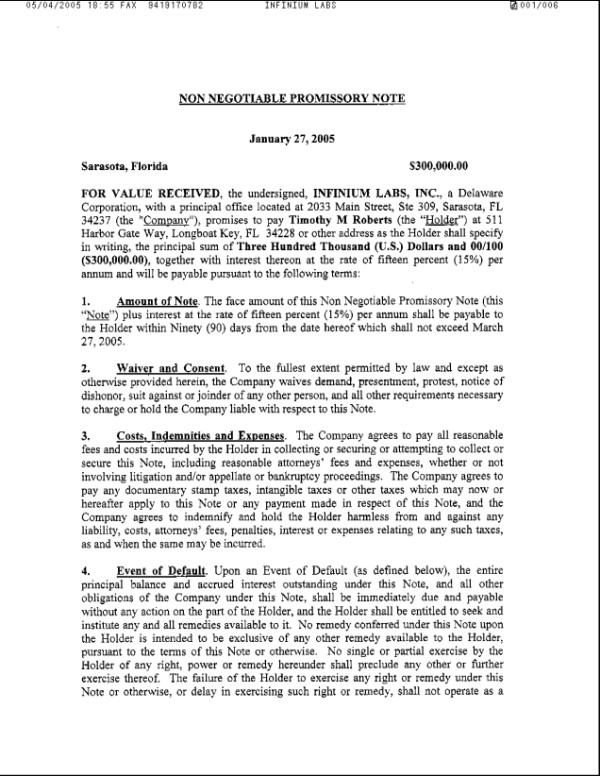
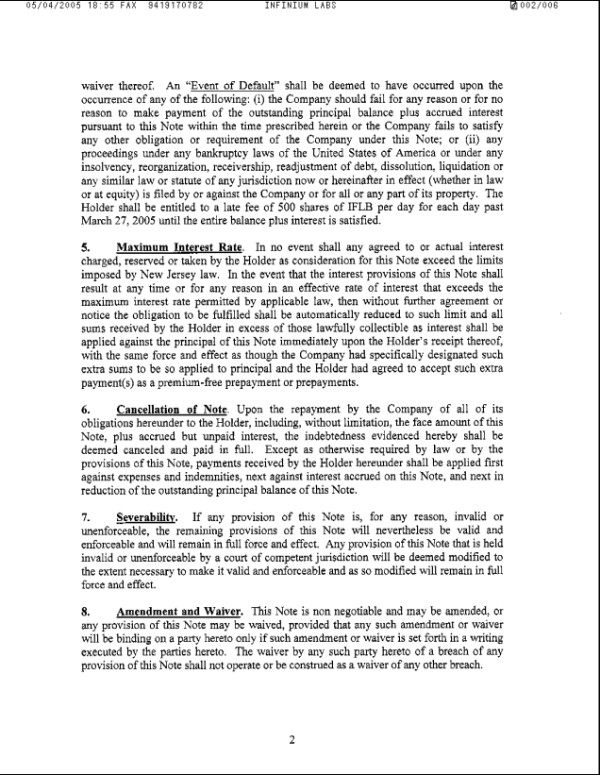
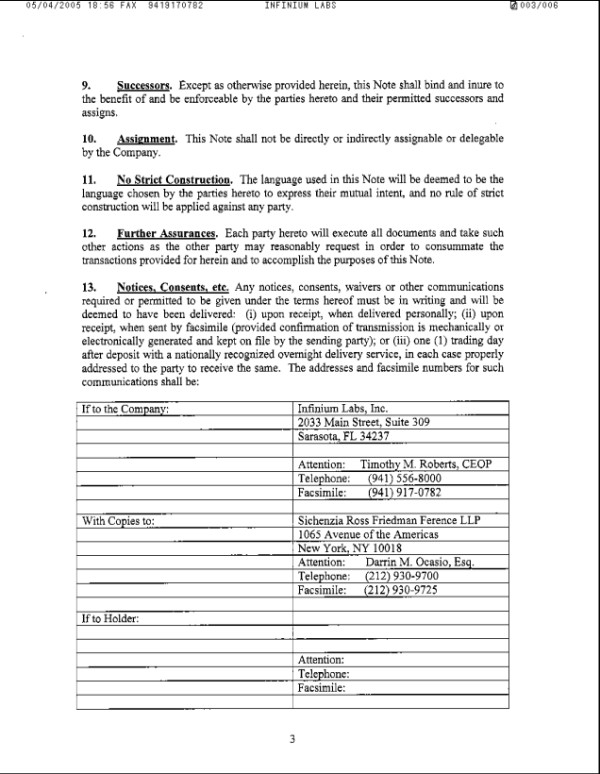
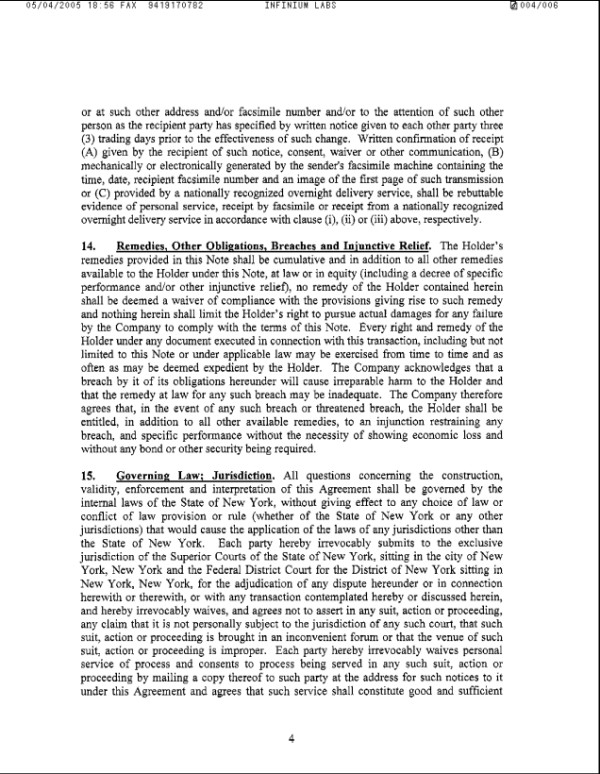
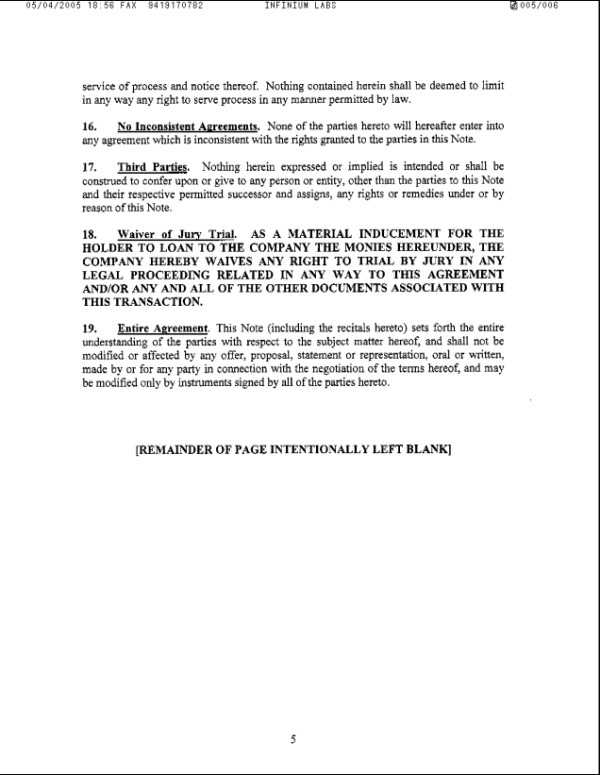
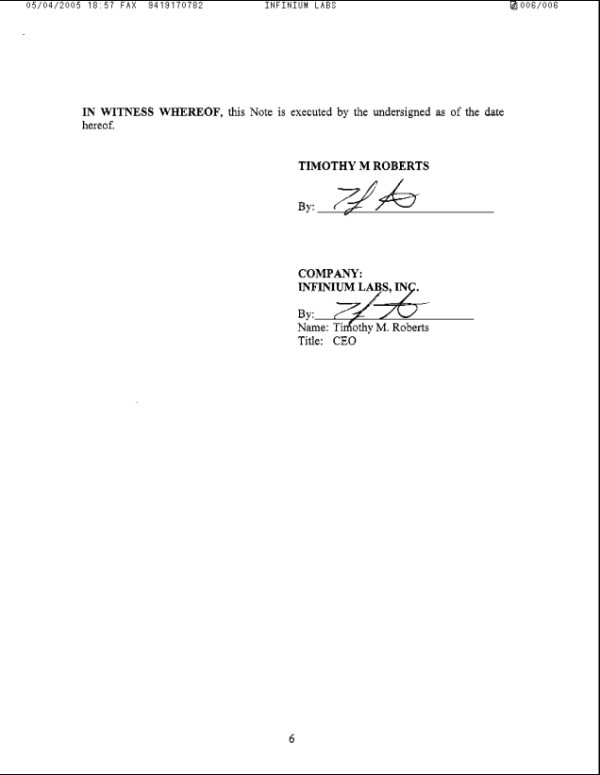
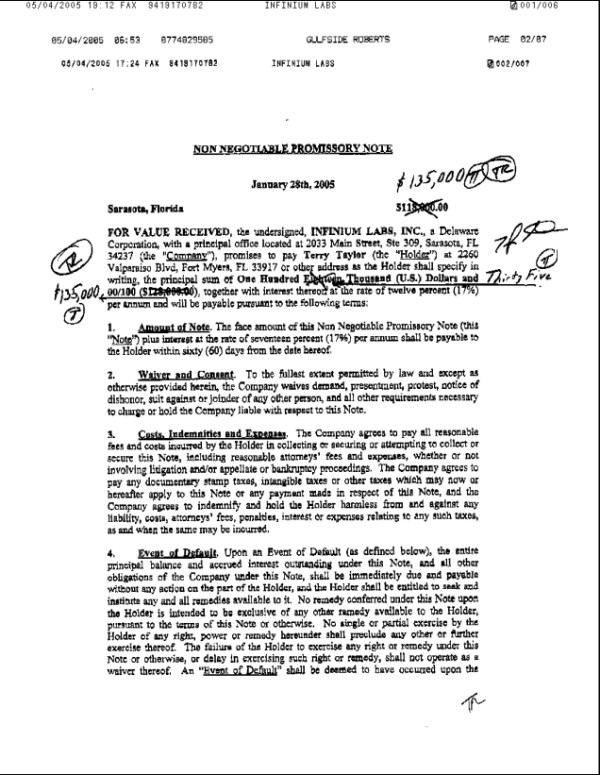
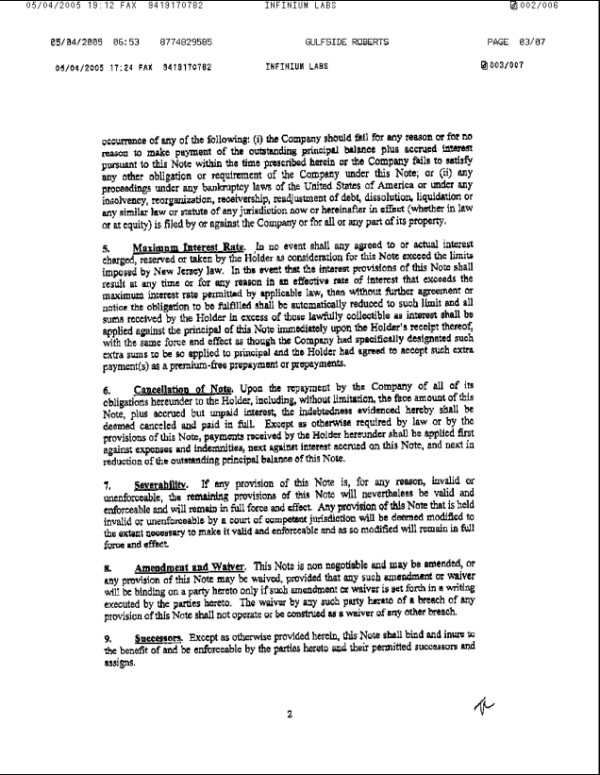
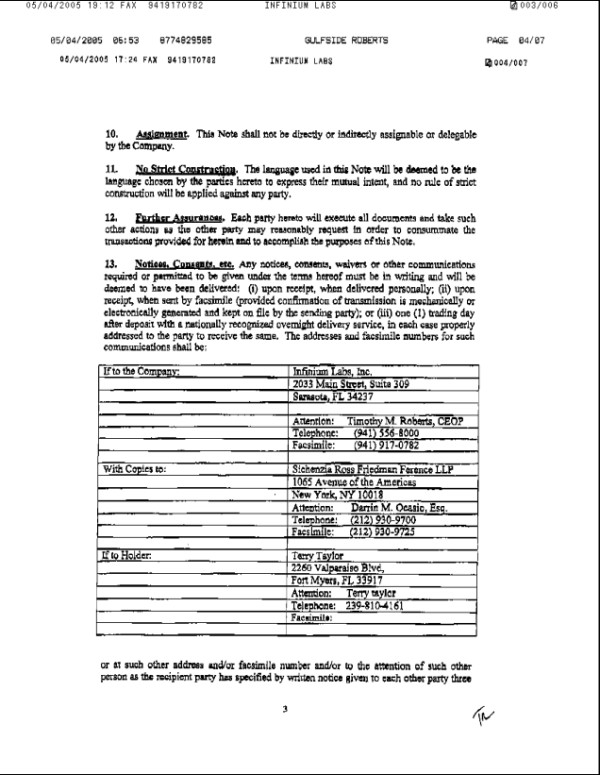
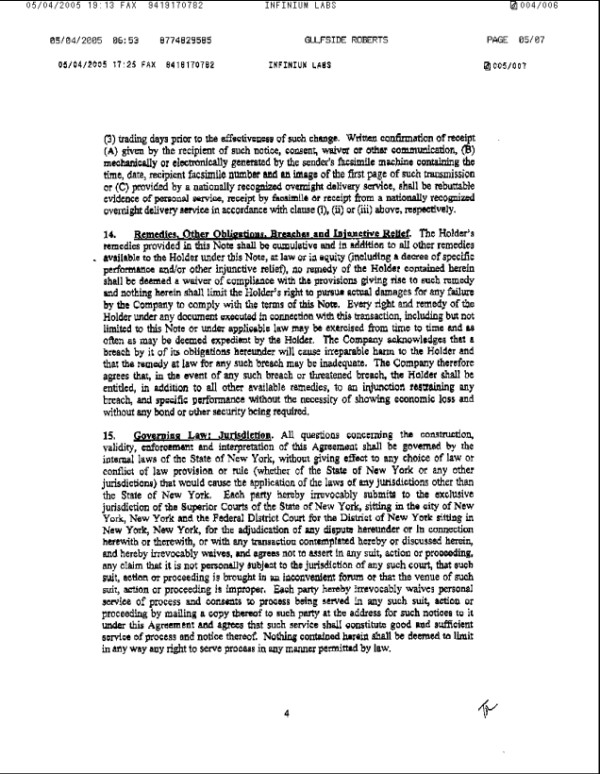
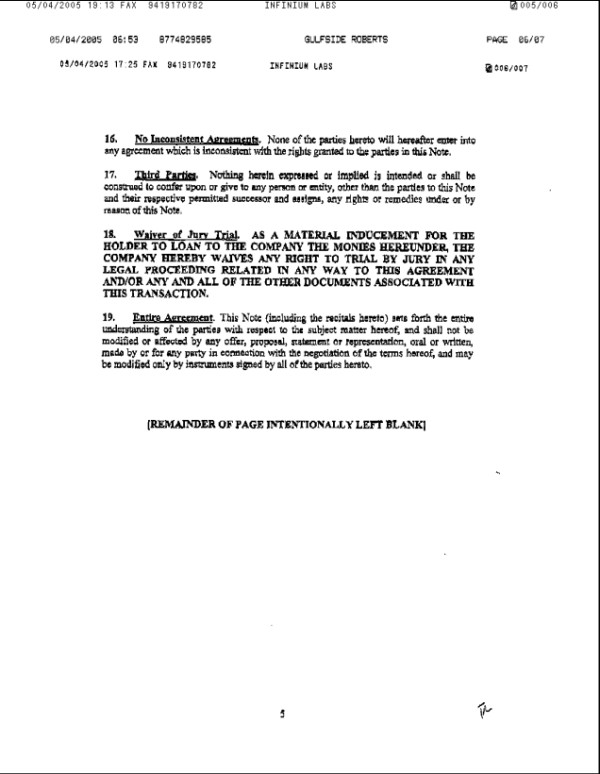
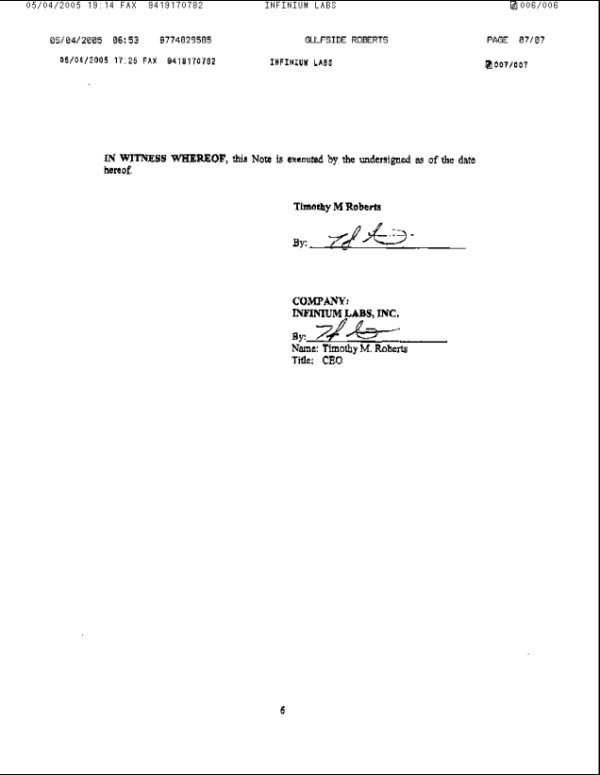
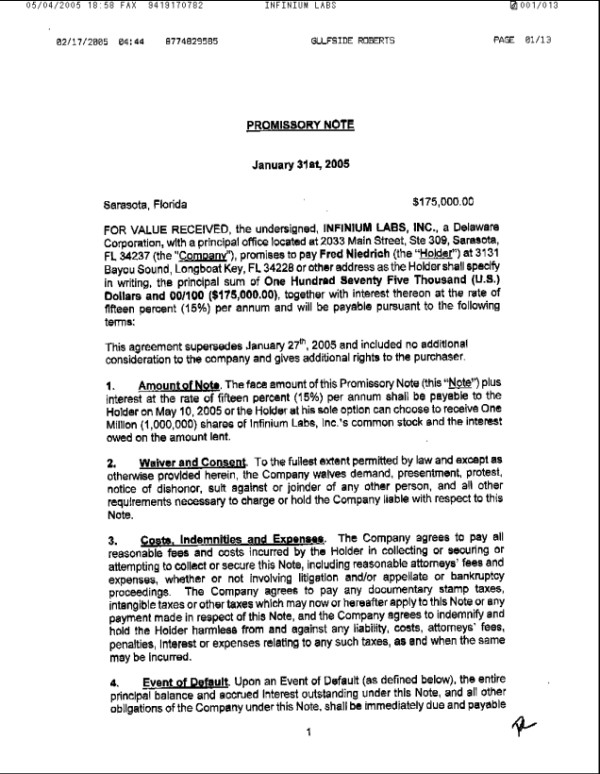
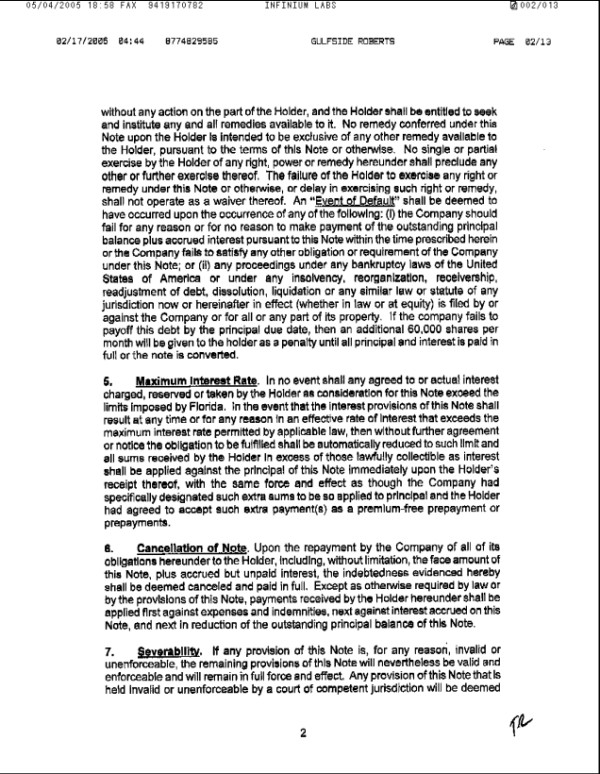
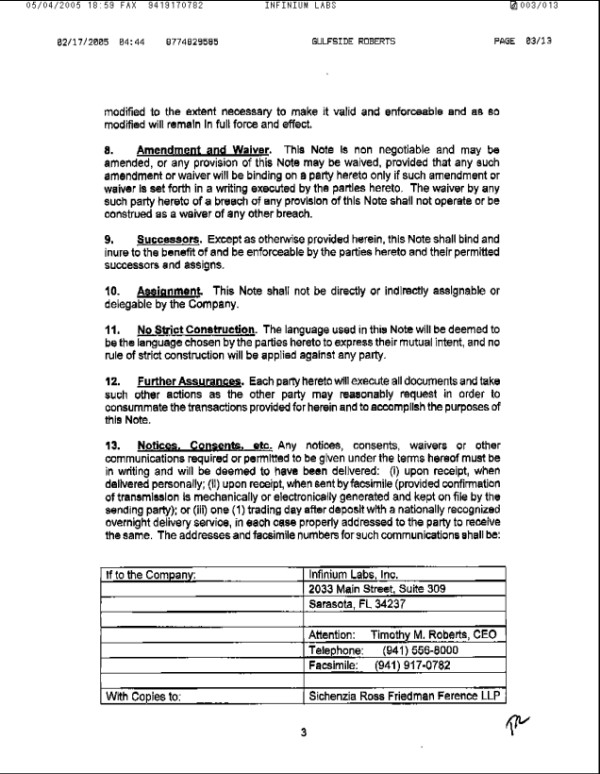
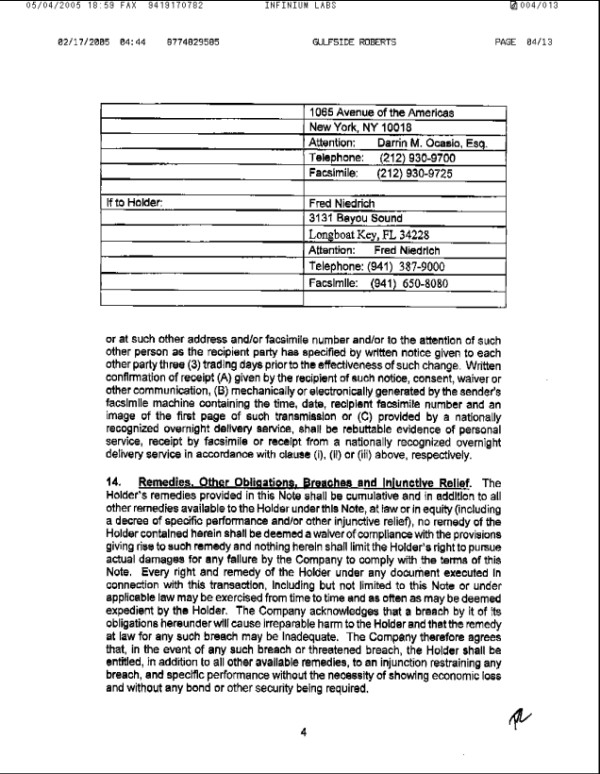
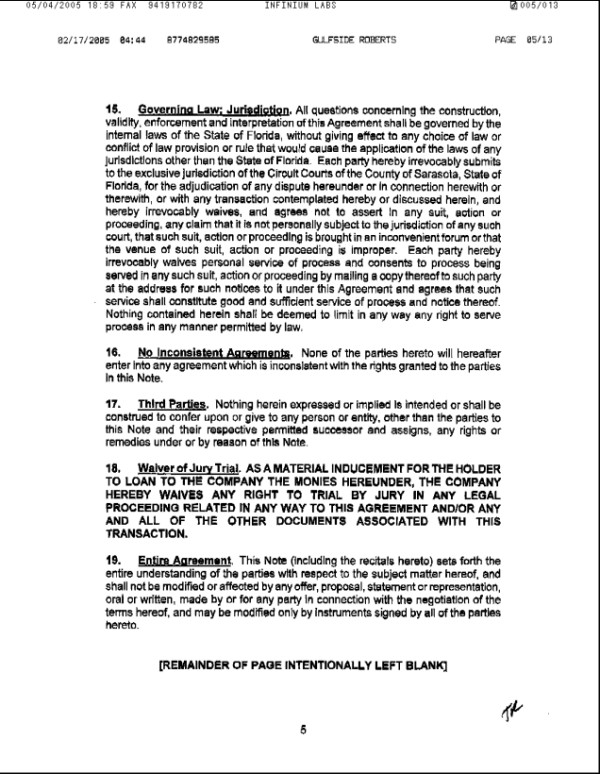
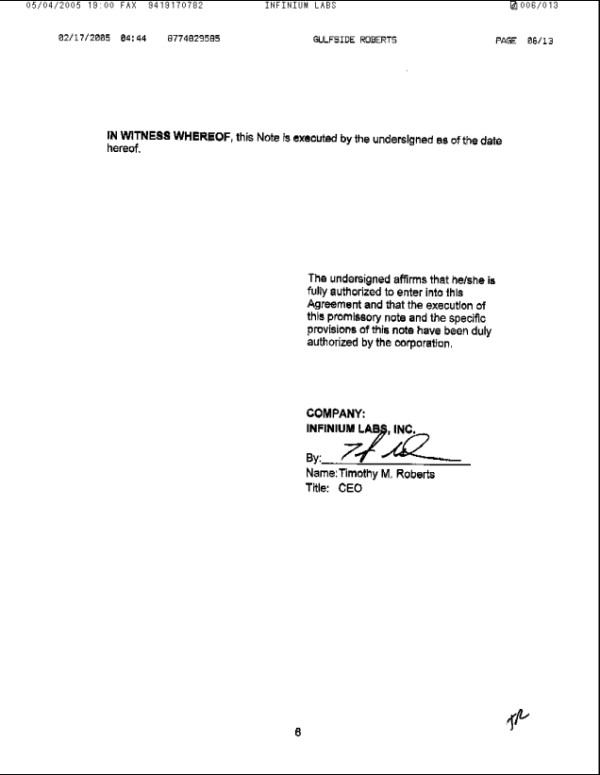
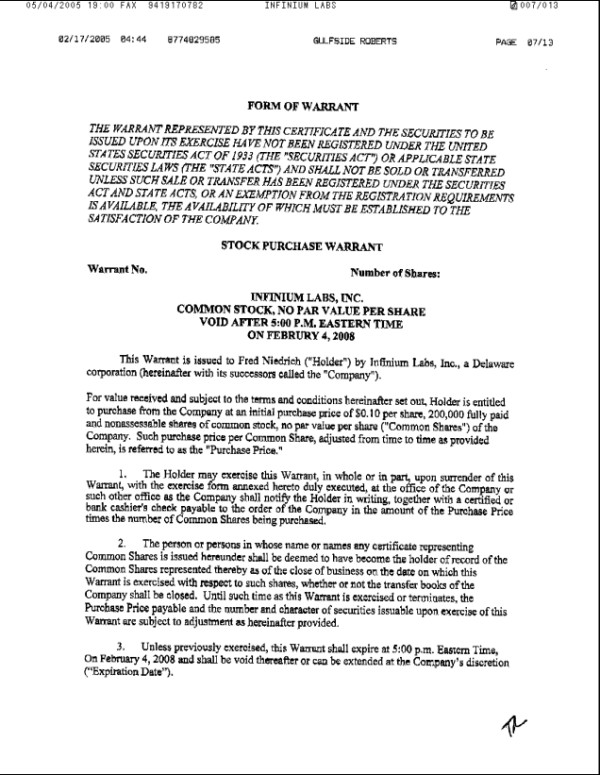
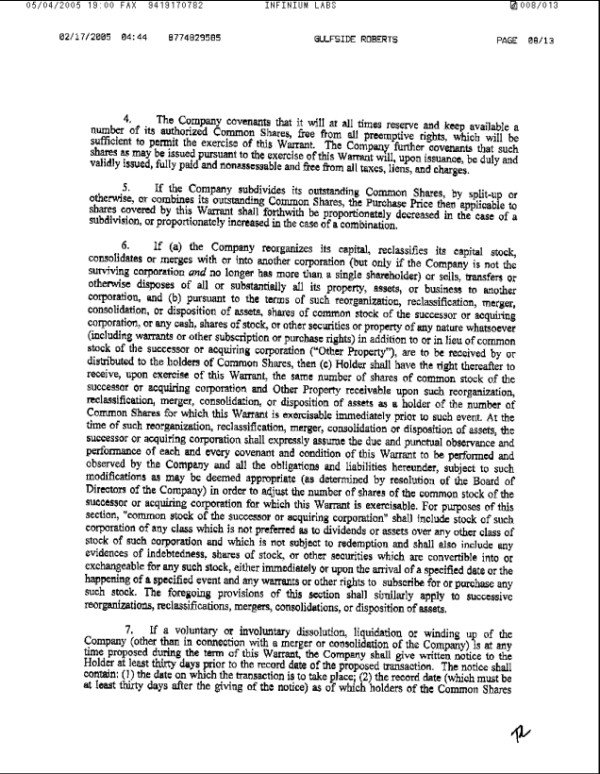
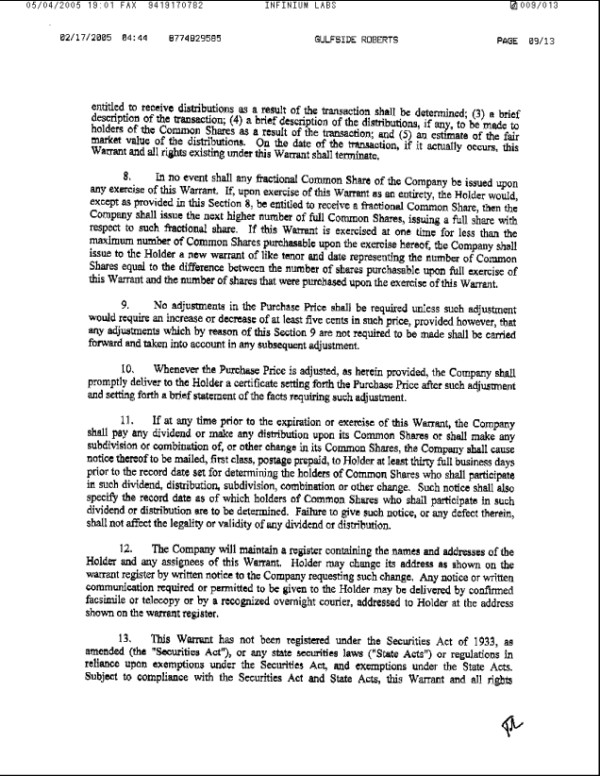
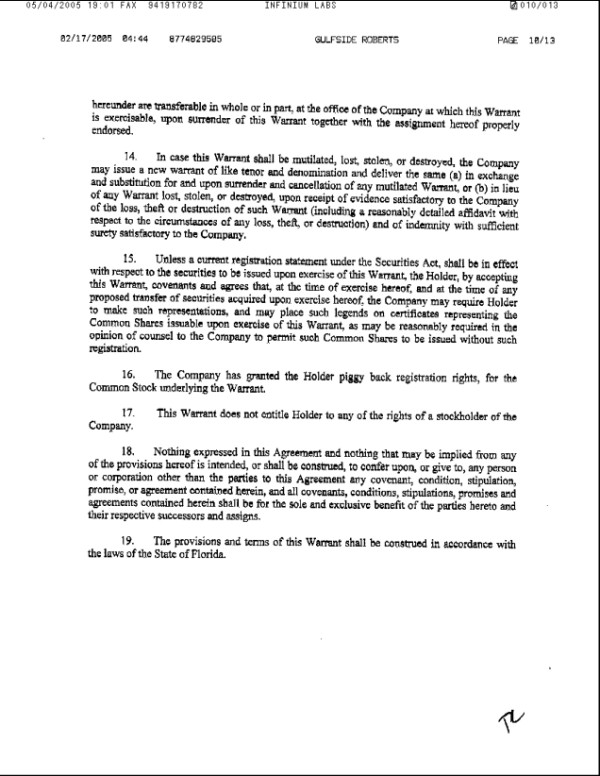
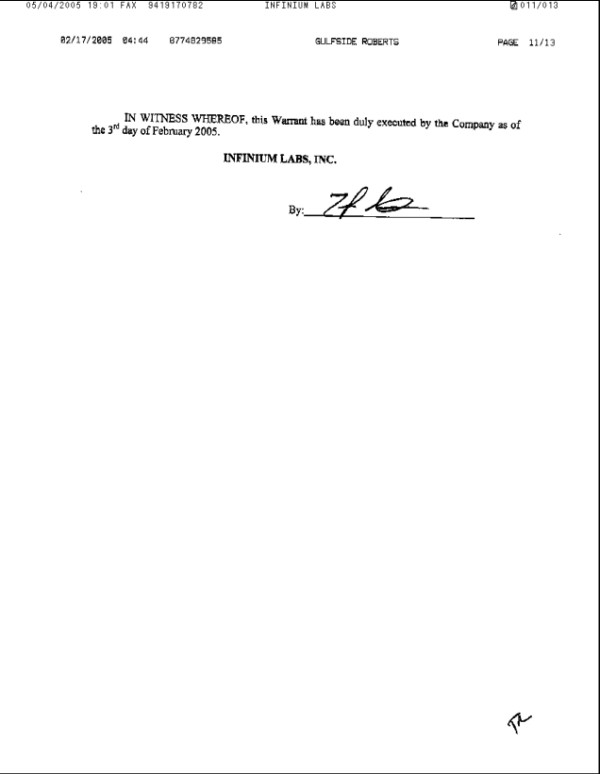
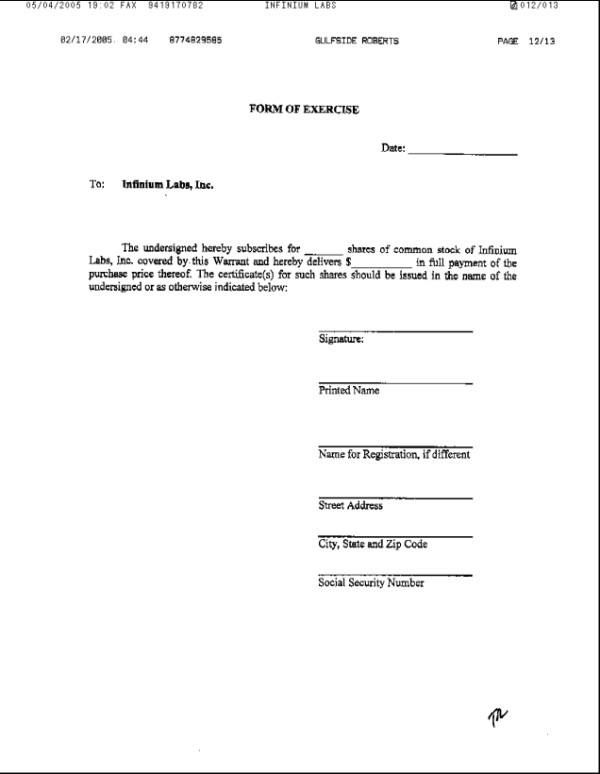
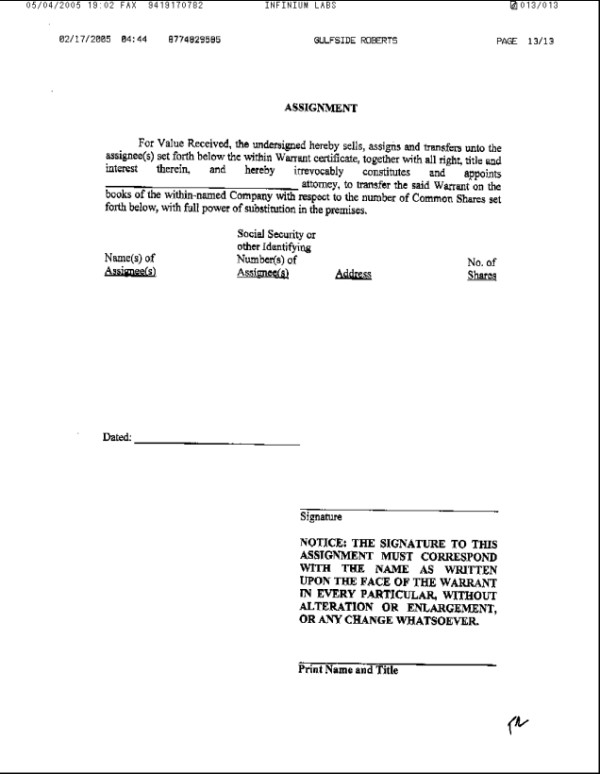
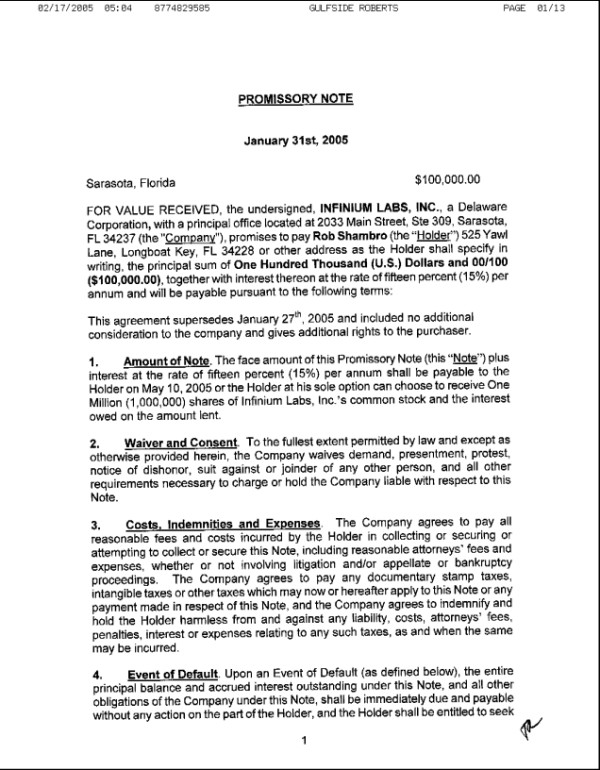
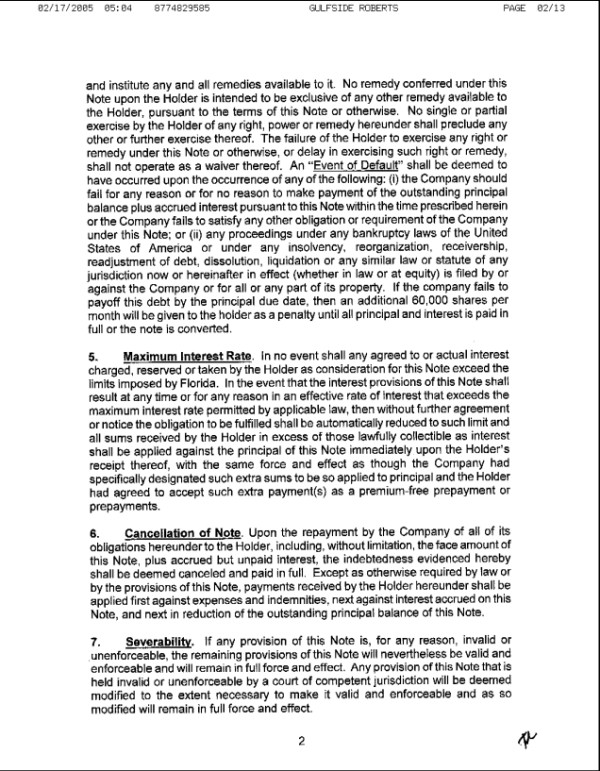
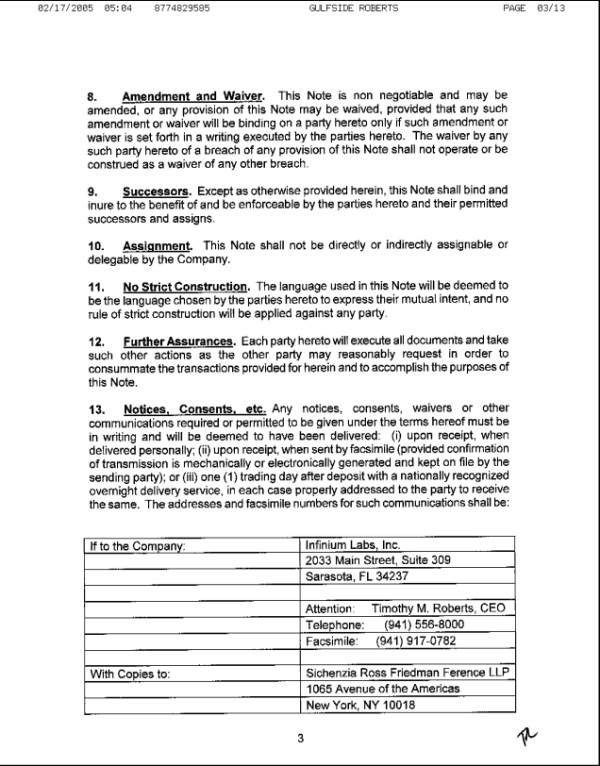
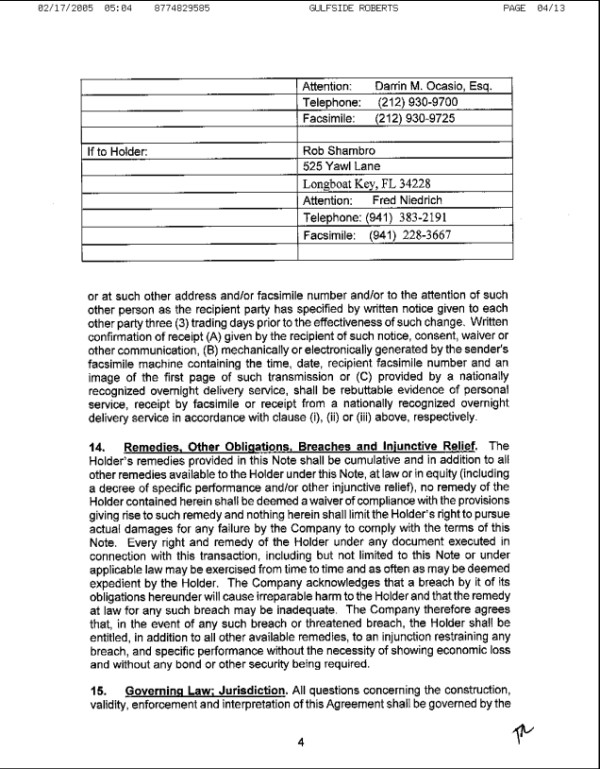
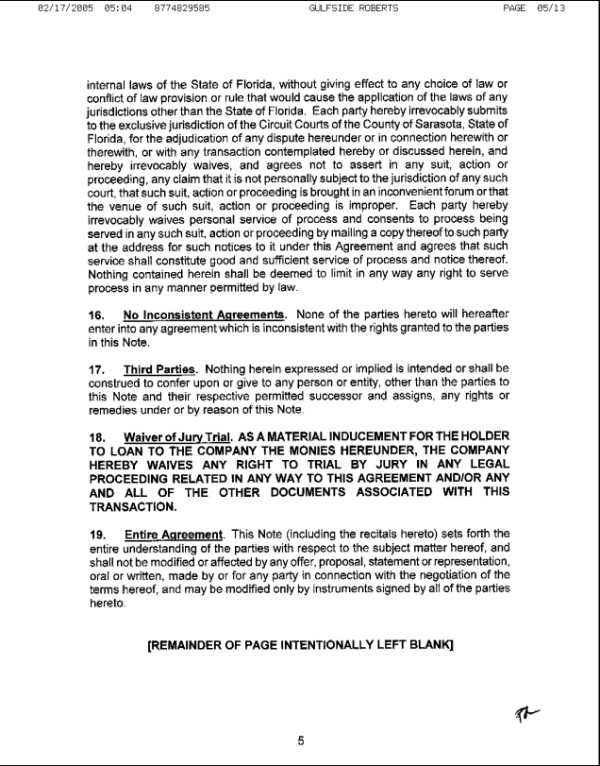
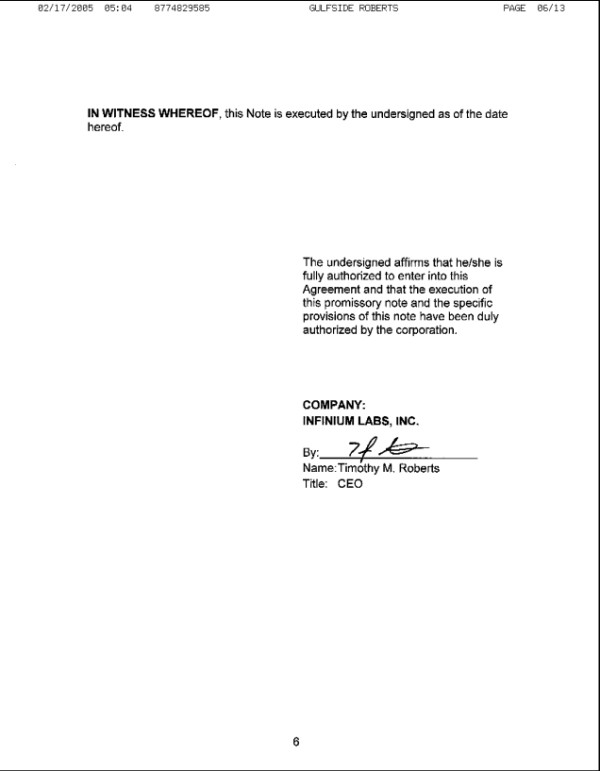
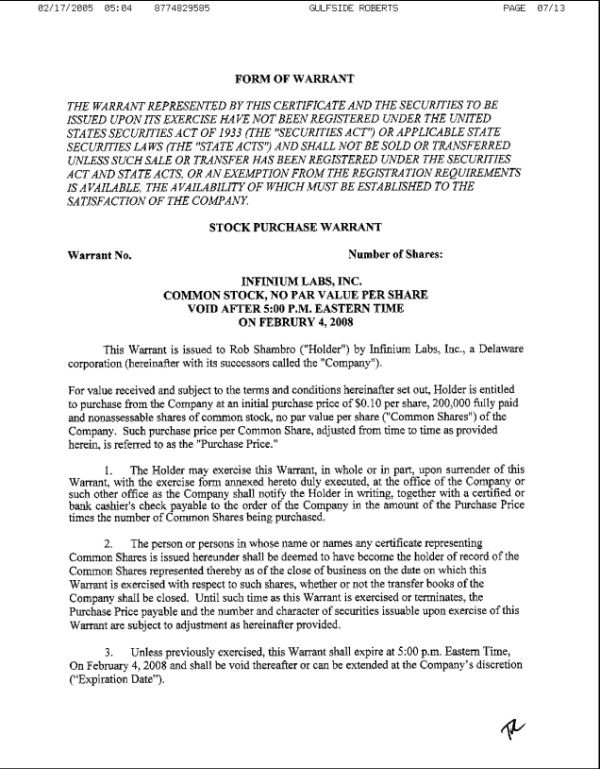
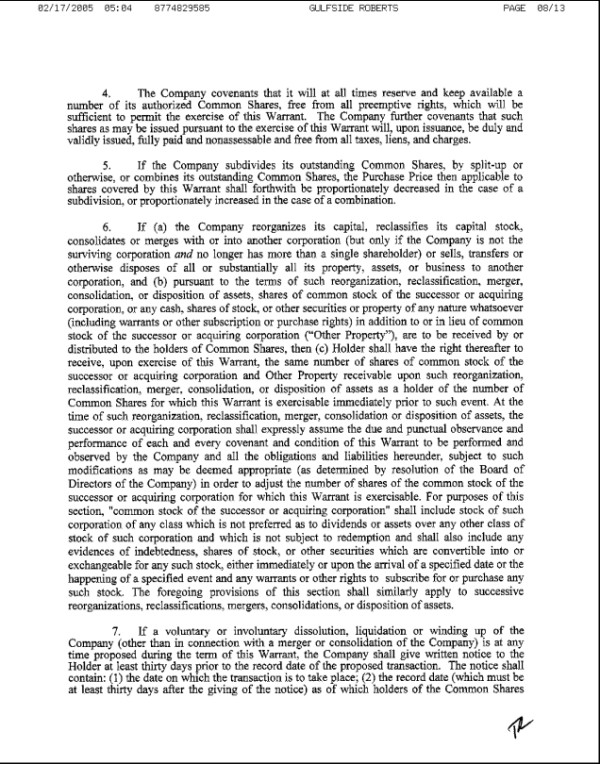
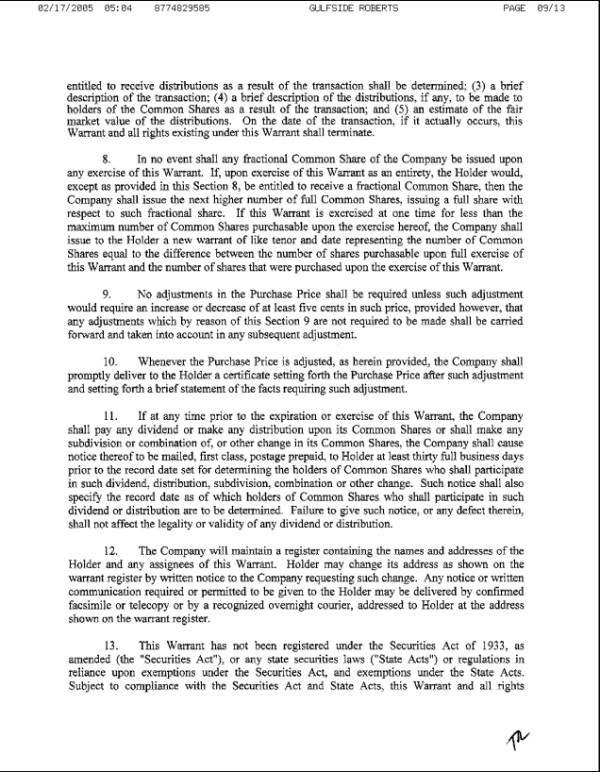
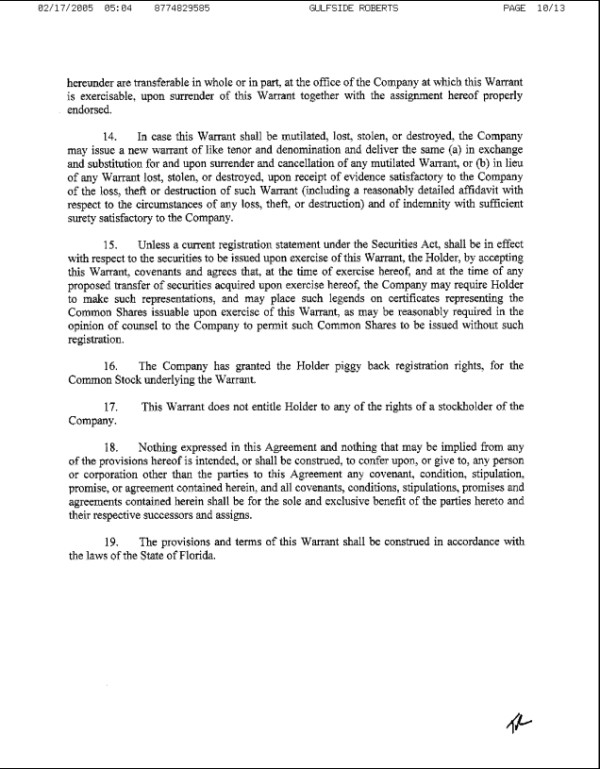
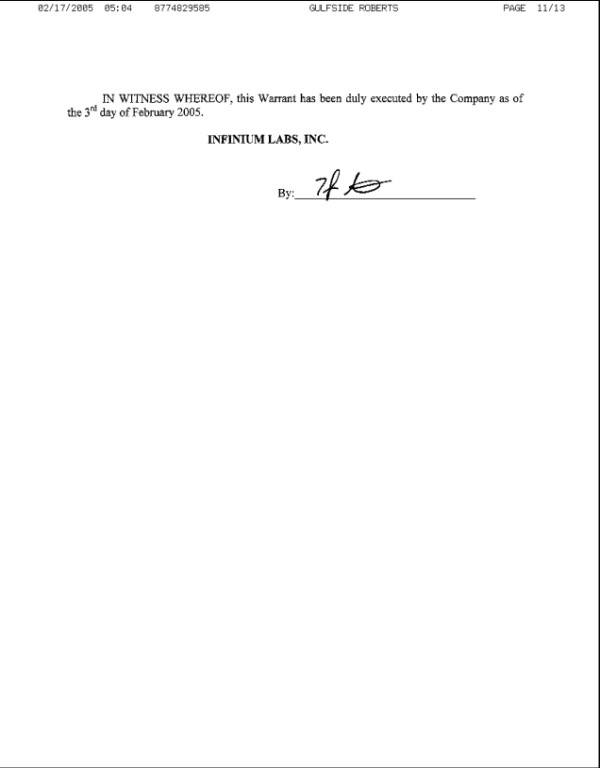
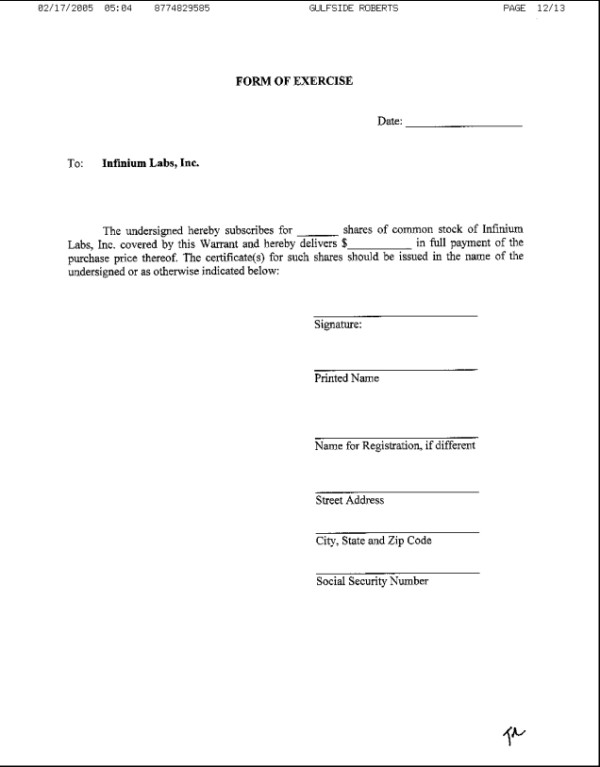
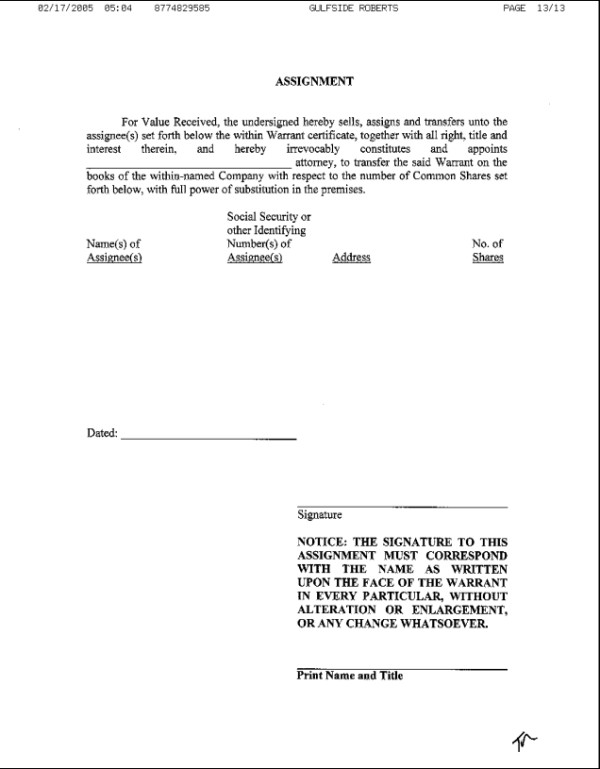
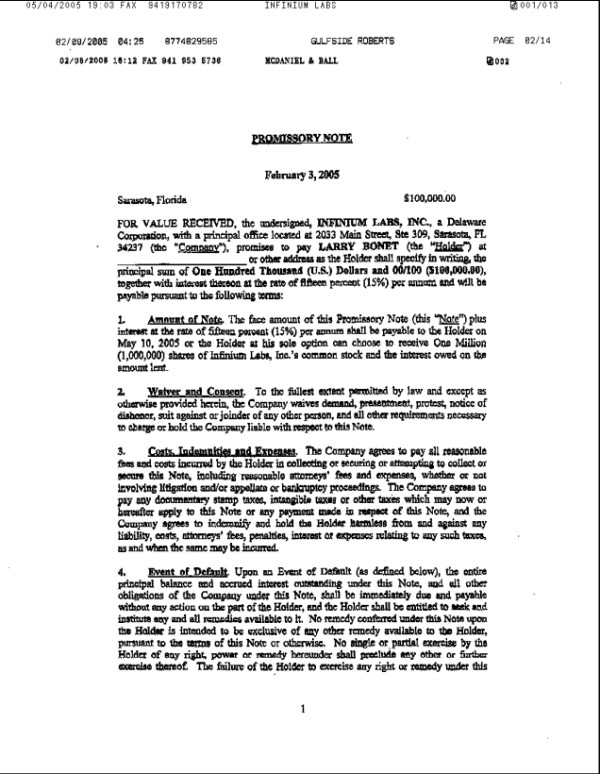
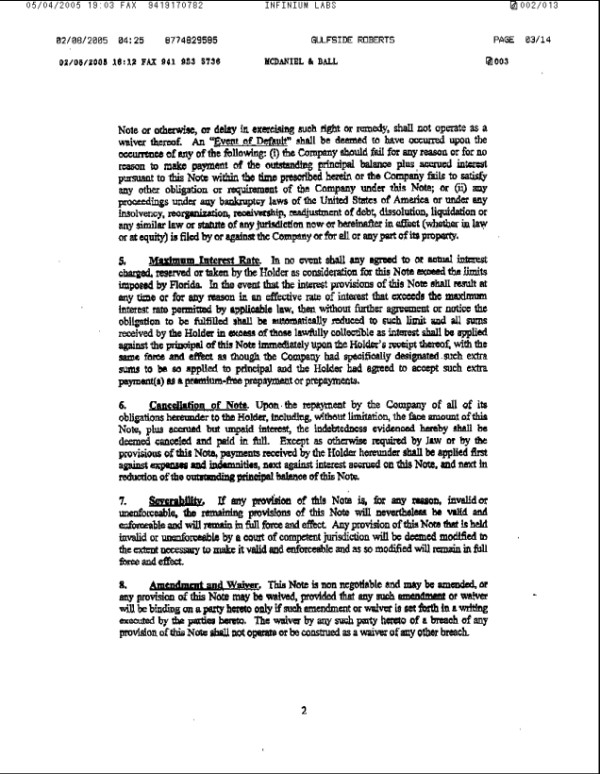
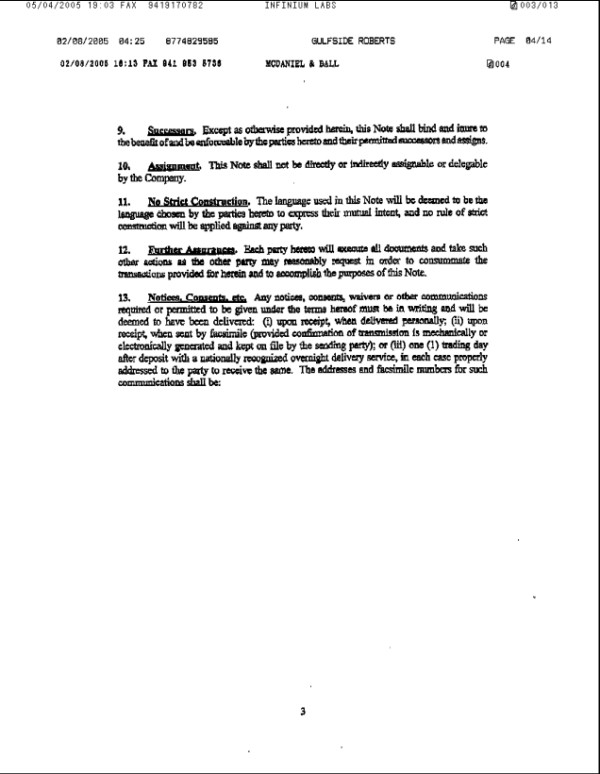
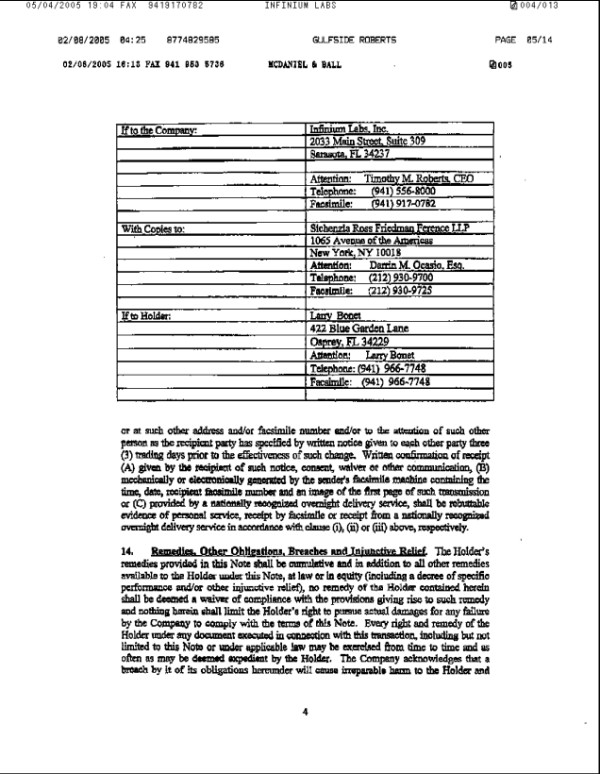
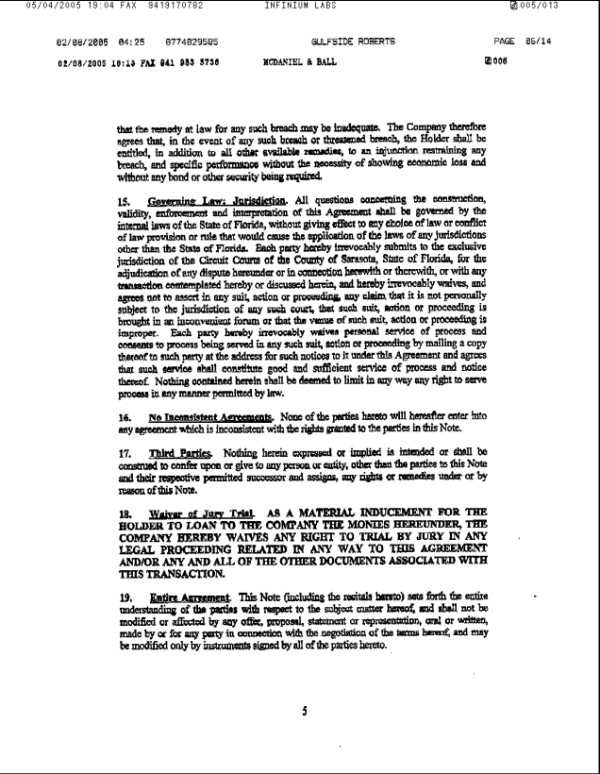
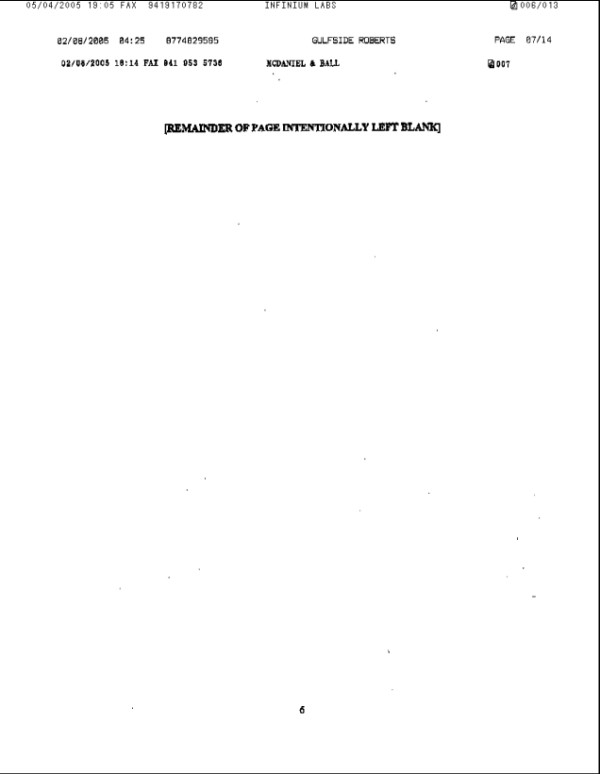

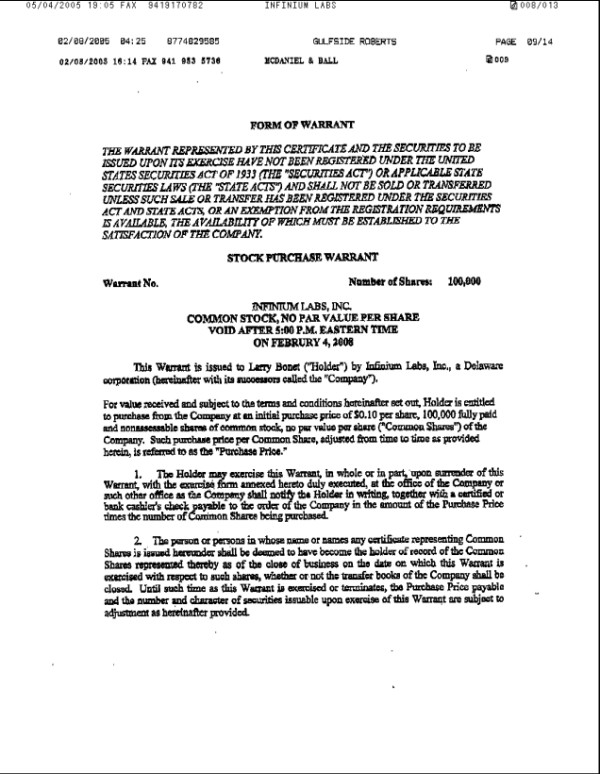
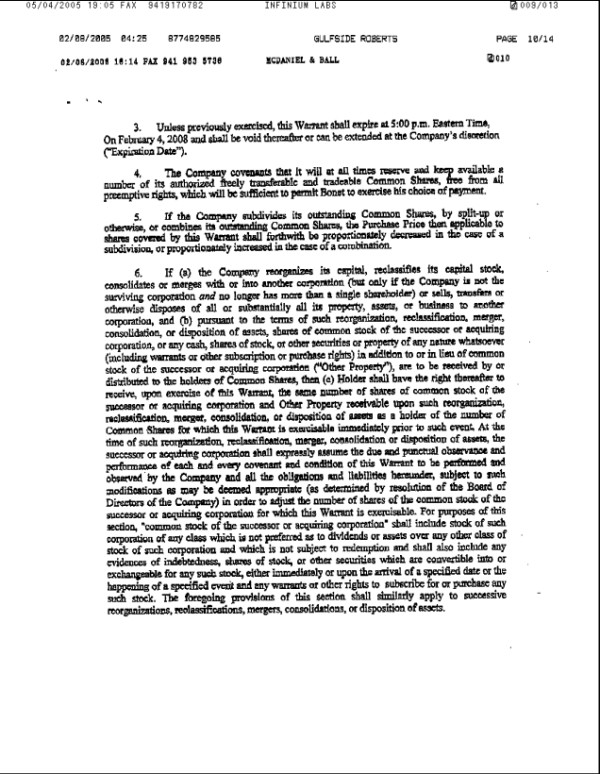
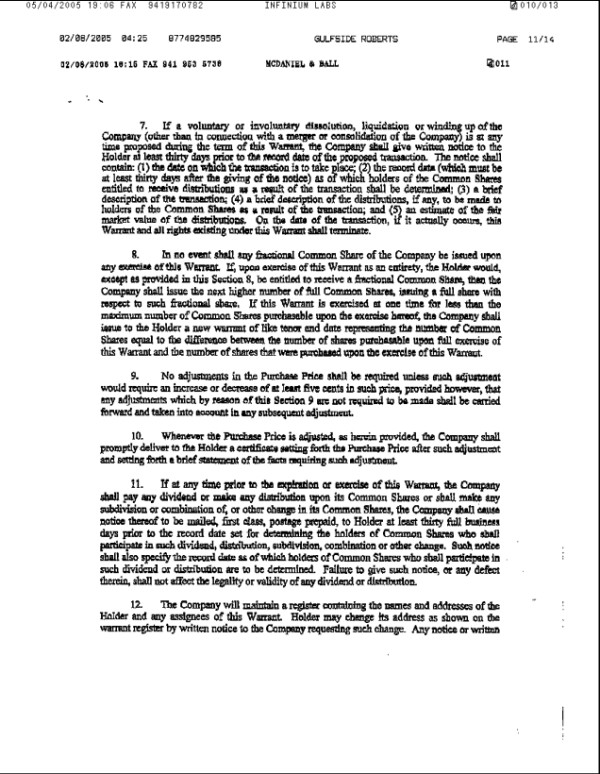
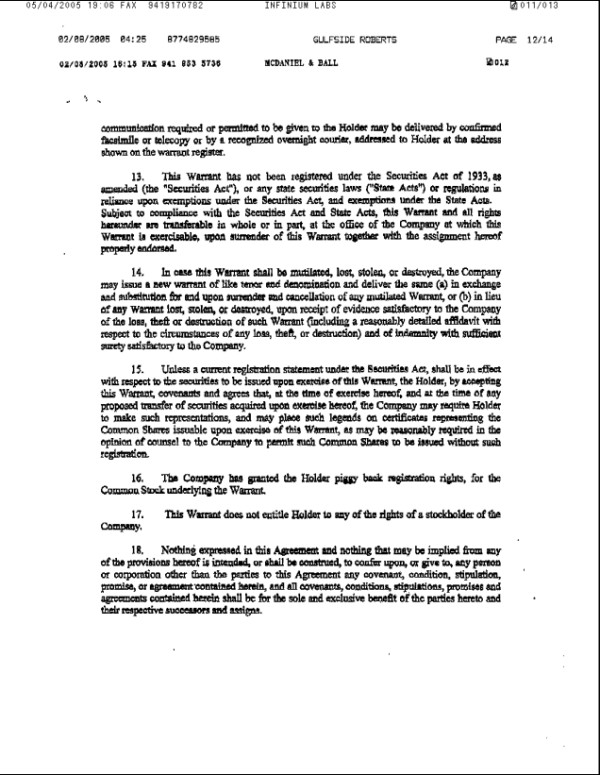
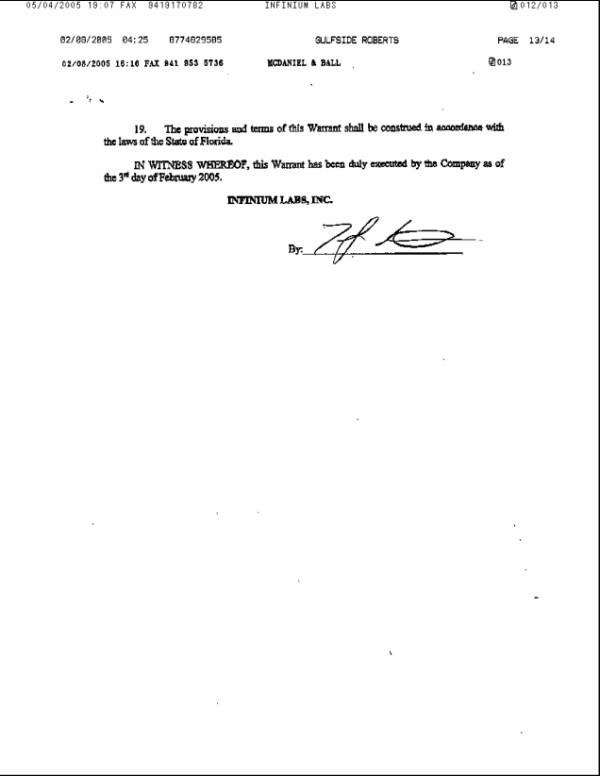
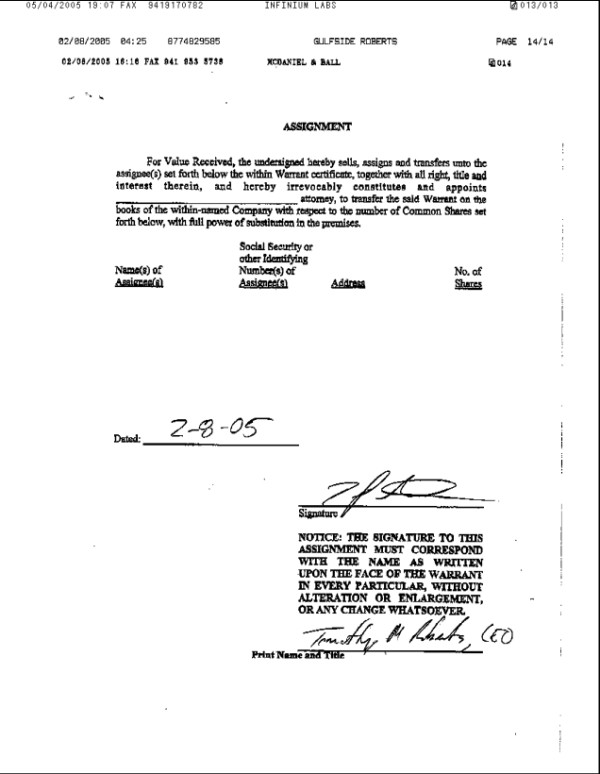
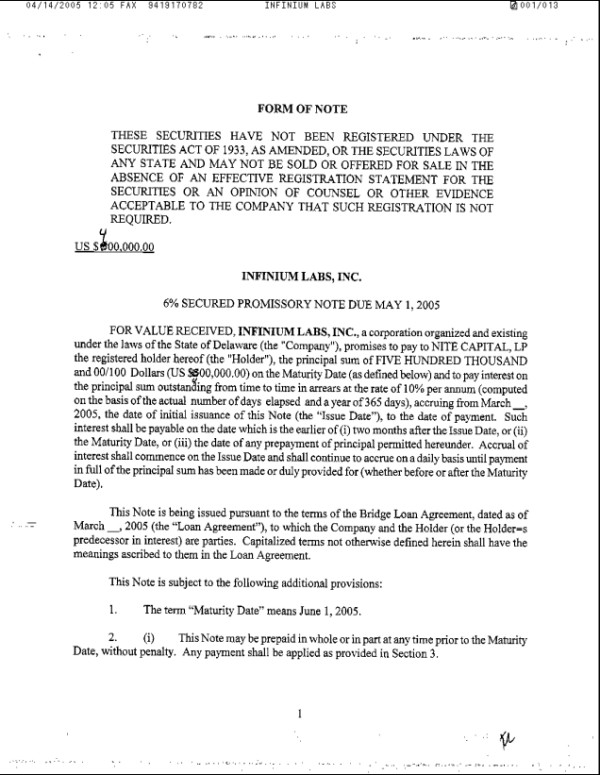
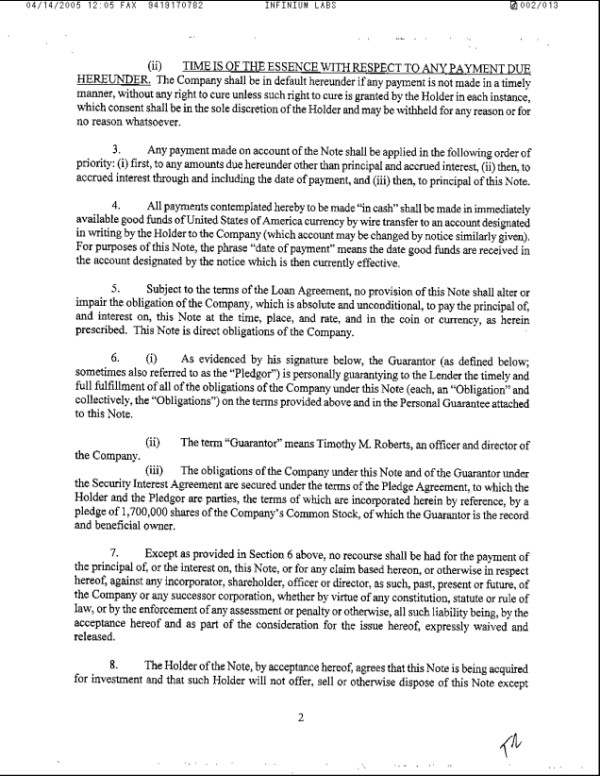
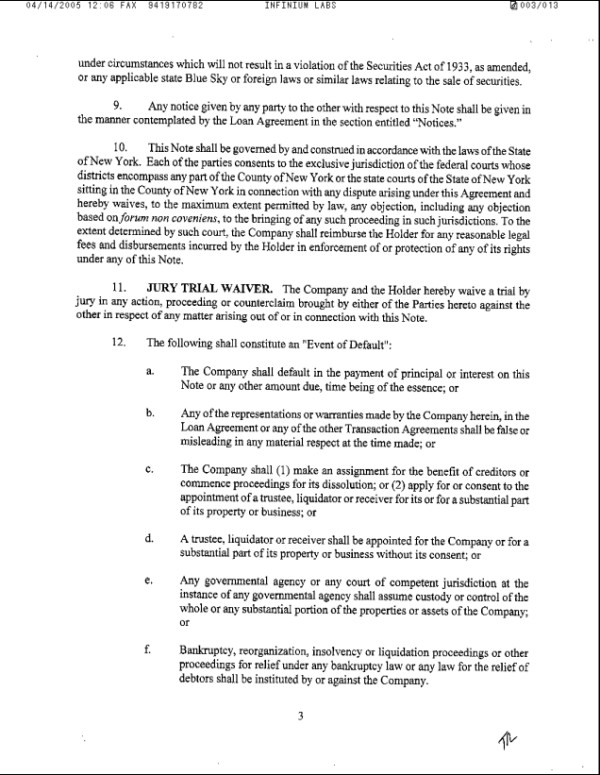
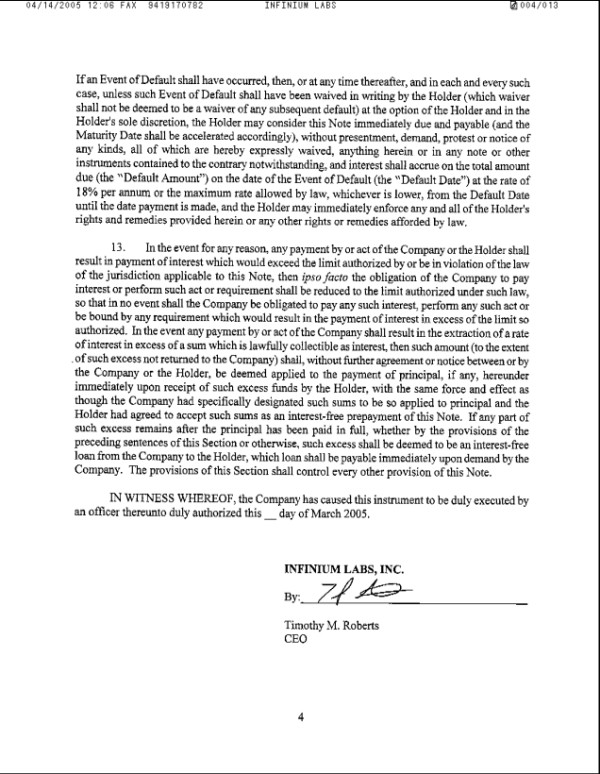
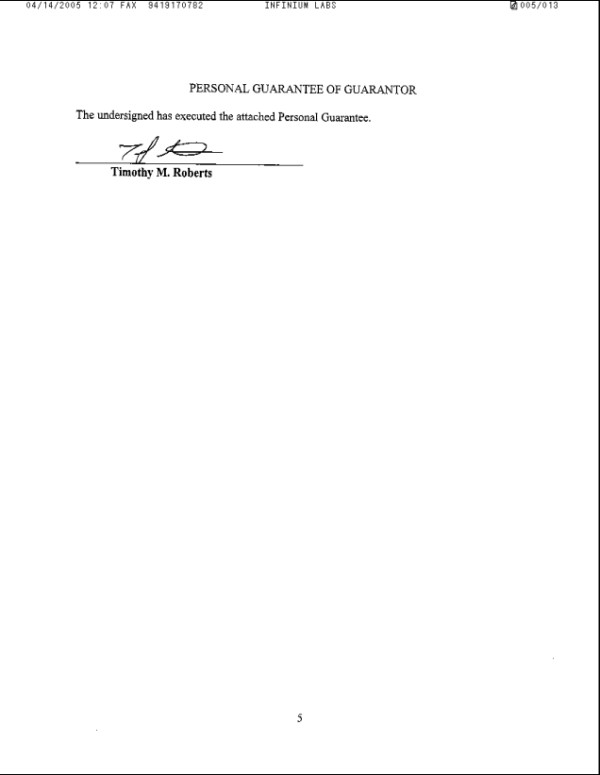
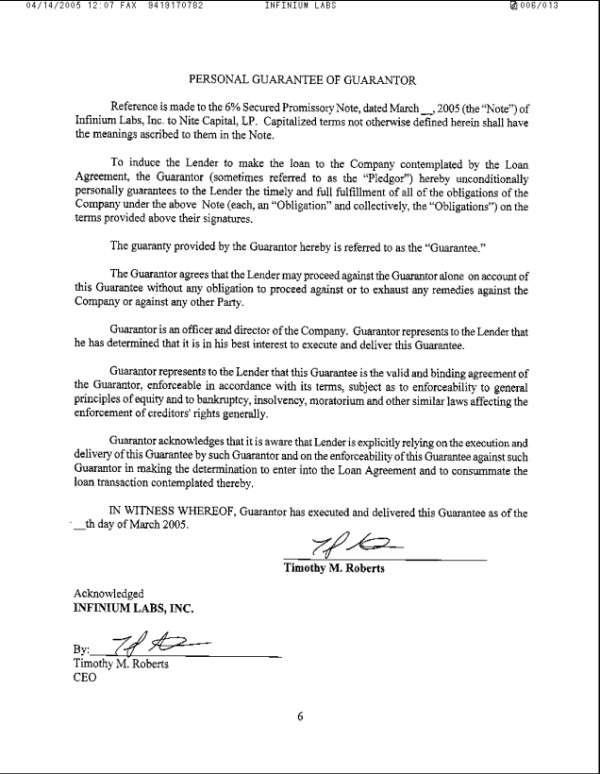
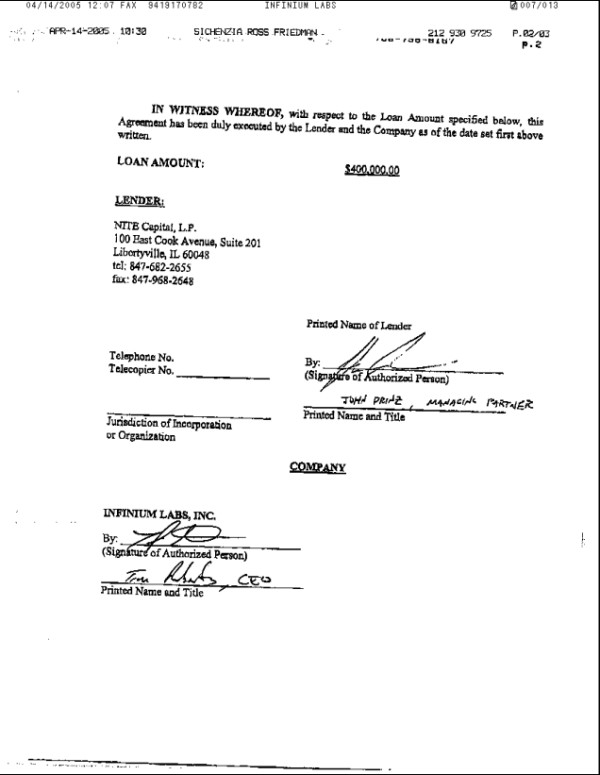
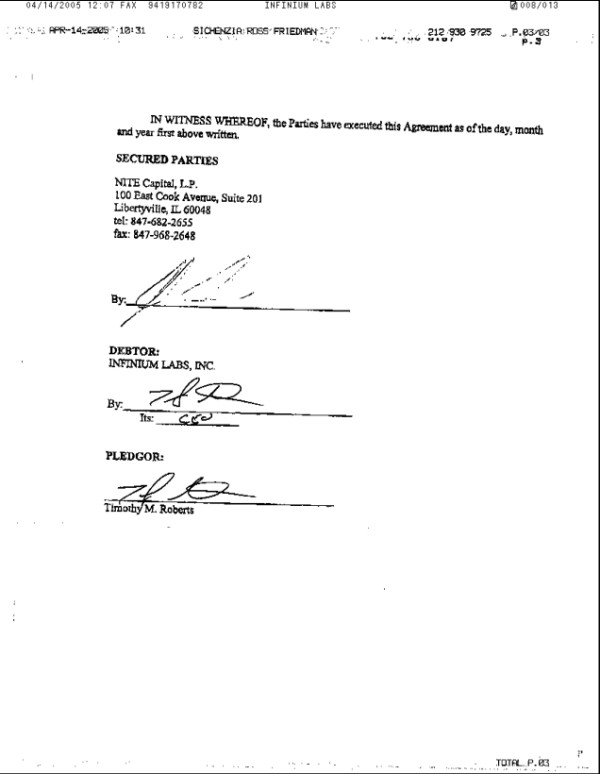
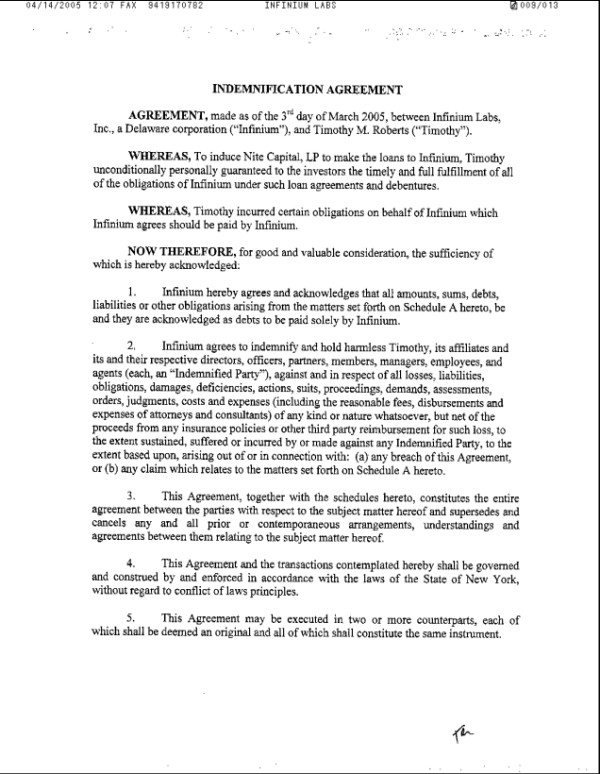
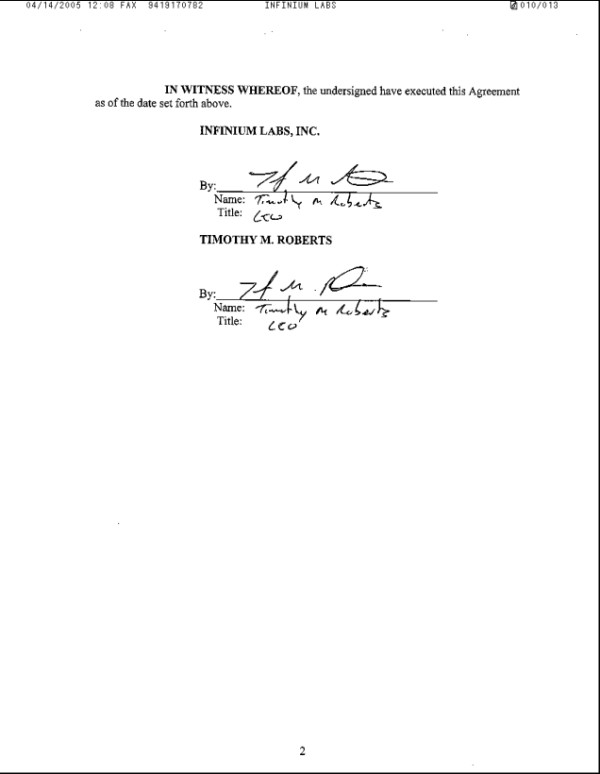
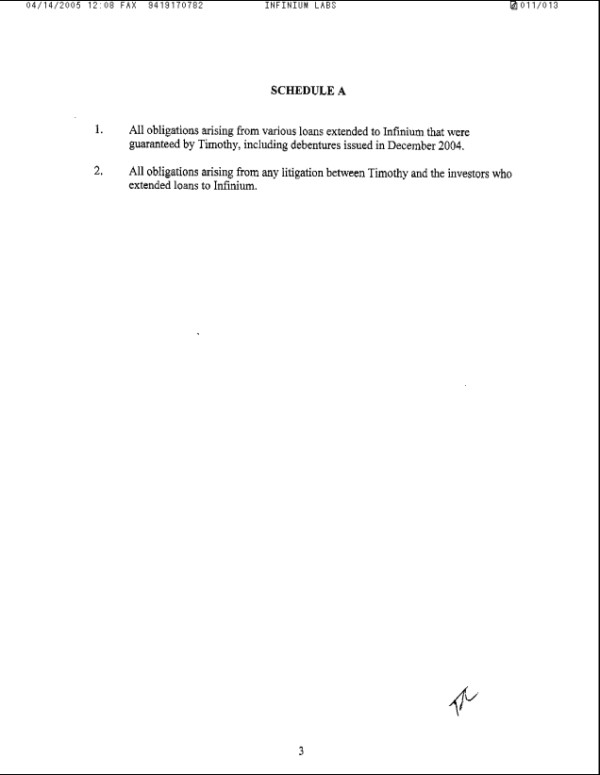
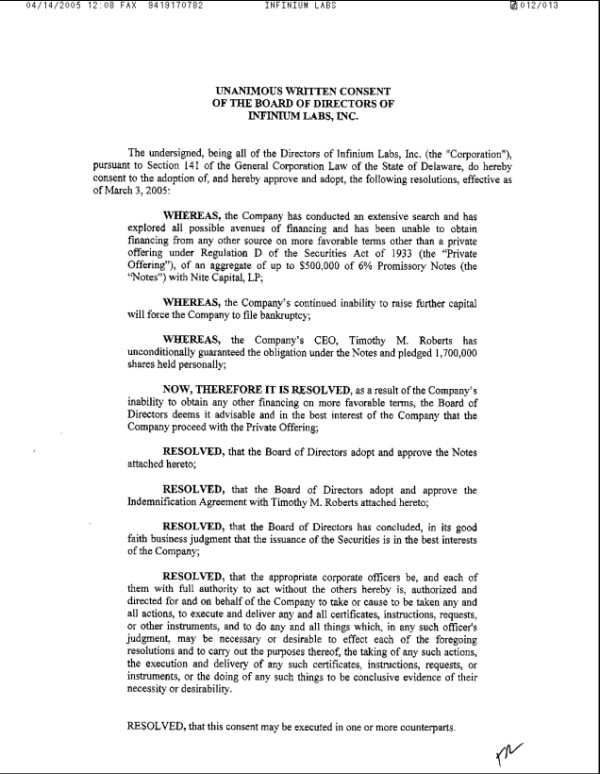
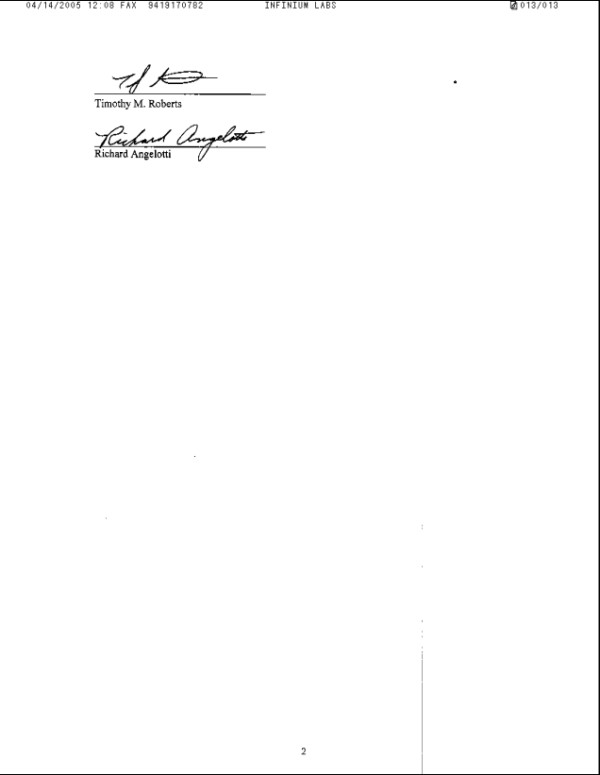
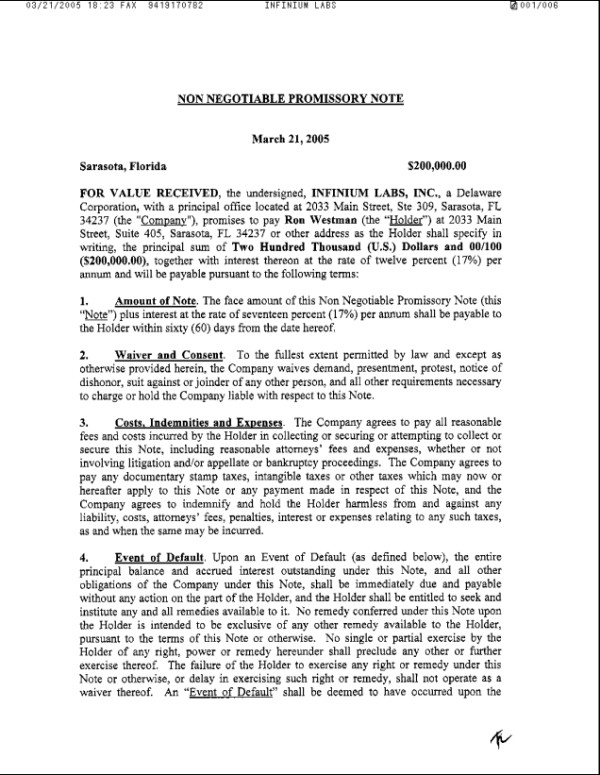
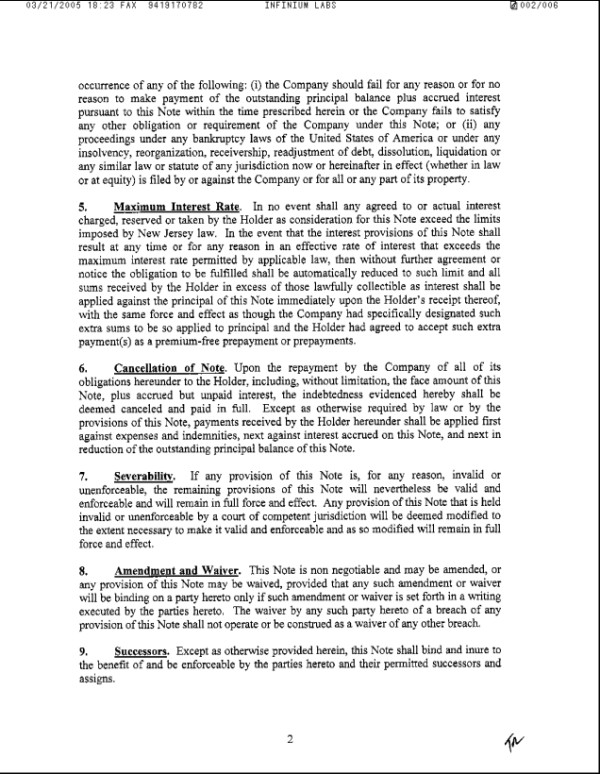

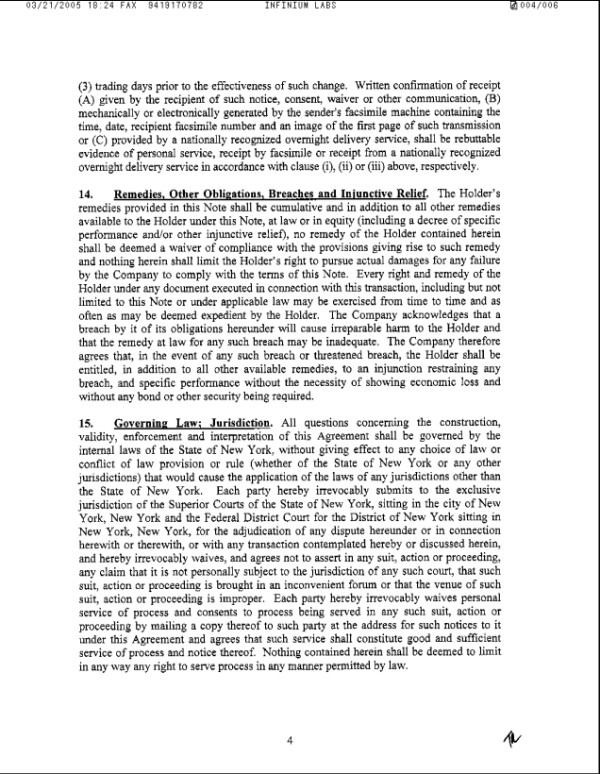
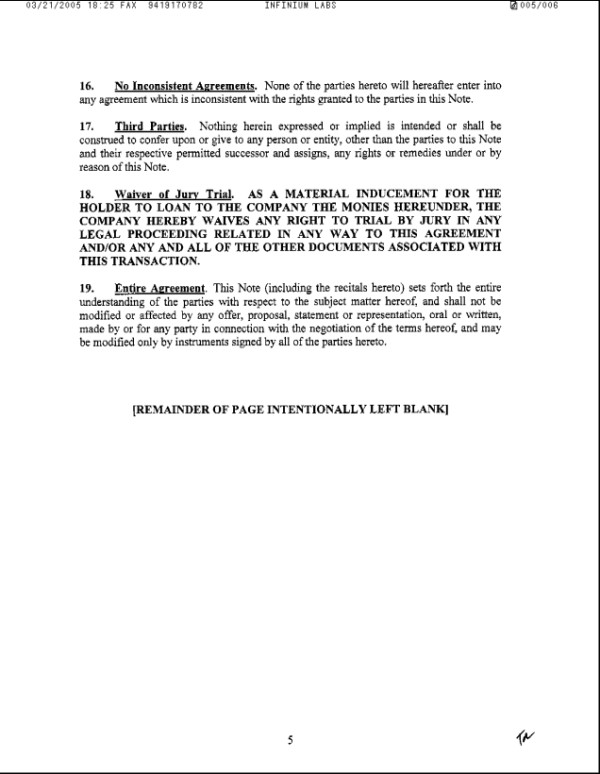
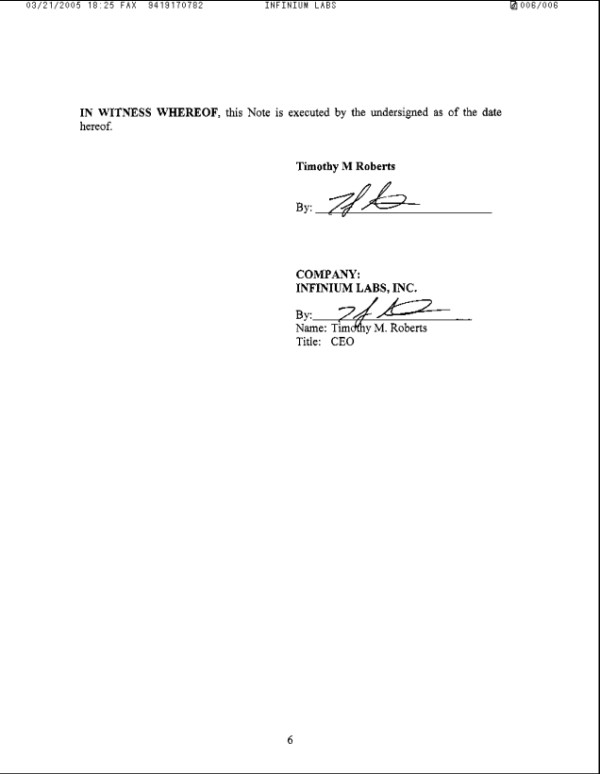
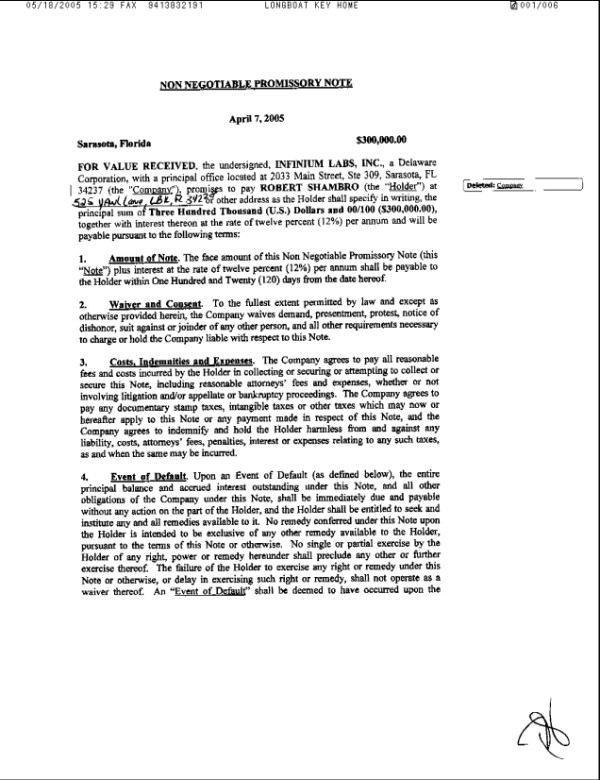
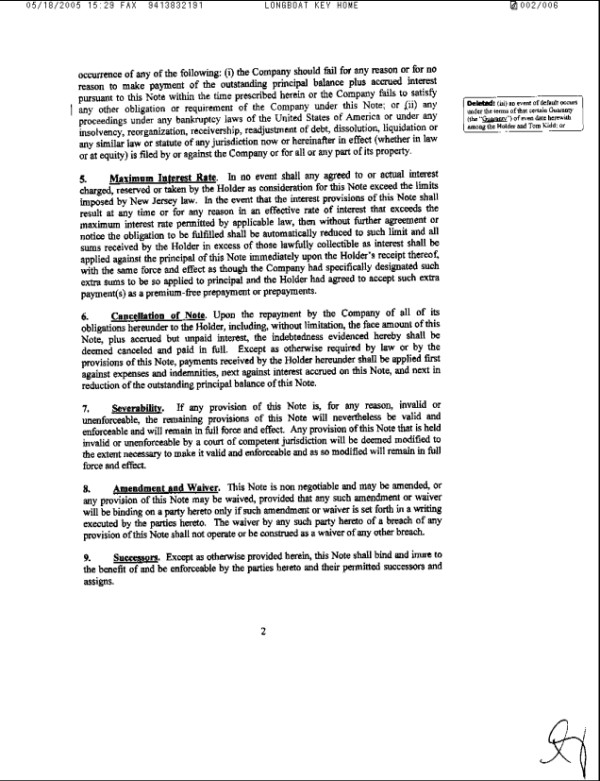
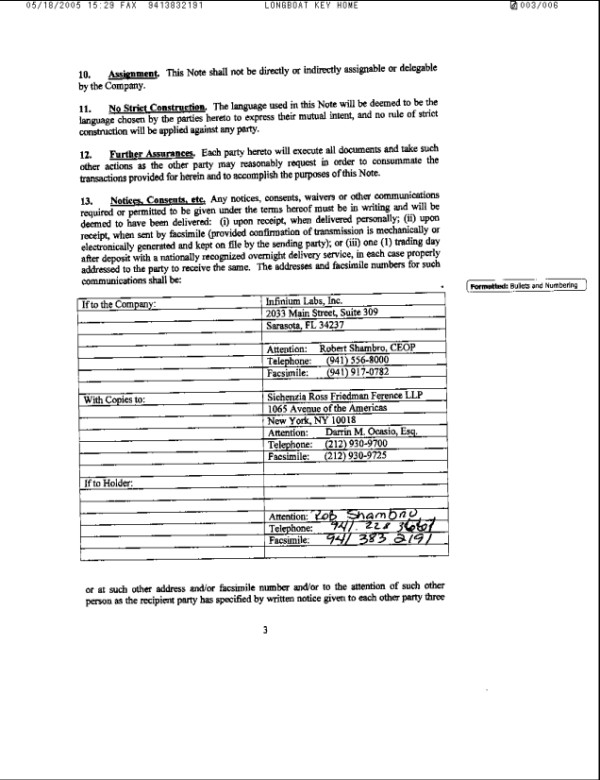
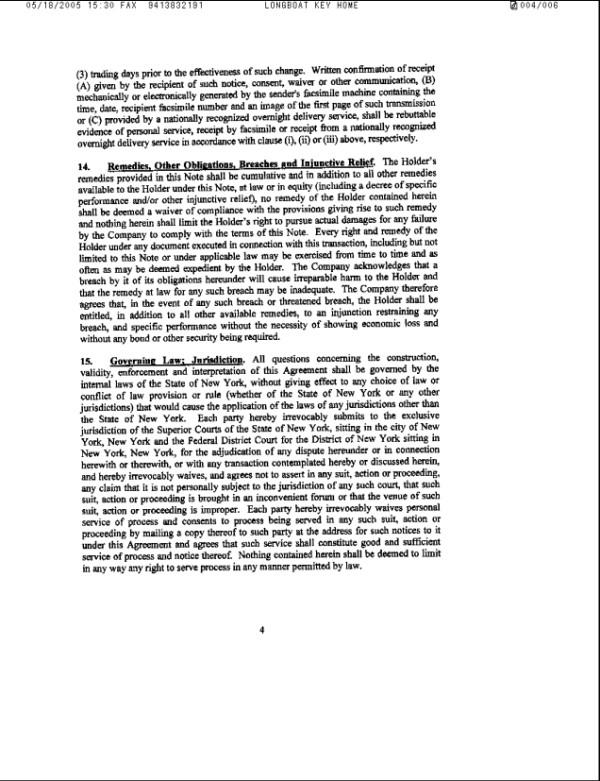
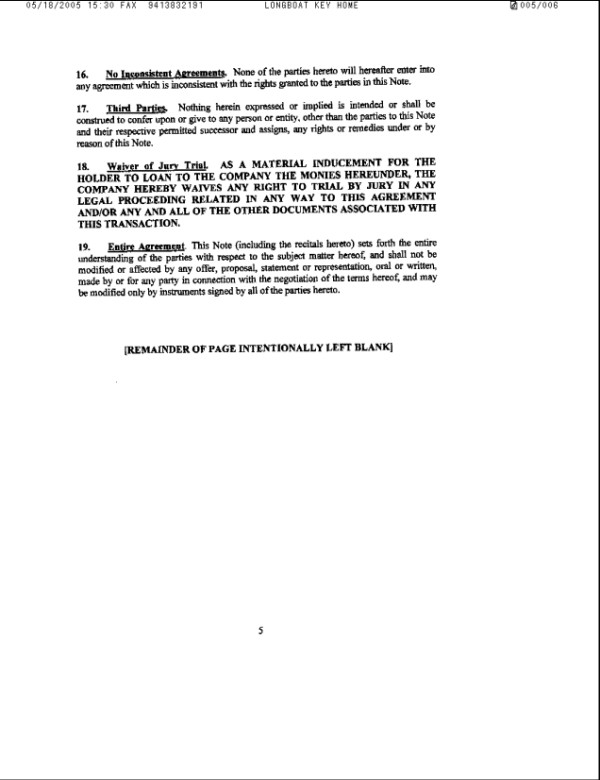
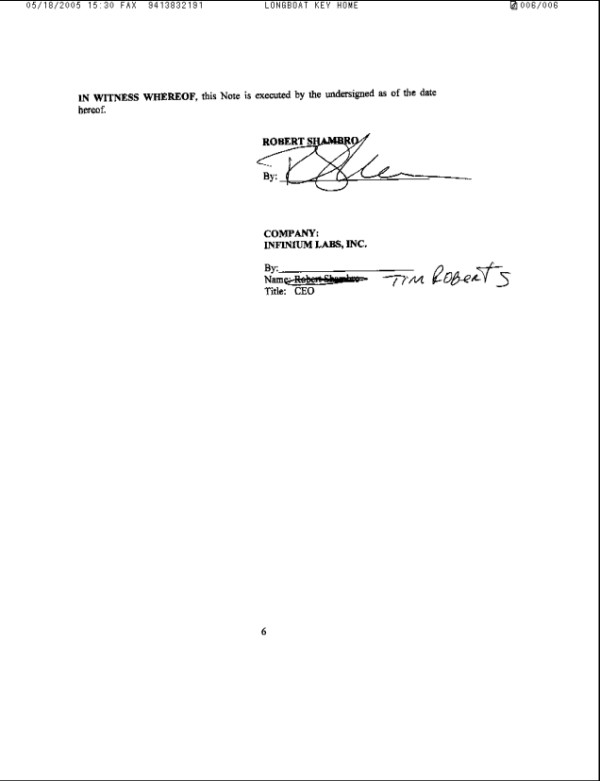
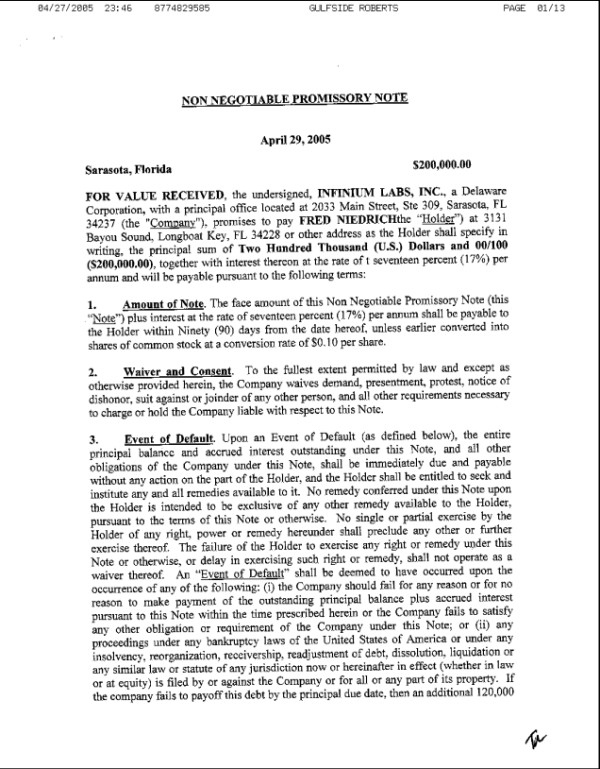
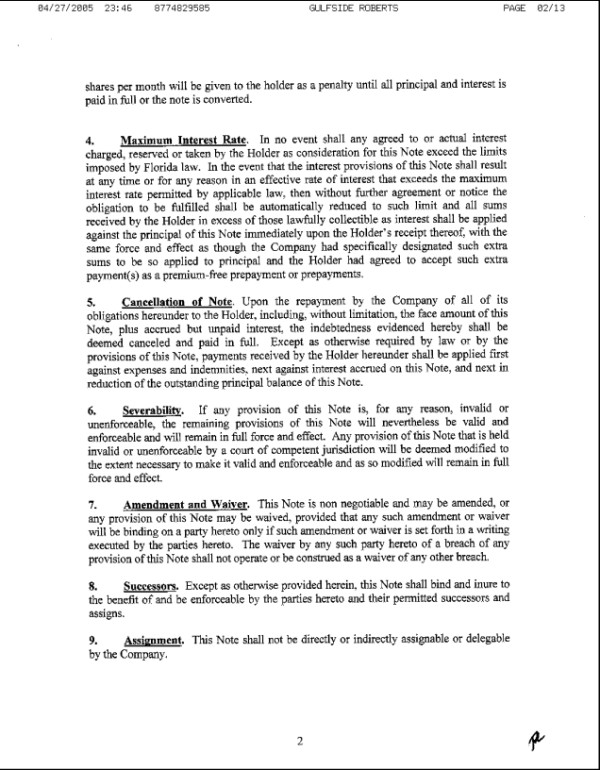
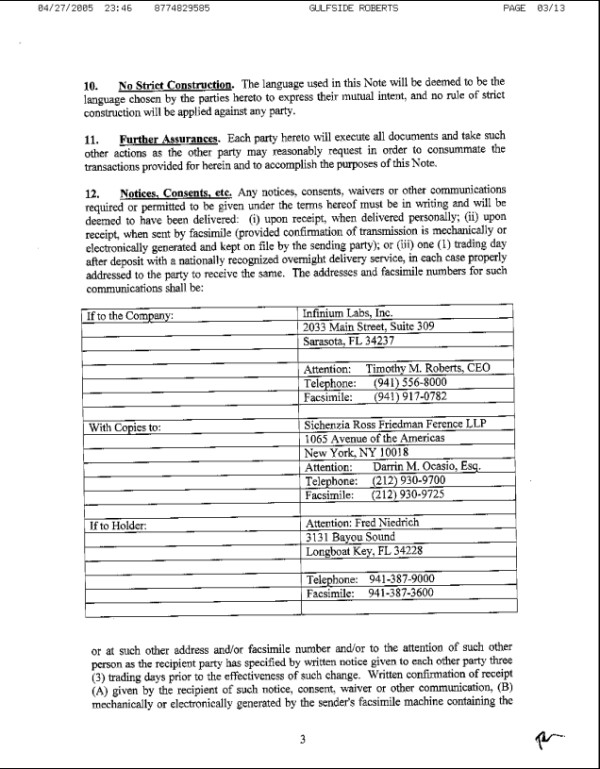
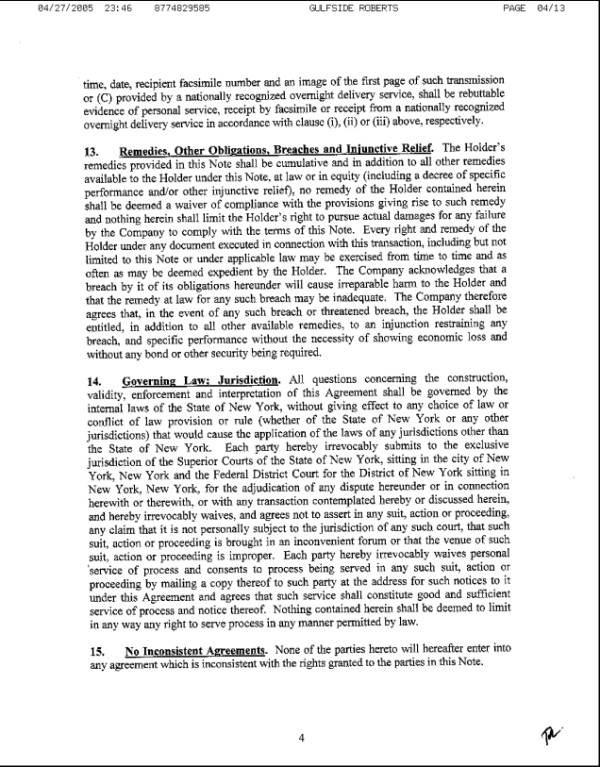
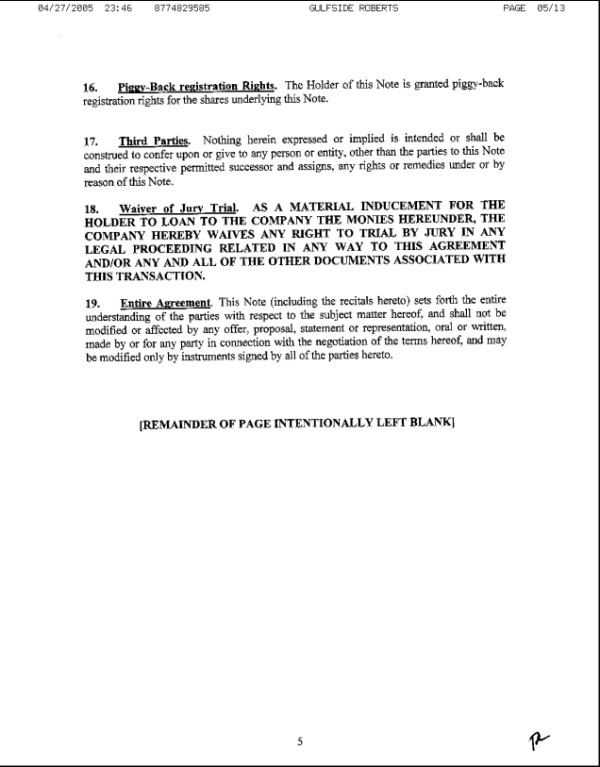
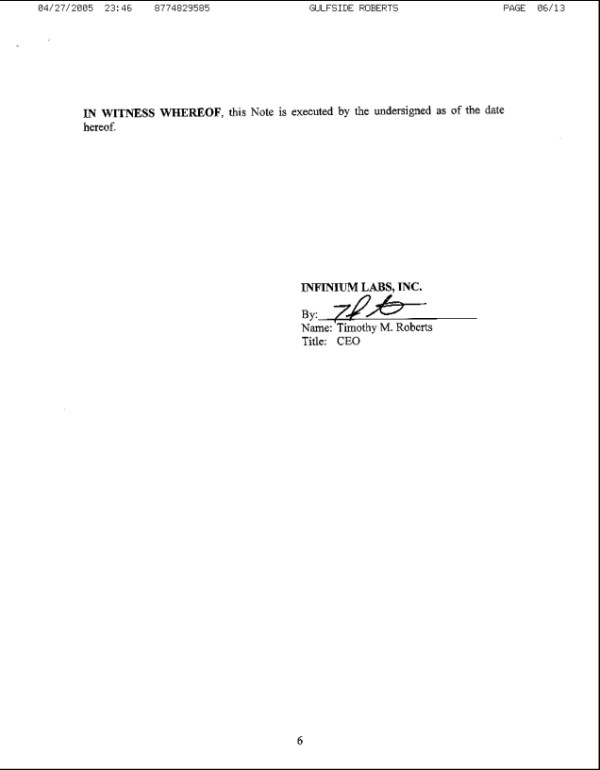
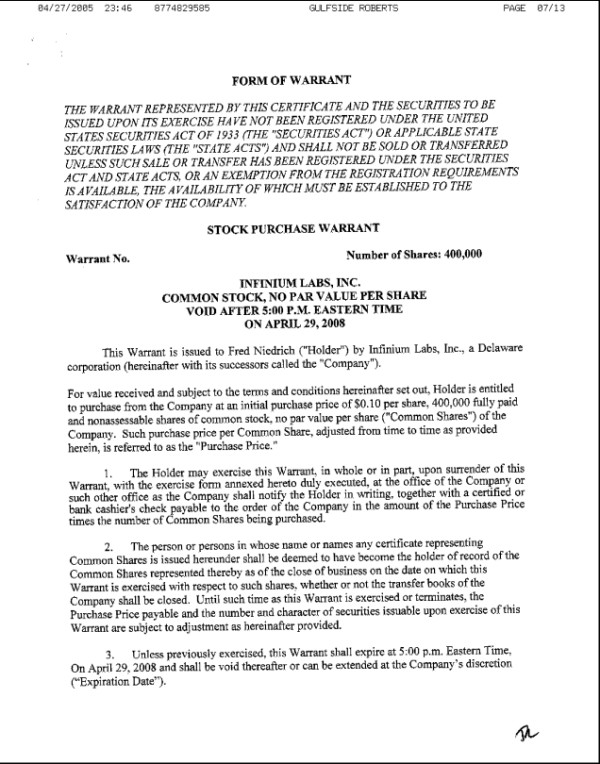
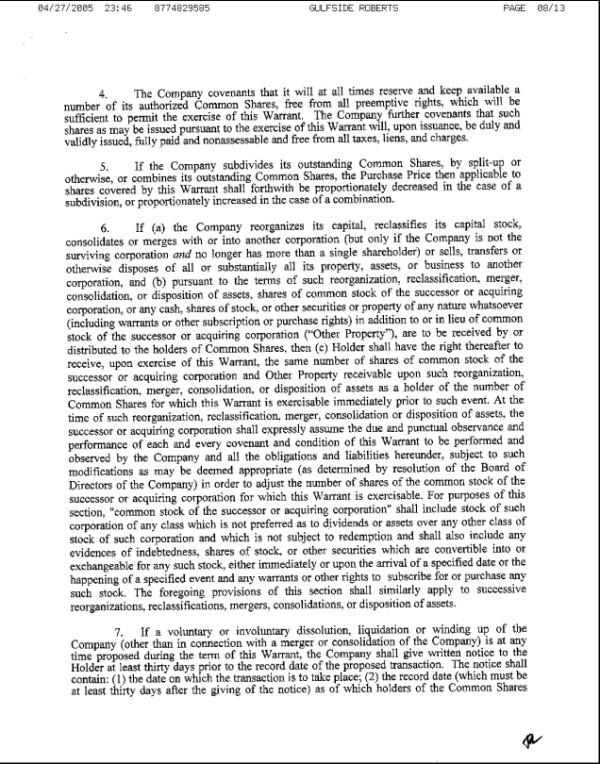
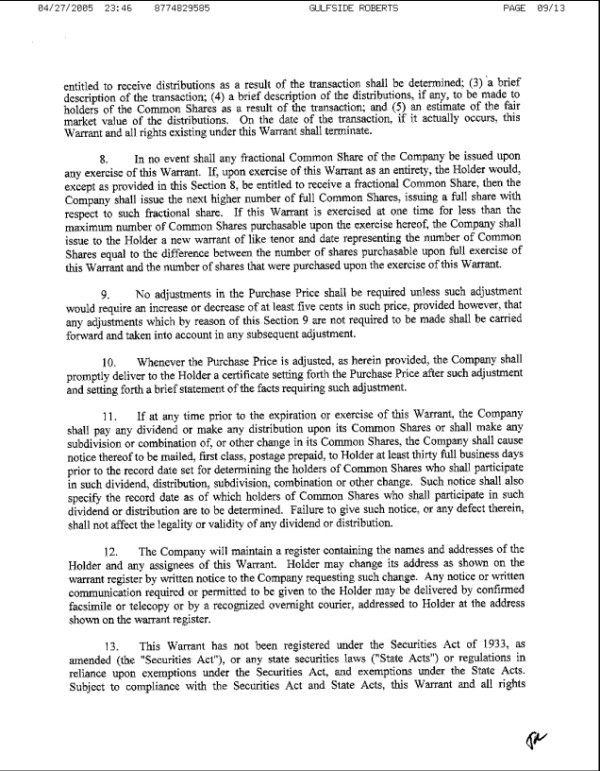
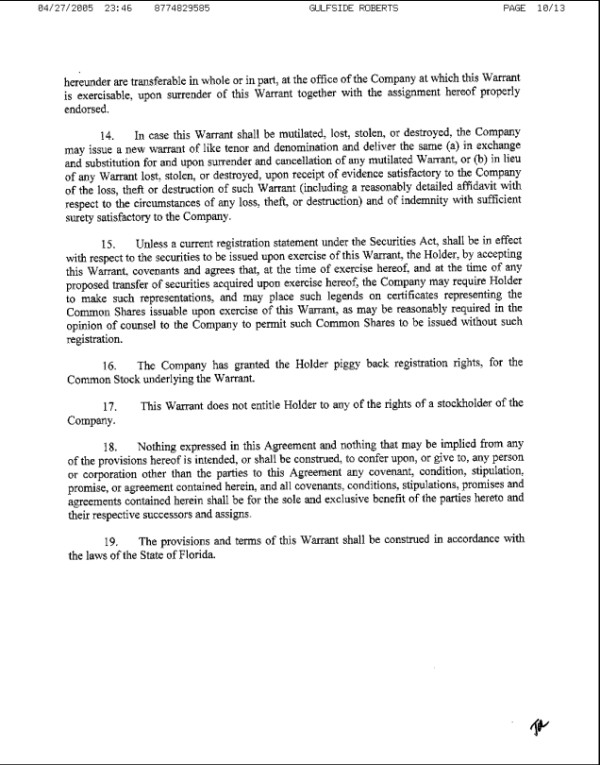
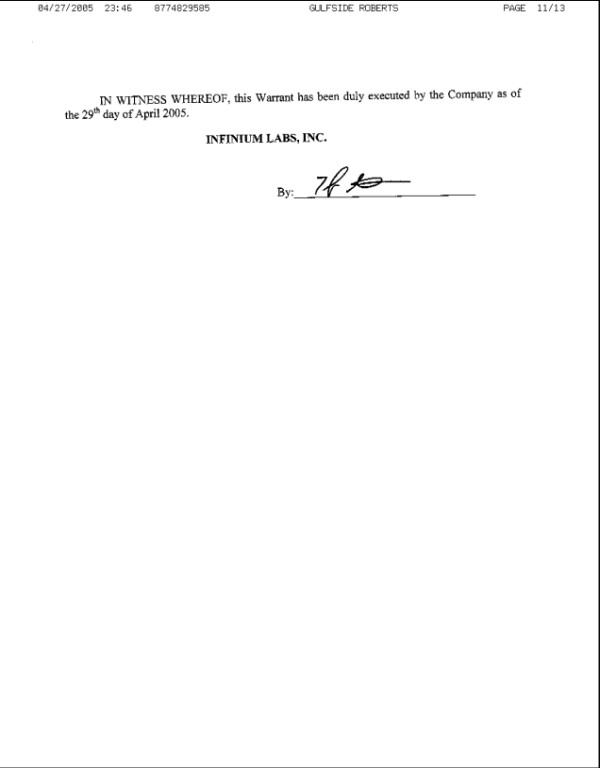
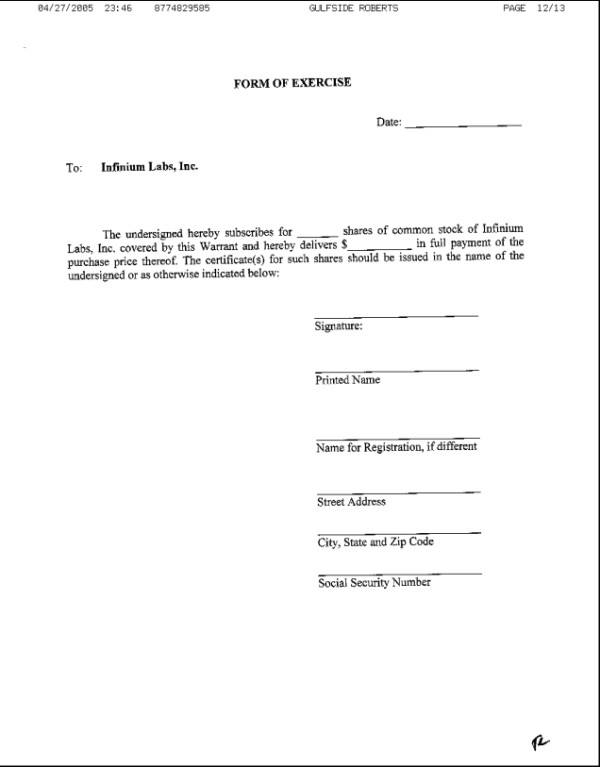
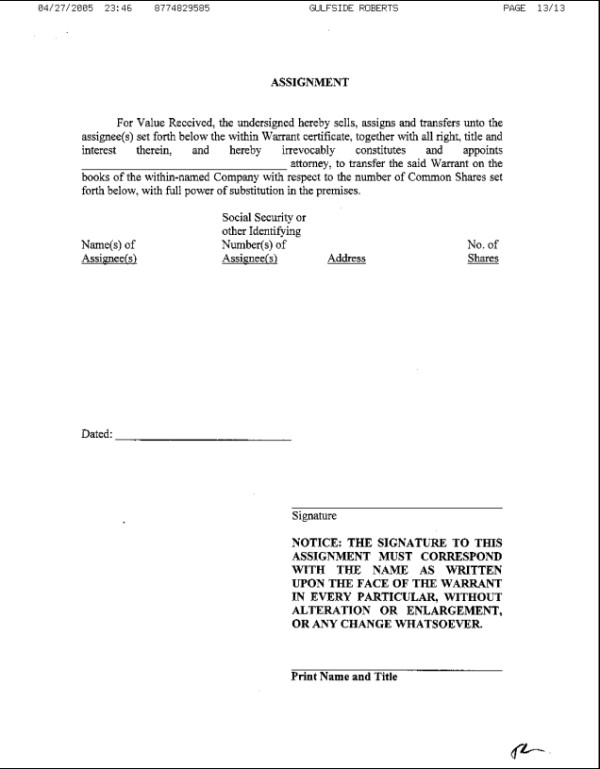
Exhibit
31
CERTIFICATE
OF CHIEF EXECUTIVE OFFICER
I,
Timothy M. Roberts, Chairman, Chief Executive Officer and Acting Chief Financial
Officer of Infinium Labs, Inc. (the “small business issuer”), certify that:
1. I have
reviewed this quarterly report on Form 10-QSB, for the quarter ending March 31,
2005, of Infinium Labs, Inc.;
2. Based on
my knowledge, this quarterly report does not contain any untrue statement of a
material fact or omit to state a material fact necessary to make the statements
made, in light of the circumstances under which such statements were made, not
misleading with respect to the period covered by this quarterly
report;
3. Based on
my knowledge, the financial statements, and other financial information included
in this quarterly report, fairly present in all material respects the financial
condition, results of operations and cash flows of the small business issuer as
of and for the periods presented in this quarterly report;
4. The small
business issuer’s other certifying officer and I are responsible for
establishing and maintaining disclosure controls and procedures (as defined in
Exchange Act Rules 13a-15(e) and 15d-15(e)) for the small business issuer and
have:
| |
(a) |
designed
such disclosure controls and procedures, or caused such disclosure
controls and procedures to be designed under our supervision, to ensure
that material information relating to the small business issuer, including
its consolidated subsidiaries, is made known to us by others within those
entities, particularly during the period in which this quarterly report is
being prepared; |
| |
(b) |
evaluated
the effectiveness of the small business issuer’s disclosure controls and
procedures and presented in this quarterly report our conclusions about
the effectiveness of the disclosure controls and procedures, as of the end
of the period covered by this quarterly report based on such evaluation;
and |
| |
(c) |
disclosed
in this quarterly report any change in the small business issuer’s
internal control over financial reporting that occurred during the small
business issuer’s most recent fiscal quarter that has materially affected,
or is reasonably likely to materially affect, the small business issuer’s
internal control over financial reporting;
and |
5. The small
business issuer’s other certifying officer and I have disclosed, based on our
most recent evaluation of internal control over financial reporting, to the
small business issuer’s auditors and the audit committee of the small business
issuer’s board of directors (or persons performing the equivalent function):
| |
(a) |
all significant deficiencies and material weaknesses in
the design or operation of internal control over financial reporting which
are reasonably likely to adversely affect the small business issuer’s
ability to record, process, summarize and report financial information;
and |
| |
(b) |
any
fraud, whether or not material, that involves management or other
employees who have a significant role in the small business issuer’s
internal control over financial quarterly
reporting. |
/s/
Timothy M. Roberts
_______________________________
Timothy
M. Roberts
Chairman
and Chief Executive Officer and Acting Chief Financial Officer
May 23,
2005
Exhibit
32
THE
FOLLOWING CERTIFICATION ACCOMPANIES THE ISSUER’S QUARTERLY REPORT ON FORM 10-QSB
AND IS NOT FILED, AS PROVIDED IN ITEM 601(b)(32)(ii) OF REGULATION S-B
PROMULGATED BY THE SECURITIES AND EXCHANGE COMMISSION.
CERTIFICATION
PURSUANT TO 18 U.S.C SECTION 1350, AS ADOPTED PURSUANT TO SECTION 906 OF THE
SARBANES-OXLEY ACT OF 2002
In
connection with the quarterly report of Infinium Labs, Inc. (the “Company”) on
Form 10-QSB (the “Report”) for the quarter ended March 31, 2005 as filed with
the Securities and Exchange Commission on the date hereof, I, Timothy M.
Roberts, Chief Executive Officer and Acting Chief Financial Officer of the
Company, certify, pursuant to 18 U.S.C. Section 1350, as adopted pursuant to
Section 906 of the Sarbanes-Oxley Act of 2002, that, to the best of our
knowledge:
1. The
Report fully complies with the requirements of section 13(a) or 15(d) of the
Securities Exchange Act of 1934; and
2. The
information contained in the Report fairly presents, in all material respects,
the financial condition and results of operations of the Company.
/s/
Timothy M. Roberts
_________________________
Timothy
M. Roberts
Chief
Executive Officer and
Acting
Chief Financial Officer
May 23,
2005



























































































